Class & Student Profiles
First-Year Experience
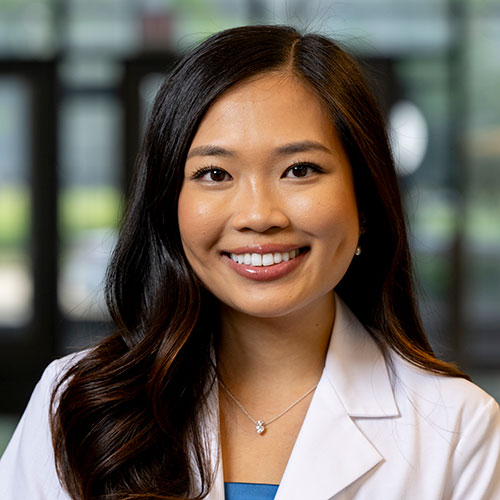

Megan Alejandrino (she/her)
First-Year Student, Class of 2027
BS Human Development
University of California - Davis
Surgical Clinical Research Coordinator, Medical Assistant (Rheumatology & Nephrology)
Home State: California
Why NUPA?
I actually accepted my seat at Northwestern before ever touring the campus, just based on how genuine the faculty and current students were. I could tell right away that the faculty really mean it when they talk about their open-door policy, and it’s 100% true. Anytime you’re struggling or just need support, they’re there. The PA students I talked to were super honest about what to expect and reassured me that finding balance is possible here.
Compared to your expectations coming in, what has surprised you since starting at Northwestern?
I was surprised by how student-driven the learning is in our PBL sessions. Twice a week, we put together Learning Inquiry presentations and teach them to our classmates to help us understand the week’s case better. The facilitators are there to guide us if we go too deep, but otherwise, PBL really puts us in the clinician’s seat. It’s helped me build confidence in clinical reasoning and decision-making early on.
What advice would you share with an applicant considering the Northwestern University PA Program?
Reach out to the current students and ask your honest questions. That helped me the most when I was deciding where to go. If you value collaborative learning, dedicated faculty, and a program that will challenge you to grow both clinically and personally, NUPA might be the right fit for you. All the current students I spoke with during interviews were open and honest, their transparency was a huge part of why I felt confident choosing Northwestern.
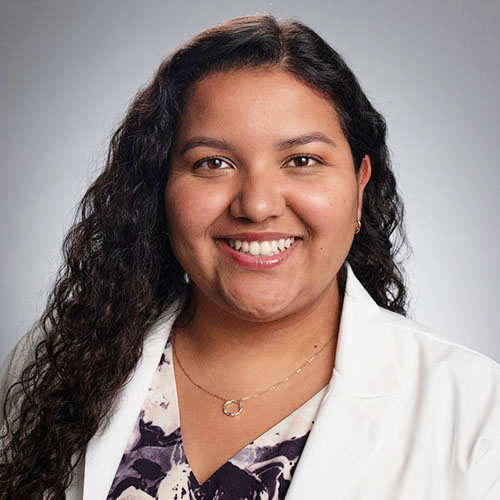

Lydia Argumedo (she/her)
First-Year Student, Class of 2027
BS Health Science
University of Florida
Medical Assistant (Surgery), CNA
Home State: Florida
Why NUPA?
There are so many reasons to pick NUPA! Northwestern’s PA program was my first choice because of the unique learning opportunities, early clinical exposure, and the program’s commitment to highlighting accessible and patient-centered care. I appreciate that the curriculum is built in an organ system approach, and that PBL highlights the clinician mindset as we take on new information each week. I was also attracted by the opportunities of ECMH to get into the clinical setting in our first year, and work alongside other students. Additionally, the Spanish course taken by all students shows NUPA’s commitment to making care more accessible and serving the community- I am excited to continue growing my skills while being in a program that encourages that for all students. I truly believe that the unique features of NUPA create learning opportunities that will best prepare me for clinical practice.
Tell us about your experience in PBL.
The PBL curriculum has given me the opportunity to learn through the application of material to patient cases in didactic year. Throughout the week, the case brings up many questions that our small group is able to work together to answer. Some team members may come with more background knowledge that we can use to further build upon, and we work closely with our faculty facilitator to augment our experience. Going through the process of taking a history to creating a plan (and everything in between), teaching my group members, and applying the information is more beneficial to me than reading the material alone. As the week goes on you can appreciate how much you have learned, and how much more there is to uncover. PBL allows you to take a leading role in your education while taking on the mindset of a clinician as you work through the case and make decisions on the next step.
What are your impressions of the curriculum so far? Favorite class?
Being able to have our curriculum follow a system-based approach has been extremely beneficial. It allows for connections between all of our classes as we learn about the different facets of each organ system- the anatomy, the diseases themselves, the approach to diagnosis, the physical exam, the medications, and so on. Putting it all together has made it a cohesive learning experience in my opinion. I would say my favorite class is clinical medicine. Along with the PBL curriculum, the guest lecturers that come in do a great job at putting all the information into perspective and highlighting what they find in their clinical practice. When we ask questions, we are met with answers from someone who can pull from their clinical experience- and that has been really exciting to learn from!
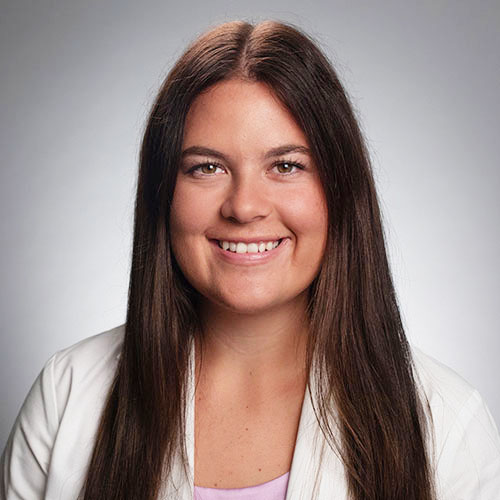

Tatum Boyd (she/her)
First-Year Student, Class of 2027
BS Human Biology
Stanford University (CA)
Medical Assistant (Orthopedics)
Home State: Texas
Why NUPA?
I chose the NUPA program for many reasons. Its strong reputation is rooted in a commitment to compassionate, patient-centered care and a collaborative approach to learning. The curriculum’s emphasis on problem-based learning has encouraged us to think critically and clinically from the very beginning, fostering meaningful collaboration with our peers as we work through complex cases. This integration of active learning within a challenging and versatile curriculum provides a comprehensive and well-rounded foundation, preparing us to become adaptable, thoughtful clinicians. Above all, what continues to truly distinguish between the NUPA program is the supportive culture cultivated by both the faculty and my classmates. This unique environment enhances every aspect of the learning experience and sets the program apart.
What are your impressions of the curriculum so far? Favorite class?
The curriculum structure offers a multifaceted approach to each unit and system, enabling us to tackle complex cases from multiple perspectives. Dissections and cadaver lab, combined with physiology, provide a hands-on, foundational understanding that we continue to build upon through clinical laboratory and medical coursework. Patient Assessment equips us with essential physical exam skills and system-specific techniques. Problem-Based Learning (PBL) then brings everything together, allowing us to apply our growing knowledge and skills to real-world clinical scenarios. So far, my favorite course has been Clinical Laboratory Medicine, where we integrate diagnostic tests, imaging, and laboratory findings to inform clinical decision-making and treatment planning.
What are your favorite things about Chicago?
Chicago is a city where there’s always something to do—whether it’s catching a Cubs game at Wrigley Field or spending the weekend at a local music festival, there’s energy in every corner! Each neighborhood has its own unique charm, making it fun to explore and experience something new. As a coffee enthusiast, one of my personal goals during the NUPA program is to find the best latte in the city. So far, Goddess and the Baker’s Bananas Foster latte is leading the pack! The food scene offers a diverse array, and the abundance of coffee shops is the best. My favorite place is definitely Lake Michigan, just steps away from Streeterville, where I enjoy going for runs or watching the sunset.
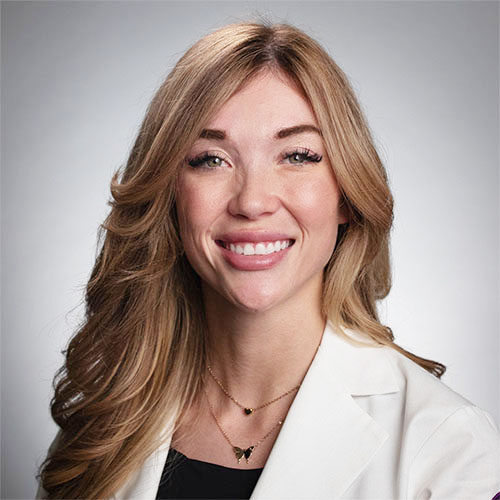

Paige Brodrick (she/her)
First-Year Student, Class of 2027
BA Neuroscience
Scripps College (CA)
Medical Assistant (Plastic Surgery, OB/GYN)
Home State: California
Why NUPA?
From my very first interaction during the interview process, I could tell how genuine and supportive the faculty and staff were. The welcoming environment really stuck with me and made me confident that I’d be surrounded by people who truly want their students to succeed. Since joining the program, that’s proven true! I’m so fortunate to learn alongside incredible classmates and mentors who push me to learn, grow, and succeed. It’s a community I’m grateful to be part of every single day.
Tell us about your experience in PBL.
PBL has been one of the most rewarding parts of NUPA for me. I love getting to sit down with my group and work through real patient cases. It’s such a good feeling when pieces start to click, especially when we get there by applying what we’ve learned in class. It makes the material feel more real, and it’s exciting to see how this kind of teamwork will translate into caring for our patients one day.
How has your experience been relocating to Chicago?
It's been such a fun adventure! Moving from California, I definitely had to adjust to the weather (seasons–who knew?), but Chicago’s energy won me over right away. I love how walkable it is and how easy it is to spend a day wandering, trying new restaurants, and finding hidden gems. The city feels big and always has something happening but it’s still welcoming enough to already feel like home.
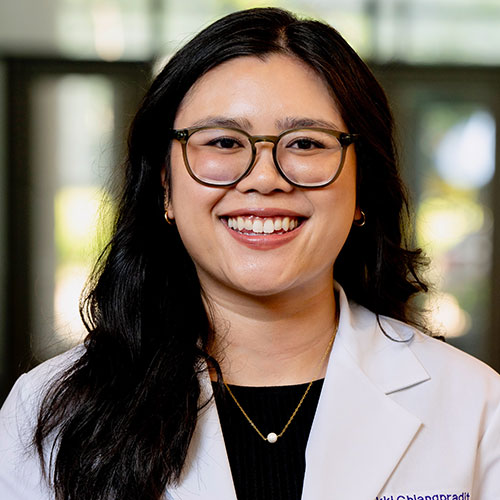

Nikki Chiangpradit (she/her)
First-Year Student, Class of 2027
BS Biology
Seattle Pacific University
Patient Care Technician
Home State: Washington
Why NUPA?
I chose NUPA for its curriculum, rotations, location, and faculty. The Problem-Based Learning (PBL) component of the curriculum was a major draw—it’s such a unique and engaging way to learn medicine through real patient cases. I also appreciate that, even in our first year, we’re already stepping into clinical settings through ECMH, applying what we’ve learned in the classroom directly with patients.
Looking ahead, I’m excited about the clinical year. Our rotations within the Northwestern Medicine system are highly reputable, and I’m confident I’ll receive excellent training and mentorship from experienced preceptors.
The program’s location in the heart of Chicago is another huge benefit. Having always lived on the West Coast, I’ve never experienced the Midwest before, and while it’s different, the vibrant city life feels familiar and energizing. I love exploring the city—walking along the lakeshore, attending concerts at Millennium Park, and browsing the farmer’s markets in Lincoln Park.
Finally, the faculty and staff were a major reason I chose NUPA. They go above and beyond to get to know each student, making sure we feel supported, valued, and truly heard throughout the program.
What are your impressions of the curriculum so far? Favorite class?
My impression of the curriculum so far is that the phrase “drinking from a fire hydrant” couldn’t be more accurate—we’re absorbing an incredible amount of information in a short period. Despite the intensity, I’m amazed by how much I’m learning about medicine and the complexity of the human body. I appreciate that our courses not only focus on the science behind medicine but also emphasize the social and behavioral factors that shape patient care.
NUPA is truly teaching us to be holistic PAs who address not only medical conditions but also patients’ emotional well-being, taking their circumstances into account to create realistic, effective care plans. If I had to choose a favorite class, it would be Patient Assessment. I enjoy practicing hands-on clinical skills like taking patient histories, auscultating the lungs and heart, and using an otoscope. It’s rewarding to connect what we learn in the classroom to how diseases present in real clinical settings.
Tell us about your experience in PBL.
I genuinely enjoy Problem-Based Learning (PBL)! It’s such a unique learning style that allows me to collaborate closely with a small group of classmates to work through patient cases. It’s incredibly rewarding when, by the end of the week, we’re able to reach a diagnosis and treatment plan. Along the way, we expand our knowledge of numerous conditions as we develop differential diagnoses, determine which labs and tests are necessary, and learn how to interpret those results.
I also appreciate the opportunity to share and learn from each other’s prior healthcare experiences and perspectives on patient care. PBL encourages us to approach each case as if we were in a real clinical setting—carefully considering which tests or procedures are truly warranted while keeping the patient’s comfort and overall well-being in mind.
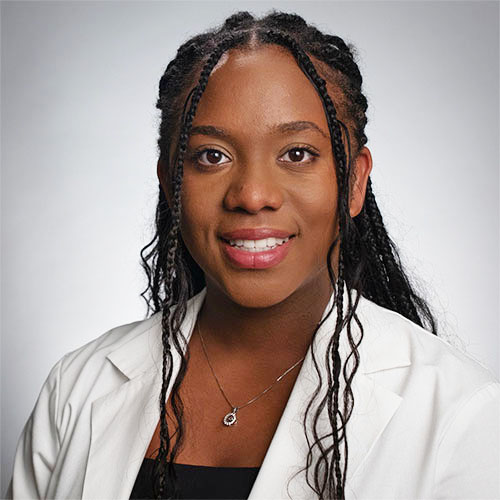

Avonae Gentles (she/her)
First-Year Student, Class of 2027
MS Women and Children's Health, BS Health Science
University of British Columbia (MS), University of Waterloo (BS)
Research Assistant, Medical Assistant (Rheumatology)
Home State: Ontario, Canada
Why NUPA?
I chose Northwestern’s PA Program because it felt like the perfect fit, not just academically, but culturally. From the moment I connected with current students and faculty, I sensed a community that genuinely cares about each other’s success. The program’s strong clinical focus and emphasis on real patient care through Education Centered Medical Home (ECMH), really appealed to me. I wanted a place where I could be challenged but also supported, and NUPA was exactly that.
What are your impressions of the curriculum so far? Favorite class?
The curriculum is definitely intense, but it’s exactly what I hoped for. I love how it pushes me to think critically rather than just memorize facts. Problem-based learning (PBL) has been a challenge, but I can’t imagine a better way to get into the mindset of a healthcare provider. We discuss real cases with classmates and learn from each other’s perspectives. However, my favorite class so far has been Clinical Medicine because it feels the most relevant and exciting. It’s where all the pieces start to come together.
Compared to your expectations coming in, what has surprised you since starting at Northwestern?
Honestly, what has surprised me most is how much emphasis there is on independent learning and problem-solving. The program really pushes you to take ownership of your education, think critically, and approach clinical problems like a provider would. That said, I also didn’t expect how tight-knit and supportive the class community would be. Instead of competition, there’s genuine teamwork and friendships. The faculty are approachable and truly invested in our well-being, not just our grades. It’s been really reassuring to know I’m not just another student, I’m part of a community.
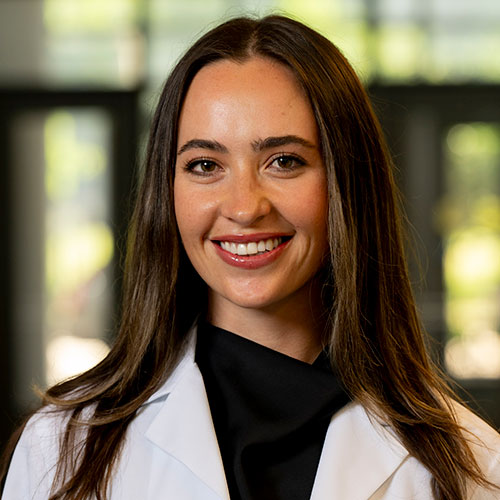

Haley Greer (she/her)
First-Year Student, Class of 2027
BA International Relations
Gonzaga University (WA)
U.S. Army Medical Officer
Home State: Washington DC
Why NUPA?
When I was deciding which PA program to attend, Northwestern stood out. This is not only because of its academic rigor and clinical partnerships, but because of the program's commitment to training socially accountable providers who understand the bigger picture of healthcare access and equity. The problem-based learning model here mirrors the collaborative decision-making I was used to in my previous career in the military and it's one I hope to model as a future PA! I knew I needed a program that would challenge me intellectually, support me personally, and prepare me to serve patients from all backgrounds. From the application process, admissions process, and finally the acceptance process, I became convinced that NUPA is that place.
What is an average day like for you?
I enjoy waking up early and attending a workout class like Solidcore or going for a long bike ride along the lake. When I get home, I make breakfast and coffee and get ready for the day. I walk to school every morning with two of my classmates who live close to me. It's a nice time for us to chat about the day before and what we're expecting out of the upcoming day. We have class all morning (three days a week it's PBL!) and then I either head home for lunch or eat with friends in the student lounge or outside if it's nice. Then it's back to class until late afternoon. After school is done for the day, I either go to the library or coffee shop for a couple hours to work on school, or I head home! If I haven't worked out in the morning I will in the evening. Then I make dinner and watch some tv while I eat. When I'm done with dinner I'll study a bit more before I head to bed and do it all over again the next day.
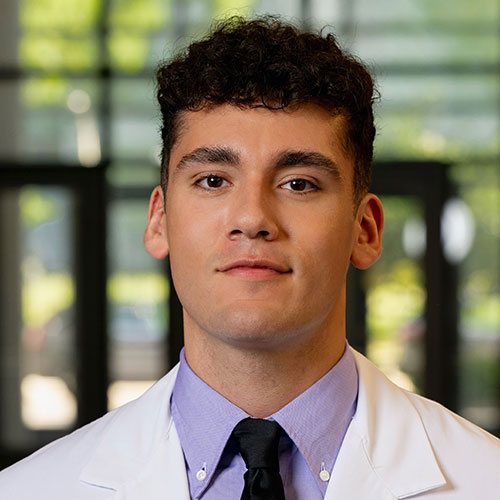

Diego Guzman (he/him)
First-Year Student, Class of 2027
BS Biology, BS Psychology
University of Illinois at Chicago
Emergency Department Aide, EMT-B
Home State: Illinois
Why NUPA?
I chose NUPA for so many reasons, but mostly because it just felt like the right fit. Being from the suburbs of Chicago and living in the city for over six years, I’ve built a strong support system here. Through my patient care experiences in Chicago, I realized that this diverse patient population is exactly the community I hope to serve as a practicing PA-C. The Northwestern PA program aligns closely with my own mission, values, and goals as a future provider. Program features like the Education Centered Medical Home (ECMH), where PA students collaborate with second-year PA students, medical students, and other healthcare professionals similarly to how we will post-graduation really intrigued me. Problem-Based Learning (PBL) resonated with me because I have practiced this learning style before and found it highly beneficial for understanding complex concepts. Ultimately, what really solidified my decision to attend Northwestern was the welcoming, supportive and passionate admissions team, faculty, alumni and current students. Their engagement during the interview process and other interactions made me feel both comfortable and seen as a person rather than an applicant.
What advice would you share with an applicant considering the Northwestern University PA Program?
If you are applying to the Northwestern University PA Program (NUPA), take the time to really ask yourself why. What draws you to this program? Which of its missions or values resonate with you the most? What past experiences have shaped your decision to become a PA, and how do you think NUPA will supplement that passion or reasoning? If you do not know the answers yet, research them! The NUPA website and social media provide an incredible amount of information for prospective students, and they’re well worth exploring. If you’re fortunate enough to be deciding between programs, I highly recommend reaching out to current students, alumni, or faculty. Hearing about their experiences firsthand can give you a clearer picture of what makes NUPA so special!
What is an average day like for you?
My typical day starts at 6:30am when I wake up and get ready for class. I live a little farther from campus, ~20-30-minute bus ride away so I get to utilize my UPASS [discounted public transit pass] for the commute. I typically arrive at school around 7:30am to review any important topics, maybe grab an iced dirty chai tea and set myself up for the day! In-person class roughly goes from 8am to 5pm, though the start and end times may vary. Our schedule includes a variety of sessions, such as Problem-Based Learning (PBL), pharmacology, clinical laboratory medicine, anatomy and physiology, and behavioral and preventive medicine. We also often have guest lectures from experts in their respective fields, which provide valuable insights into the topics we’re covering. At noon, I head to the student lounge for lunch in the Simpson Querrey Building, where I catch up with classmates or work on learning issues. After class, I typically study or work on assignments in the library with friends for an hour or two. Around 7:30pm I head to the gym for an hour to work out and decompress a bit. I find it to be a great stress reliever and a way to create balance outside of academics. Afterward, I head home, make dinner, review material if needed, and wind down for bed around 10–11 p.m., depending on the day!
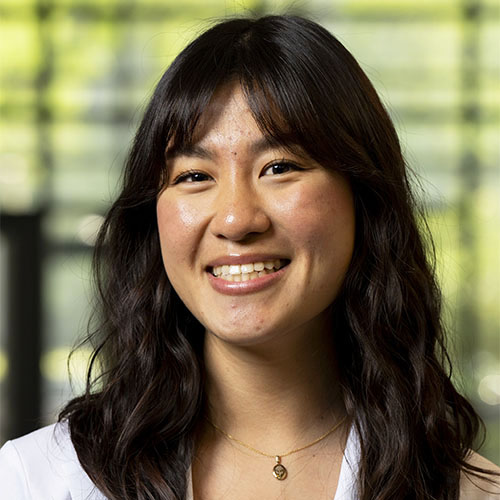

Michelle He (she/her)
First-Year Student, Class of 2027
BS Molecular Biology
University of California - San Diego
Senior Fertility Care Coordinator, Medical Assistant (Internal Medicine)
Home State: California
Why NUPA?
I chose NUPA for so many reasons! For starters, I have to say that we really are a family here. Everyone in the NUPA community is so supportive and genuinely cares for you, both as a student and as a human being. NUPA is a place that will make you feel chosen and quickly starts to feel like home. Beyond that, it was a priority for me to have robust clinical exposure and a broad range of rotation sites. In addition to the seven core rotations, we get to elect 4 elective rotations, which is double the amount at most other PA programs. In addition, there is a huge variety of sites we can rotate through! The ECMH curriculum was also a huge draw for me, since it allows us to start getting clinical exposure during our didactic year, which is super unique. As someone who thrives in hands-on learning environments, the PBL modality also really made Northwestern stand out.
Tell us about your experience in PBL.
PBL is awesome! It is easily my favorite class in our challenging course load. Our curriculum is organ system-based and we get four cases that are relevant to each unit. At the beginning of the week, we are presented with our patient and their chief complaint. We then spend time as a group brainstorming our differential diagnoses and obtaining a thorough patient history, review of systems, and physical exam. Every Monday and Wednesday, we identify learning issues, which are concepts that we need to know more about in order to properly examine, assess, and treat our patient for the following session. When we meet next, we present our learning issues and use that knowledge to drive our following workup. By the end of the week, we put it all together in our assessment and plan. PBL is super interactive and explorative. Everyone has something different to offer to our group’s approach, so we end up learning from each other quite a bit! It is also a lot of fun, and our facilitators help a lot in guiding our thought process, although the sessions themselves are all self-directed by the group. We don’t know the final diagnosis until Friday, so getting to work it out in real-time helps us to understand the approach, which is just as important as understanding the disease and treatment itself.
What are your favorite things about Chicago?
There are so many wonderful things about living in Chicago! As a San Diego native, it’s been so nice to be close to the beach again, especially on a hot summer day! Some of my favorite things to do are walking along Lake Michigan to unwind after a long day of classes, going to the Lincoln Park farmer’s market, thrifting/antiquing in Wicker Park, and relaxing on the Riverwalk. There’s also an incredible food scene and with public transportation, it’s so easy and fun to explore the different neighborhoods here! It really is a city with something for everyone, especially in the summertime!
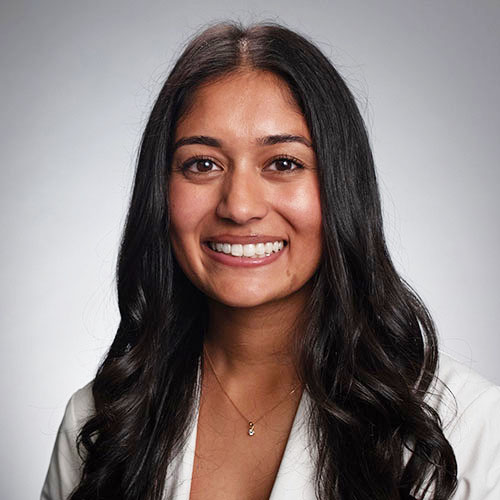

Antara Kulkarni (she/her)
First-Year Student, Class of 2027
BS Emergency Medicine
University of Pittsburgh
Paramedic, Patient Care Technician
Home State: Pennsylvania
Why NUPA?
There are so many reasons I chose NUPA. Through admissions sessions and the interview process, I could see how genuinely proud and connected everyone was to the community. The environment felt welcoming, energetic, and inspiring. I was especially drawn to the PBL curriculum, where I can actively apply clinical knowledge in real time. I also appreciate how Northwestern meaningfully integrates its mission into the curriculum and values student input. Most exciting of all is learning alongside a cohort of students from diverse backgrounds, each bringing unique patient care experiences that make PBL discussions exciting and collaborative.
Tell us about your experience in PBL.
PBL is easily the highlight of my week. Being a part of a small cohort of students, who start off unsure and unfamiliar, and growing into a tight-knit team that applies real patient experiences to solve complex cases is incredibly rewarding. My PBL members quickly became some of my best friends, creating a supportive and collaborative environment. Each week, we present learning issues, and it is amazing to see how we rely on one another’s research to move the case forward and eventually reach the correct assessment, diagnosis, and treatment plan. That collaborative “aha” moment is one of the most satisfying parts of the program. The active, team-based nature of PBL makes learning more engaging and meaningful, and it is where I truly feel like I am growing into a capable and thoughtful clinician.
How would you describe the class culture at Northwestern?
One of the best parts of the Northwestern PA program is the strong sense of community within the class. From day one, I’ve been surrounded by peers who are collaborative, supportive, and genuinely invested in each other’s success. Whether it’s sharing study resources or helping each other through tough concepts, everyone is eager to contribute. Outside of class, we often spend time together relaxing on the beach, trying new restaurants, and exploring different neighborhoods. I moved to Chicago not knowing anyone, and now I find myself studying, learning, and building lifelong friendships with my classmates. The class culture is so uplifting and I genuinely look forward to PBL, lectures, and labs because I get to learn alongside my friends.
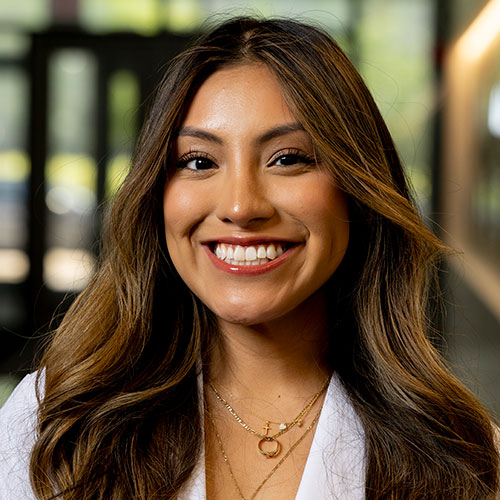

Jennifer Lala (she/her)
First-Year Student, Class of 2027
BS Public Health
University of Nevada Reno
Phlebotomist, Medical Assistant (Orthopedics)
Home State: Nevada
Why NUPA?
I chose NUPA for its connection to a large academic medical center, Education Centered Medical Home (ECMH) program, and extremely communicative staff/faculty. During my interview I was extremely impressed by how welcoming and communicative the staff was before, during, and after my interview. I also got a glimpse of what problem based learning (PBL) was like and it intrigued me because I hadn't seen a program with a similar learning style. I knew being connected to Northwestern’s health system would positively impact my learning and expand my clinical year opportunities.We have many guest lecturers from a variety of different fields so we get to learn through many different perspectives. Everyone is truly passionate about their field and it allows for much more engaging lectures. Having a program like ECMH allows us to practice our interprofessional skills early on before we even get to clinicals. I think getting this practice during our didactic year helps us build upon our skills as the year goes on.
What are your impressions of the curriculum so far? Favorite class?
So far I am happy with the way our system is designed. Having our curriculum be organ systems based allows for each class to build upon each other vs feeling like I'm learning different topics in each course. It allows for further integration of the material and feels much more cohesive. I can't imagine wanting it to be any different. Currently my favorite class is patient assessment because I enjoy being hands-on and learning new skills alongside my classmates. I enjoy applying the material we have learned in class and try to put it into practice. The smaller class size also fosters a more supportive learning environment, where it’s easier to ask questions and get the help you need.
How has your experience been relocating to Chicago?
The idea of moving across the country was for sure daunting at first! I lived in Nevada basically my whole life and Chicago seemed like a very drastic change for me. So far I am beyond happy with my decision and am loving Chicago. There is always something going on in the city, great coffee shops/ restaurants, and quick access to transportation.I think it's amazing to have so much variability in a city because it offers a great way to unwind by exploring new places and experiences. I was also worried about moving to a completely new city and not knowing anyone but there will be plenty of people in the program doing the same thing as you! You'll have your classmates to share this journey with every step of the way.
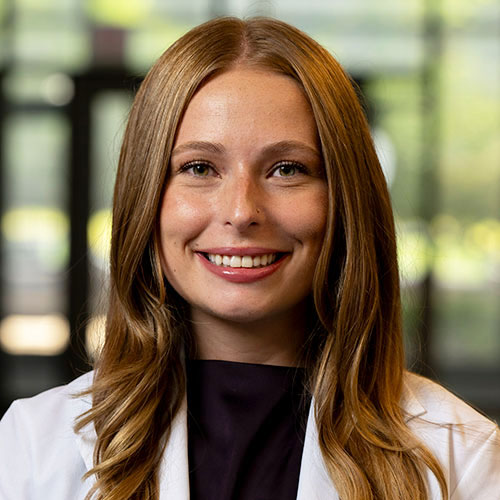

Sarah Mills (she/her)
First-Year Student, Class of 2027
BS Public Health
University of Michigan – Ann Arbor
Medical Assistant (Oncology, Urgent Care)
Home State: Michigan
Why NUPA?
Northwestern was my first-choice school from the moment I decided to become a PA, for many reasons! Being from a rural town in northern Michigan, I was excited about the opportunity to gain clinical experience in a big city. I knew that living and learning in Chicago would open the door to so many new opportunities—both personally and professionally. A major factor for me was Northwestern’s commitment to community health, something I care deeply about. Through the ECMH, I’ll get to work in a FQHC during the first year and gain hands-on experience delivering patient-centered care to underserved populations—exactly the kind of work I hope to do as a future PA.
What advice would you share with an applicant considering the Northwestern University PA Program?
My biggest piece of advice for anyone considering the Northwestern University PA Program is to give yourself grace during the application process. The process of applying to PA school can feel overwhelming and even discouraging at times—but I’ve learned that everything truly happens for a reason. What makes Northwestern so special isn’t just the name—it’s the people. The faculty is incredibly supportive, the education is rigorous and thoughtful, and the environment challenges you while still making you feel like you belong. Northwestern fosters an environment that supports both personal growth and academic excellence, so know that if this is where you land, it will be exactly where you’re meant to be.
How has your experience been relocating to Chicago?
Moving to Chicago has been so amazing! The city’s energy is contagious—from the skyline views to the endless neighborhoods to explore, there’s always something happening. I love discovering new coffee shops to study at, taking walks along the lake and river, frequenting the farmer’s markets, and spending time at the dog park next to my apartment. One of my favorite things so far has been catching sunsets on the city skyline from my apartment windows after a long day—it’s always my little reminder of how amazing this city truly is. Even in the middle of rigorous studying, I find myself feeling grateful to be in a place that constantly inspires me.
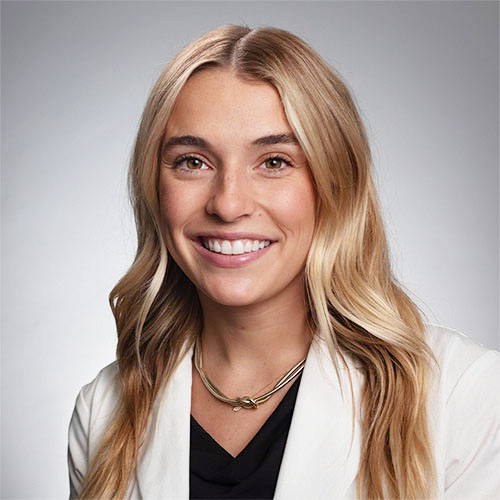

Anna Mohling (she/her)
First-Year Student, Class of 2027
BA Human Biology and Society
University of California - Los Angeles
Medical Assistant (Pediatrics, Dermatology)
Home State: Minnesota
Why NUPA?
From the start, Northwestern felt like everything I wanted in a PA program — and more. I knew I was looking for a system-based curriculum and a cadaver lab, but I was thrilled to discover additional opportunities like medical Spanish, hands-on experience through the Education-Centered Medical Home, and a strong PBL approach. Growing up in Minnesota and studying at UCLA, I was excited to blend my Midwest roots with the energy and diversity of Chicago. My interview day sealed it — the faculty’s warmth and authenticity made me feel right at home, and I knew NUPA was where I belonged.
How would you describe the class culture/vibe at Northwestern?
The class culture at NUPA is uplifting, lively, and incredibly supportive. Coming from a large university, I wasn’t sure how I’d feel in a cohort of just 42 students—though I’m biased, I truly believe 42 is the perfect size. We work as a team, sharing resources, tutoring one another, and celebrating strengths while helping with weaknesses. The camaraderie is strong, and everyone genuinely wants to see each other succeed. I’m amazed at how close we’ve become in such a short time. I love chatting with different classmates and feel grateful to be part of a cohort full of unique, kind, and interesting personalities!
What advice would you share with an applicant considering the Northwestern University PA Program?
My biggest advice for applicants is to really get to know the program and figure out your own “non-negotiables” — the qualities you want most in a PA program. Attending Northwestern’s information sessions gave me a great sense of the culture through honest conversations with faculty and students. I know PA admissions can feel competitive and stressful, but your application doesn’t have to be “perfect.” After getting to know my classmates and faculty, it’s clear to me that Northwestern values the unique qualities each applicant brings. So, while easier said than done, be your authentic self, try to relax, and have fun in your interviews!
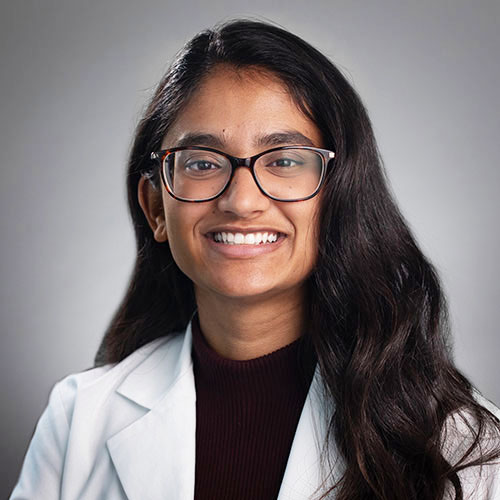

Kajal Ondich (she/her)
First-Year Student, Class of 2027
BA Biology
University of Minnesota - Twin Cities
Emergency Room Technician, EMT
Home State: Minnesota
Why NUPA?
There are so many reasons why NUPA was my top choice. I loved the idea of PBL and the ability to practice clinical reasoning before rotations. It is a low stakes way to practice what we are learning in the classroom. In addition to this, NUPA offers clinical experience during didactic year through ECMH which is a great way to build confidence in a new role of patient care. I chose NUPA because I wanted a program that would make me the most confident and prepared clinician before entering the workforce.
Impression of curriculum/ favorite class?
In general, the faculty are amazing and you can tell they have a passion for teaching and care about students learning. My favorite class is definitely anatomy lab! I am so appreciative that we get to have this course throughout the entire didactic year, and it coincides with the organ system we are learning in the unit. It makes learning and connecting concepts that much easier.
What is an average day like for you?
I start my day at 6am with breakfast and then begin my journey to campus. Taking the L plus the bus everyday has definitely made me more comfortable with Chicago transit. I like to be in class early so I can prepare for the lectures that day or chat with my classmates. During lunch I try and get a break from the classroom and sit outside with friends. Once the school day is over, I get home and always give myself some time to unwind by having dinner and watching a show. After that I study for a couple of hours before heading to bed around 10pm.
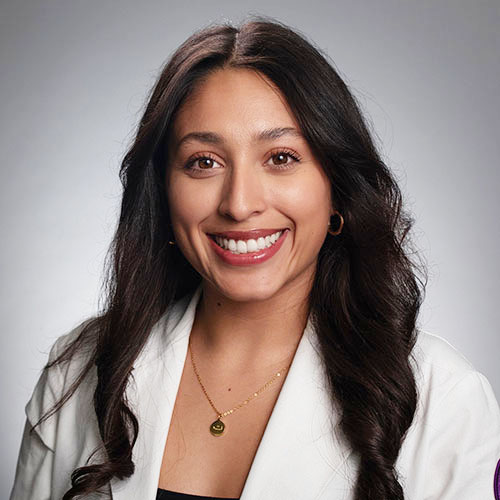

Tatianna Quezada (she/her)
First-Year Student, Class of 2027
BA Neuroscience
University of San Diego
Advanced Clinical Associate (Urgent Care), Medical Scribe
Home State: California
Why NUPA?
I chose NUPA because of its innovative curriculum, particularly the Problem-Based Learning (PBL) model, which aligns with how I learn best. I was drawn to the program's strong faculty support, and the opportunity to train at a world-class academic medical center. The seamless integration between didactic learning and clinical rotations in such a top-tier hospital environment made NUPA the ideal place for me to grow into a competent and compassionate PA.
Tell us about your experience with PBL.
I love PBL because it challenges me to think clinically and apply knowledge to real-life scenarios. Each week, I feel my clinical reasoning and confidence grow as facilitators push us to analyze, question, and be comfortable with not knowing. PBL has created a safe learning environment where making mistakes leads to meaningful learning, and the collaborative atmosphere fosters teamwork and critical thinking that I know will benefit me in my future practice.
How has your experience been relocating to Chicago?
I am originally from San Francisco, CA and this is the farthest I have ever moved away from home. However, I have absolutely no regrets. To me, Chicago is a bigger San Francisco, meaning an even bigger melting pot of culture and diversity. Each neighborhood has its own unique culture, food, and character, so you always have something to do (or eat!). I couldn’t imagine a better city to learn medicine while being immersed in a diverse patient population and cultural environment.
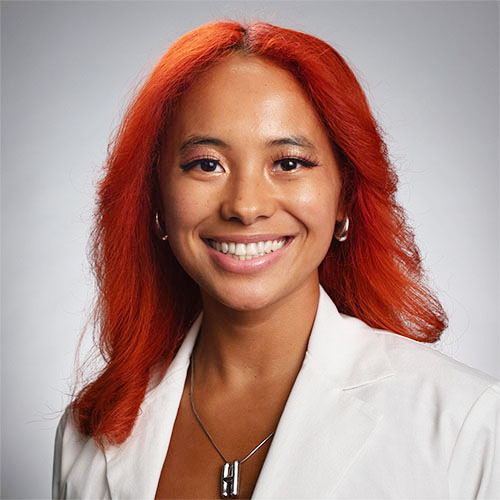

Hikari Sanchez (she/her)
First-Year Student, Class of 2027
BS Immunology/Microbiology
University of Miami
Medical Assistant (Physical Medicine and Rehab), Medical Scribe
Home State: Florida
Why NUPA?
NUPA is a one-of-a-kind program, which is why I chose it. I love the hybrid curriculum with problem-based learning–I enjoy getting new cases each week and working through them systematically with my classmates to reach a diagnosis. The ECMH program, which provides early clinical exposure, was also important to me. Since PA school is fast-paced, gaining experience early on is invaluable, and combining that with PBL helps me develop the critical thinking skills I’ll need in the clinical setting. The international rotation elective excites me because it offers the opportunity to learn about healthcare systems abroad and witness how cultural beliefs can influence health practices and patient interactions. I have also learned so much from the cadaver lab and point of care ultrasound, where applying my knowledge right away makes it stick and helps me connect the dots to see the bigger picture. Choosing NUPA has truly been the best decision I have ever made.
What is your favorite thing about NUPA?
By far, my favorite thing about NUPA is the community! From my interview to now, I have felt so supported in my journey thus far. The faculty makes the effort to truly get to know us, and the feeling that they genuinely want us to learn and succeed has been so comforting. Our cohort has fostered such a collaborative environment, creating a brave and safe space for everyone to learn. In PA school, it is normal to feel a rollercoaster of emotions, but the NUPA family reminds me that I am never alone. From the very first day of orientation, we connected instantly, and I would not want to experience PA school with anybody else.
What advice would you share with an applicant considering the Northwestern University PA Program?
My advice would be to talk to current students and hear their experiences of what NUPA is like for them. Every program has its unique features, and NUPA is no exception. Ask yourself: Will NUPA fulfill what I need as a PA student and, most importantly, set me up for success as a well-rounded practicing PA? My answer was yes!
In general, for PA school advice, be kind and patient with yourself. PA school is rigorous, so it is normal to feel overwhelmed or not fully grasp a concept after lecture. What matters most is trying your best and taking it one day at a time. Also, to find a balance between school and life to prevent burnout, whether that’s working out in the gym or taking walks along the lake. Lastly, keep an open mind–you'll learn so much in a short time and be exposed to countless opportunities.
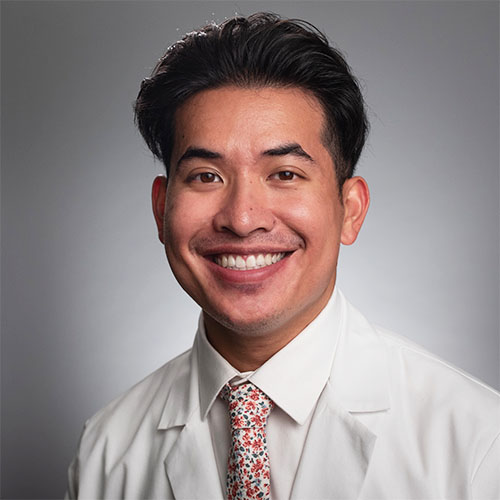

Nowie Se (he/him)
First-Year Student, Class of 2027
BS Physiology
University of Arizona
Advanced EMT, EMT-B
Home State: Nevada
Why NUPA?
Of course, Northwestern being a top of the line institution with a unique curriculum and incredible location was what initially attracted me to the program. But what made me truly fall in love was the faculty. Everyone was incredibly warm, friendly, and welcoming! They seemed so passionate about the program and it was evident that they truly invest time into ensuring their students feel supported and prepared to come out as exceptional PAs.
What is an average day like for you?
I naturally wake up at 6-7AM every morning depending on when class starts that day! I always start with a morning coffee and some breakfast. I’ll review some material or practice some flashcards before heading to class. I live right by campus so it’s only a less than 10 minute walk! Classes run 8-5 usually. My brain is usually exhausted by the time we get out, so while many people may go to the library after, I take some time to unwind - whether that’s a run on the Lake Shore, going to the gym with my friends, or even a nice power nap, I always give my brain some time to recharge. I usually lock back in around 7PM and tackle whatever tasks I have to do that day before calling it around 10:30. Sleep is important to me so I’ll make sure to get at least 7 hours!
How would you describe the class culture/vibe at Northwestern?
I feel so grateful to be a part of such a wonderful cohort. With it being so small, everyone knows each other well, and with how the curriculum often pairs us in small groups/partners, you’re set to have meaningful experiences with each and every member of the class. Everyone is so incredibly supportive - reminding each other of due dates, assignments, quizzes. Sharing useful resources to each other. Quizlet decks, Anki decks, study guides. I also love how many of us emphasize the importance of balance - whether that’s taking the time to try a new restaurant on the weekend or hanging out on Friday nights.
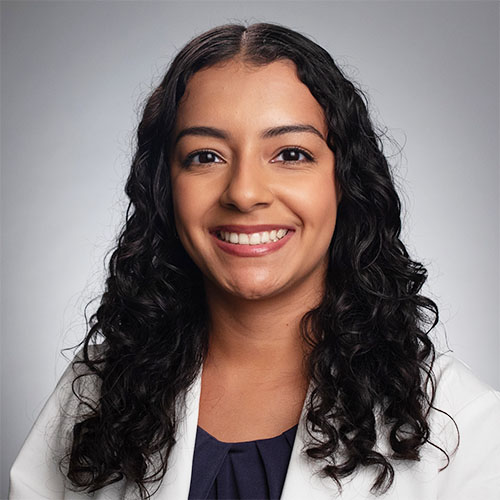

Liz Silva (she/her)
First-Year Student, Class of 2027
BA Anthropology
Washington University in Saint Louis
Physician Facilitator (Urgent Care)
Home State: Illinois
Why NUPA?
I chose NUPA because of how welcomed and comfortable the faculty made me feel during my interview day. I felt like they genuinely just wanted to get to know me and I immediately felt like NUPA is where I belonged. Since starting at NUPA, the faculty have exceeded my expectations; I feel so supported and I know they want me to succeed. I also chose NUPA because I grew up in the northwest suburbs of Chicago and wanted to be close to my support system. I have been very happy with my decision :)
Tell us about your experience in PBL.
I have really enjoyed PBL! It really challenges us to think critically and I appreciate the opportunity to find our own learning gaps. I think the skills we are gaining (assessing when we need more information, presenting in front of a group, discussing all parts of a patient encounter, etc.) will definitely be applicable in our careers and I am grateful to feel like we have hit the ground running with PBL. I also really appreciate the wrap up at the end of the week to ensure we are all on the same page. I love the balance of lecture and more interactive learning!
What is your favorite thing about NUPA?
My favorite thing about NUPA is how diverse our class is in terms of background, patient care experience, and learning style. I feel like I am constantly learning something new from my peers and it is really nice to have various perspectives in the class. I appreciate being able to go to my classmates for advice, help explaining a concept, or just to enjoy each other’s company. Sam and the faculty did an amazing job of bringing this group together!
Second-Year Experience
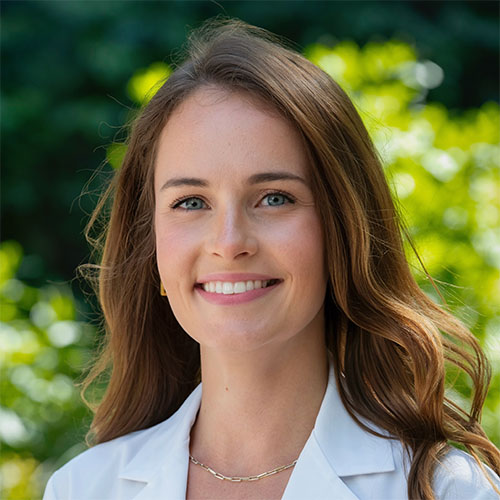

Claudia Atwood (she/her)
Second-Year Student, Class of 2026
BS Biochemistry
Virginia Tech
Clinical Technician (Med/Surg)
Home State: Virginia
Why NUPA?
I chose NUPA for its unique program and curriculum. Through NUPA’s four elective rotations and its close partnership with Northwestern Medicine, I can explore my many interests in medicine beyond standard PA school rotations. I'm also preparing for my first shift at my ECMH (Education-Centered Medical Home) clinic, which is part of a downtown FQHC—another distinctive feature of the NUPA program. Through ECMH, I'm excited to apply the knowledge I've gained since May to help a patient population I hope to serve as a PA-C after graduation.
What is your favorite thing about NUPA?
My 35 classmates are definitely my favorite thing about NUPA. Our small class size allows me to really get to know everyone, which I’ve thoroughly enjoyed. We come from all over the U.S. with diverse backgrounds—career-wise, culturally, and more—but we all get along great. It’s amazing that I can sit down for lunch with anyone in our class and know I’ll have a good time. I moved from Washington D.C. to attend NUPA and didn’t know many people in Chicago, but I feel totally at home here because of my incredible classmates.
What are your impressions of the curriculum so far? Favorite class?
The realities of didactic year of PA school have definitely set in, with the fast-paced learning and the commitment required outside of class. However, I’ve really enjoyed all three units we’ve covered so far (Hematology, Pulmonology, Cardiology). It makes me curious about what I’ll enjoy most during clinical rotations next year! My favorite class is either physiology or patient assessment. I love learning how a body system is supposed to work in physiology and then apply that knowledge to how pathophysiology can manifest in physical exam findings in patient assessment.
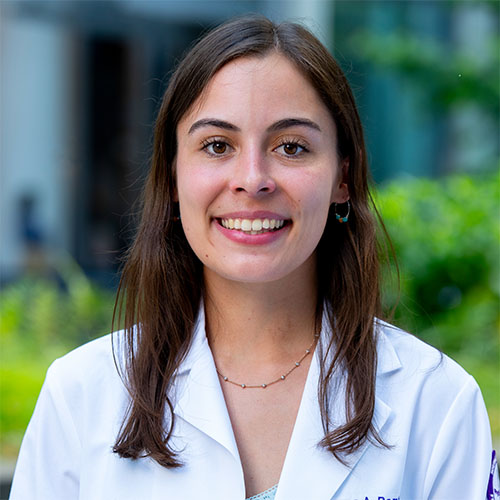

Simo Bambi (she/her)
Second-Year Student, Class of 2026
BA Biology
Grinnell College (IA)
Clinical Research Coordinator
Home State: Illinois
Why NUPA?
So many reasons! First, I was drawn to the PBL-based curriculum because it allows students to start building their clinical critical thinking skills right off the bat. NUPA also has an Education-Centered Medical Home (ECMH) program, where students can begin working in an outpatient clinical environment throughout their first year. This is an awesome way to start applying what we learn in the classroom to real patient visits in a low-stress, interdisciplinary team-based setting. Finally, the interview process sealed the deal for making my decision - the faculty and alumni were so kind, supportive, and engaging, and I really loved the culture of NUPA.
What is your favorite thing about NUPA?
The people! Since day one, this cohort has been so welcoming and friendly. Everyone brings such amazing backgrounds and experiences with them, and I feel incredibly lucky to learn with and learn from all of my classmates. Our class culture is very collaborative and supportive - through the tough days and the fun days, we always have each other’s backs. The support that we’ve received from the faculty and NUPA alumni has also been amazing.
What has the transition been like between the didactic and clinical years of the program?
The transition to the clinical year has been incredibly rewarding and eye-opening. It's been amazing to see the concepts we discussed in lectures and presentations during the didactic year come to life in the clinical setting. Engaging directly with patients and learning about their unique backgrounds has added a whole new dimension to my understanding of healthcare - deepening my appreciation for shared decision-making and reinforcing my commitment to patient-centered care as I grow into a future clinician.
What are your favorite things about Chicago?
I love that there is always something going on in the city. Every weekend there is something new to experience - festivals, farmers markets, art fairs, museums, and the FOOD! There are so many amazing restaurants, cafes, and local food spots. Being near the lake is also so relaxing and fun, and I love taking walks or biking along the lakeshore path.
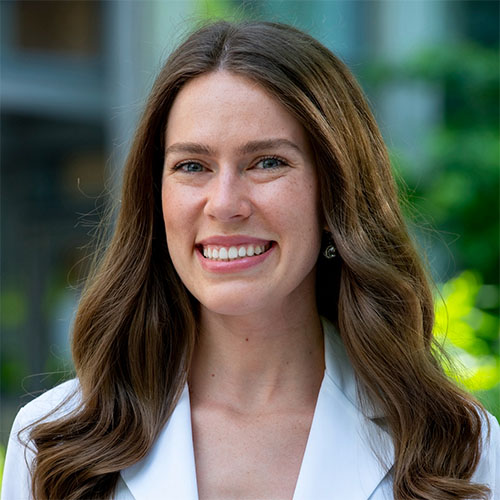

Hannah Barger (she/her)
Second-Year Student, Class of 2026
BS Health Science
University of South Florida - Tampa
Medical Assistant (Hematology/Oncology)
Home State: Florida
Why NUPA?
Northwestern's reputation precedes itself, but beyond that it embodies a culture that emphasizes inclusivity, open-mindedness, comprehensive education, and compassion. What really stood out to me was NUPA's focus on patient-centered care (such as medical Spanish and behavioral preventative medicine courses, etc.), the problem-based learning curriculum, and interdisciplinary collaboration. NUPA's position within a world-class academic medical center provides its students with access to renowned staff and facilities, which I was confident would provide me with a high quality, innovative, dynamic education (and it has!). Above all, there is a distinct orientation of Northwestern's faculty and students that emphasizes serving our neighbors and remaining culturally sensitive and continually teachable. This posture encourages excellence within the advancement of the profession, between disciplines, and most importantly, to every patient we encounter.
How would you describe the class culture/vibe at Northwestern?
I truly could not have crafted a more fun, genuine, collaborative, and kindhearted class than the one we have. Without question, the people are one of my favorite aspects of this program and I couldn't imagine learning alongside anyone else. I am overwhelmed with gratitude for the way NUPA has brought so many wonderful friends and future colleagues into my life!
Between both my class and the awesome PA-S2s, there is an incredibly diverse span of experiences and perspectives to learn from as we approach different types of clinical scenarios and educational content. Beyond that, the faculty is absolutely incredible, accessible, and devoted to ensuring that we are able to understand and apply what we are learning. PA school is not something you are meant to take on alone, so finding a program with a team-oriented, friendly, and supportive dynamic significantly impacts your ability to face challenges and embrace the many good times as well.
How did your first-year experience prepare you for clinical rotations?
I truly believe that the holistic, well-rounded nature of my first year is what best prepared me for rotations. I have been so grateful to move through clinicals feeling like I already have a strong educational foundation to build upon. PBL and ECMH made a significant difference in my clinical confidence from the previous exposure I had to patient care and working as a team to optimize outcomes.
The program also did a really good job of implementing clinical prep early on. By the time I started, it didn’t feel like a mystery- I knew what to expect, was familiar with different clinical skills, and felt excited rather than nervous. As with everything else, knowing that I’m supported by the most wonderful faculty made a meaningful difference as I stepped into another newer aspect of my training.
Medical Spanish, ethics, and behavioral preventative medicine courses have all blended together to form a strong toolkit for me to utilize during clinical year. You’ll quickly learn that patient care is not only about how much medical knowledge you have, but also how well you are able to connect with your patients and develop patient-centered relationships rooted in compassion, cultural sensitivity, and trust. I’m so grateful for the way NUPA has prepared me for clinical year and can’t wait to keep learning!
How has your experience been relocating to Chicago?
I haven't lived outside of Florida before, so moving to Chicago was a huge change filled with a lot of unknowns. Despite my initial nerves, I have been absolutely blown away at how seamless the transition has been. The city is incredible, and starting PA school in the summer is a huge advantage that allows you to explore all of the different surrounding neighborhoods and fun events that constantly pop up. There are recreational sports leagues (ask me about kickball!), beaches, beautiful parks, farmer’s markets, concerts- there is never not something to do! The Streeterville area where the program is located is super cute, right next to the navy pier/lakefront trail, and filled with great food/coffee spots. It seems that no matter where you go, people are so friendly. Beyond great walkability, the “L” public transportation system is super easy to navigate and accessible, so not having a car hasn’t been an issue in the slightest.
At the beginning of the year, you are paired with a second-year student mentor/“big”, and that has also been an awesome resource- my big has been a supportive friend that I feel I can bring any questions to (shoutout Lisa!). Transition can be hard, and starting PA school is certainly an adjustment, but NUPA does a great job of helping you get settled in an already fantastic city. The Chicago hype is truly real, and I don’t foresee myself leaving even after school is finished!
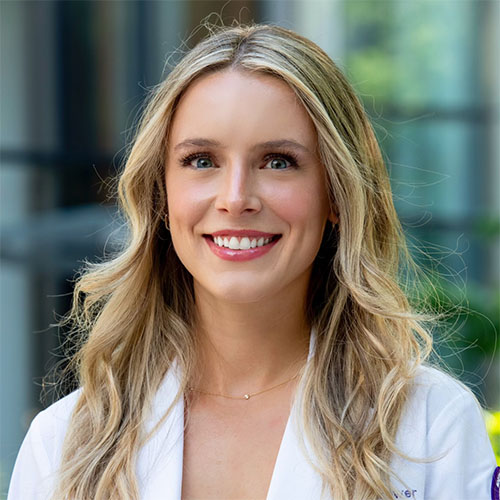

Maizy Brewer (she/her)
Second-Year Student, Class of 2026
BS Medical Sciences
University of Idaho
Medical Assistant (Hematology/Oncology)
Home State: Oregon
Why NUPA?
NUPA stood out to me for so many reasons, the most significant being that from the first correspondence, NUPA felt like home. Throughout the interview process, I could sense the faculty’s passion for educating future PAs and dedication to student success. Everyone I met along the way was encouraging, enthusiastic, and charismatic. Chicago was also a place I was eager to learn medicine in—the city’s diversity, rich history and culture, and ample opportunities to be a part of necessary initiatives to eliminate medical disparities and improve healthcare outcomes were all huge pulls for me. Now that I’m here, I’m absolutely loving it. There has never been a doubt in my mind that I made the right decision by choosing NUPA.
How would you describe the class culture/vibe at Northwestern?
Our class is like one big, fun family. We support each other, we laugh together, and we make sure no one feels alone in this journey. I love how each of us came into NUPA with different patient experiences and that we enrich each other’s learning with our own distinct knowledge bases. I think our class of 36 is a wonderful size.
Thinking back to your expectations about what the clinical year would be like, what has surprised you most now that you are taking care of patients every day?
What has surprised me most is just how well didactic year has prepared me for clinicals. I am constantly learning new things each day, but the base of knowledge I have from last year has helped me be able to actively participate in patient care. I also feel like most of the preceptors I’ve had so far have been very trusting and patients really do look up to the entire team, students included, for information. It is incredibly reassuring when our didactic learning directly applies to “real life” clinical decision making!
How has your experience been relocating to Chicago?
I grew up in a suburb of Seattle, WA, so relocating to Chicago was a big move for me. It was exciting and scary all at once, and it’s been nothing but positives since living here. I love the vibrance of the city life, the walkability, and the fact that each different neighborhood has its own unique feel. There is so much to offer here and something for everyone. Lake Michigan also provides a nice nature escape and is a beautiful setting for morning strolls. The best part about Chicago? THE FOOD, hands down. This city has every kind of food there is, and it’s all amazing.
What advice would you share with an applicant considering the Northwestern University PA Program?
To an applicant considering the Program, I would say that you have great taste in PA programs! In all seriousness, I am so happy here at NUPA and this program definitely does change lives. I would remind applicants to trust in what makes them stand out, to be authentic to themselves, to take chances, and to never count themselves out, ever!
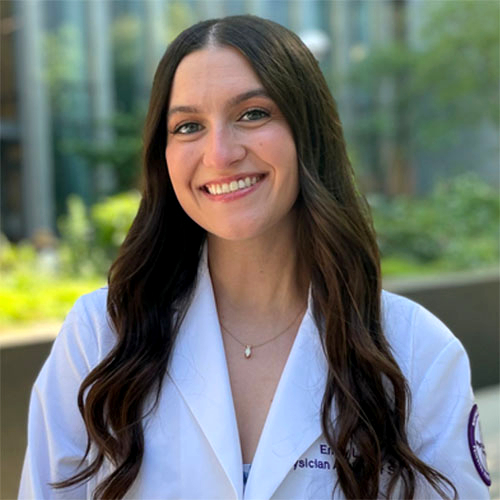

Emily Brun (she/her)
Second-Year Student, Class of 2026
BS Psychology
Kansas State University
US Air Force Aerospace Medical Technician
Home State: Kansas
Why NUPA?
I chose NUPA because it was clear to me how much the faculty cared about its students, and I knew I would be well supported and encouraged throughout the program. While speaking with current and former NUPA students, they all spoke so highly of the curriculum, faculty, and opportunities they had both as students and after graduation. Problem-Based Learning (PBL) was also a huge factor for me, as I love how it teaches critical thinking skills and gives a more real-world experience as PAs.
Tell us about your experience in PBL.
I have loved my experience in PBL. Being able to work with a group to correctly assess, diagnose, and treat a patient gives me confidence in my ability to think critically and trust my knowledge. Dr. Min is such a great facilitator, and I love that she encourages us when we are on the right track and creates an environment where we are eager to learn. She makes PBL so much fun!
What has the transition been like between the didactic and clinical years of the program?
The transition between didactic and clinical year has been easier than expected. So much of the information and skills that we learned during didactic have been able to come to practice as I use that knowledge to care for patients. The relationships that the program has built with our rotation sites are clearly strong, and I have had great experiences with preceptors that are happy to teach.
How would you describe the class culture/vibe at Northwestern?
I absolutely love the connections I have made with my classmates, and that our connection as a class felt instantaneous. I love the way we are all so supportive of each other and really want to see each other succeed. They make a rigorous class schedule so fun, and it truly feels like I made 35 new best friends overnight!
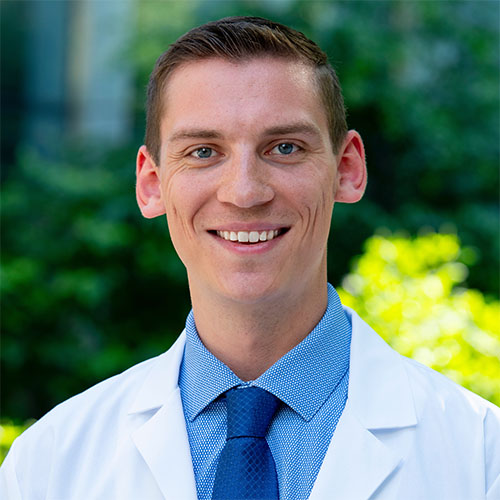

Alec Campbell (he/him)
Second-Year Student, Class of 2026
BS Political Science/Psychology
University of Illinois at Urbana-Champaign
Paramedic
Home State: Illinois
Why NUPA?
I chose NUPA for a couple of reasons but ultimately it was the welcome I received. From the start of the process the entire faculty and staff seemed like they truly care about getting to know me and not just trying to fill a seat. I was also drawn in by the PBL curriculum as it was not something I had seen in many other programs I was interviewing at. I liked the small group aspect where we could talk through the case of a real patient from interview to diagnosis. The fact that Northwestern's PA program is located in downtown Chicago in one of the leading hospital systems in the country really made this decision a no brainer. The opportunities we have to learn from preceptors at not only Northwestern Memorial Hospital but Lurie Children's Hospital, Prentice Women's Hospital, Shirley Ryan Ability Lab, and so many others makes the NUPA program stand out compared to the rest. Our early introduction to patient care through our ECMH clinicals early on in our didactic year is something that will allow us to grow as providers during our clinical year and was a selling point of the program!
Looking back at didactic year, what are your takeaways?
I am really enjoyed the systems approach we do for learning medicine. I liked that we go through all aspects of one system from acute to chronic and everything in between so we can focus on disease in the context of one system before learning about the next. I think I am able to have a better understanding of the material by learning this way. Our faculty have a wide range of experience that they focus on and bring in amazing guest lecturers who are experts in the topics we're discussing. Our curriculum is built in a way we are learning similar things in all our classes and near the end of the unit it's fun to be able to put all the pieces together to fully understand the system we are covering. My favorite class was Anatomy. The NUPA program has a dissection-based anatomy curriculum which I did not see at many of the other schools I had applied. We have the facilities and expertise in order to dissect each organ system and get hands on experience which will definitely help us later in our careers as PAs!
How has PBL prepared you for success during clinical year?
I think PBL has really allowed me to have a deeper understanding of the patients I interact with on my rotations. Many of the PBL cases we had, I have since seen play out on my rotations. Because of PBL I feel like I have a foundational knowledge of how to go about interviewing a patient and working them up for my top differentials. I think without this in the curriculum I would be much further behind the 8 ball and wouldn't have been able to jump right into clinicals as I did. PBL is definitely a different way of learning, but it is one that has made me successful so far in clinicals.
What advice would you share with an applicant considering the Northwestern University PA Program?
I think the one piece of advice I would give to those who are apply to NUPA and PA school in general is to make sure you're using your clinical experiences to learn. There are so many things you can learn from your clinical experience on top of what the actual job is. Don't be afraid to ask questions, even if that isn't related to your current job. Ask to observe procedures or patient interviews. Learn how to take vitals and do hands on skills, even if you don't do that on a daily basis. The experiences you have will help so much in PA school. You will learn how to be a PA in school but by actively engaging in your clinical experience before school you will have a better foundational knowledge that will definitely help along the way. My second piece of advice is to take a couple weeks off work before starting school. Just have some time to travel or hang out with family and friends and relax before school starts. PA school is fast paced and rigorous so having some time to relax before it starts is a must!
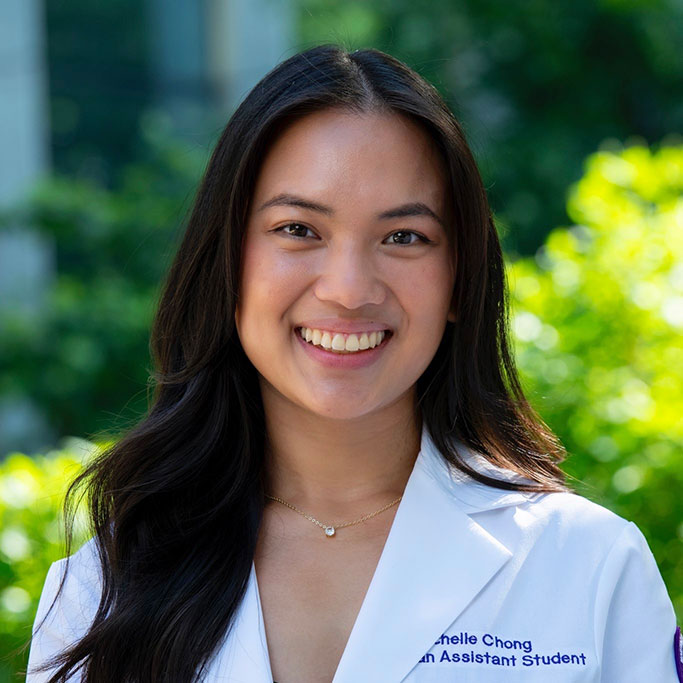

Michelle Chong (she/her)
Second-Year Student, Class of 2026
BS Health Science
University of Florida
Patient Care Assistant, Medical Assistant (OB/GYN)
Home State: Florida
Why NUPA?
Initially, I was interested in NUPA because of the Problem-Based Learning (PBL) curriculum and how that could facilitate my learning as a future clinician. I can confidently say now that PBL has been a huge part of my growth as a student and preparation as a future provider, all thanks to my wonderful classmates and supportive faculty.
What is your favorite thing about NUPA?
The people are by far my favorite thing about NUPA. Everyone is so supportive, and it is truly a collaborative environment among my peers. The campus's location next to the lake in the heart of Chicago is also a plus.
How did your first-year experience prepare you for clinical rotations?
The didactic year felt like a whirlwind due to the amount of information we learned each day, but it laid a strong foundation for my clinical rotations by helping me develop core medical knowledge and clinical reasoning skills I rely on every day. PBL helped me think like a true clinician by fostering a systematic approach to taking patient histories, performing physical exams, ordering diagnostic tests, and developing treatment plans, skills I use every day on my rotations. We participated in many patient encounter workshops to practice our skills and receive feedback, ensuring we were as prepared as possible for rotations. The NUPA curriculum helped me feel more confident in making the transition from didactic year to clinical year, and now I am reinforcing all of the skills and knowledge I gained during my first year!
How has your experience been relocating to Chicago?
As a native Floridian, I thought I wouldn't be able to bear the cold. But I have adapted and learned to bundle up with the right gear to appreciate the snow days! Chicago is truly beautiful and public transit-friendly, and there are so many events happening all the time.
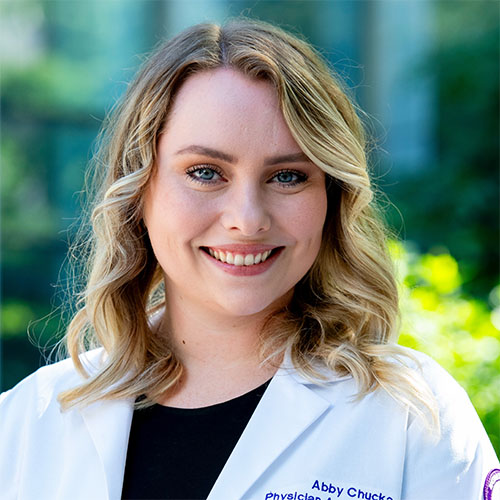

Abby Chucka (she/her)
Second-Year Student, Class of 2026
BS Biology
Gonzaga University (WA)
Medical Assistant (Orthopedics)
Home State: Washington
Why NUPA?
There are so many reasons I chose NUPA! The small class size, four elective rotations, problem-based learning, and the opportunity to learn at an academic medical center are just a few. From my interview to my campus tour to the start of classes, NUPA has felt like home. The faculty, staff, and students make this program special. Not only do I feel supported, but I know that the education I am receiving will prepare me well for my future career as a PA. The resources we have access to in the outpatient and inpatient simulation labs as well as the opportunity to see patients in our didactic year in the Education Centered Medical Home (ECMH) make this program unique. I have never doubted I made the right decision in choosing NUPA.
Tell us about your experience in PBL.
I love the problem-based learning curriculum! From my first exposure to PBL in the interview demonstration I was sold. It provides a great opportunity to combine previous clinical experience with the material we learn in lectures to a simulated clinical scenario. Additionally, it teaches us how to identify gaps in our knowledge and find answers to clinical questions as they arise. I also appreciate the collaborative small group aspect, which strengthens bonds between classmates and faculty.
Thinking back to your expectations about what the clinical year would be like, what has surprised you most now that you are taking care of patients every day?
One of the most surprising parts of clinical year so far has been how quickly my knowledge and skillset has grown. As I write this, I have just completed my second rotation, and I can already see a significant improvement in both my clinical skills and confidence. The transition from the classroom to the clinical setting was initially challenging, as the day-to-day responsibilities are so different. However, it has been incredibly rewarding to apply what I learned during didactic training to real patients and witness the impact firsthand. I am looking forward to continuing to build on this foundation and further develop my skills throughout the rest of clinical year and beyond.
How has your experience been relocating to Chicago?
Coming from Washington State, I was nervous about moving across the country to a city I had never been to before, but I can honestly say I love Chicago. I live in a neighborhood north of the city and from the start it has felt like home. The food scene in Chicago is amazing as well and I have had the opportunity to try many new restaurants since moving here. There is always something going on whether it’s a Cubs game or a street fair and I love that I can rely on public transportation to explore new areas of the city.
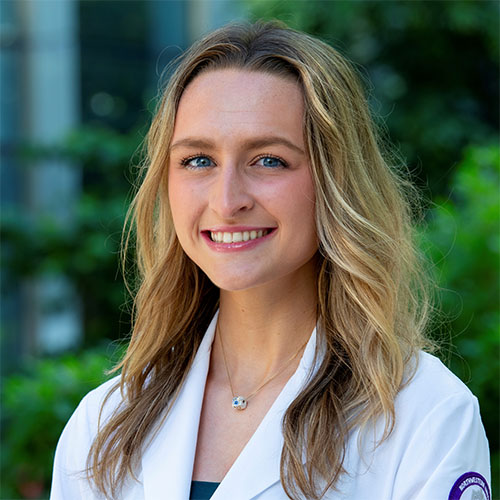

Bridget Giblin (she/her)
Second-Year Student, Class of 2026
BS Biology/Natural Science
Saint Xavier University (IL)
Emergency Department Technician
Home State: Illinois
Why NUPA?
Northwestern’s PA program was my first choice for several reasons. Its comprehensive curriculum integrates both didactic and clinical learning from day one through Problem-Based Learning (PBL) sessions, Education-Centered Medical Home (ECMH) experience, and engaging lectures for each unit organized by organ systems. As a prior Northwestern employee, I knew I belonged here because I felt an overwhelming sense of community and support. NUPA offers students opportunities to network with alumni, other Feinberg students, and Northwestern Medicine providers. By connecting with and learning from experts, we create relationships that allow for postgraduate opportunities and clinical experiences. Additionally, as a native Chicagoan, I knew that I wanted to stay in this vibrant city, where I am exposed to diverse patient populations and clinical environments.
Looking back at didactic year, what are your takeaways?
NUPA’s organ system-based curriculum is one of the most attractive aspects of the program. This means that all classes focus on the same organ system simultaneously. This is my ideal method of learning, because I can use information presented in all classes to build upon necessary diagnostic skills for the future. Our PBL case for the week aligns with the organ system, allowing us to apply our knowledge and work through realistic clinical scenarios. We enjoyed lectures from a wide range of specialists who give us insight into multiple different areas of medicine. Because I enjoy learning about and thinking through diagnostic techniques, my favorite class was Clinical Laboratory Medicine. In this class, we discussed when to order and how to interpret a variety of different labs, tests, and procedures which bring us closer to the root of pathology.
Tell us about a clinical rotation experience/moment that has stood out for you.
During my internal medicine rotation, I cared for a patient newly diagnosed with a challenging chronic condition. She was the first patient I managed independently, with minimal guidance from my preceptor, and I focused on being sensitive and supportive as she adjusted to her diagnosis. On my last day, I visited her to say goodbye, and she shared how safe and cared for she felt, even mentioning that she sometimes forgot I was still in training. That experience was a humbling reminder of the privilege and responsibility of earning a patient’s trust.
What is your favorite thing about NUPA?
My favorite thing about NUPA is the unwavering support from my peers, faculty, staff, and wider Northwestern community. Being a PA student can be challenging at times, but being surrounded by a community of people who constantly build each other up creates a sense of positivity and belonging. Collaboration and encouragement from other students, faculty, and staff fosters an environment of growth and comfort while we build our foundational knowledge of medicine. My peers and I encourage each other by participating in small group study sessions and sharing study resources. We are matched with upperclassmen who guide us through our first year and offer us advice on how to achieve our goals. Overall, NUPA’s supportive community offers a unique environment where students can successfully learn and evolve into knowledgeable, compassionate, and competent medical providers.
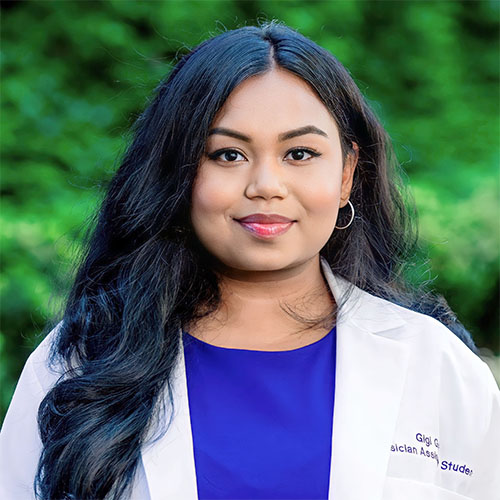

Gigi Guha (she/her)
Second-Year Student, Class of 2026
BS Psychology
Wayne State University (MI)
CNA, Medical Assistant/Scribe (Family Medicine)
Home State: Michigan
Why NUPA?
NUPA truly stands with its unique Problem-Based Learning (PBL) curriculum, which is not just any ordinary learning method. I love learning from my other classmates, from the facilitators, and being able to work together as a team navigating complex cases truly enhances my own individual learning, but also improving my critical thinking skills as a PA since day one. To add onto that, I love how NUPA incorporates a slew of expert guest lecturers to better enhance our understanding of the topic. NUPA goes above and beyond by inviting some of the best guest lectures in the world of medicine to share their wisdom with us. Learning from the guest lectures can be super engaging and I love getting a different perspective on their approach to medicine. The constant support from faculty, staff, and classmates, combined with these interactive experiences, will shape my future career as a PA, thanks to NUPA's unique PBL curriculum that encourages collaboration, critical thinking, and lifelong learning.
How would you describe the class culture/vibe at Northwestern?
The class culture at Northwestern is truly exceptional. Everyone is incredibly helpful, kind, and encouraging, fostering an overall positive atmosphere that significantly enhances my experience. The best part is the diversity of experiences and backgrounds that each student brings to the table. When we all come together as a class, it creates a vibrant and dynamic environment where we learn from each other and grow together. As a class, we often gather for lunch outside the classroom to strengthen our bonds. With our small class size, it feels like we are a close-knit family, always checking in on one another. This sense of community and collaboration makes Northwestern a unique and inspiring place to be.
Compared to your expectations coming in, what surprised you once you started at Northwestern?
When I first started at Northwestern, I was initially apprehensive about the sheer amount of information I would need to learn. However, I was pleasantly surprised by how much information I was able to retain. I was able to digest and learn information at a fast pace, and I was mostly surprised by how many reinforcements were added throughout each course and PBL session, and how I could connect it to previous patient care experiences. Additionally, while I knew about the Education-Centered Medical Home (ECMH) at Northwestern, I didn't realize just how many opportunities it offered. For instance, if you're interested in family medicine or pediatrics, you can gain clinical patient experiences before the clinical year, which makes choosing rotations during the clinical year more fun! I was also genuinely surprised by how encouraging everyone around me is and the supportive environment that Northwestern has created. There is literally support to be found in every corner, and if no one can answer my question, I know Northwestern will find a way to help me find the answer.
What has the transition been like between the didactic and clinical years of the program?
The transition from didactic to clinical year has been exciting and challenging at the same time. Moving from a classroom setting to a clinical setting pushed me to apply my knowledge more actively and strengthen my clinical judgment and reasoning skills. Fortunately, PBL prepared me for this. I have had to become more comfortable during clinical year with managing uncertainties and having more questions, but at the same time I can rely on my skills from didactic year through researching certain conditions, collaborating with my colleagues, and being more hands-on with the patient experience.
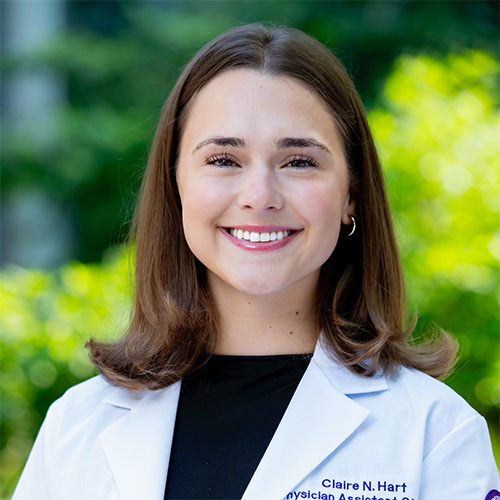

Claire Hart (she/her)
Second-Year Student, Class of 2026
BS Integrative Physiology
University of Colorado - Boulder
Research Services Professional, CNA
Home State: Colorado
Why NUPA?
I chose NUPA for the Problem-Based Learning (PBL) and organ-system curriculum. When comparing programs, I loved the idea of working through patient cases on a regular basis. I knew it would be beneficial to practice critical clinical thinking as soon as possible. PBL fosters a collaborative environment between faculty and your fellow classmates, which I appreciate. I have the opportunity see how other people approach a clinical scenario, which may be different from my approach. I am able learn more from these experiences. When researching programs, the organ-system curriculum made NUPA stand out. I knew this would best suit my learning style. The format allows you to dive in depth to a system and learn everything there is to know, all at one time. Finally, the faculty is amazing. I feel supported by all members of the NUPA team, knowing they are rooting for all of us to succeed.
How would you describe the class culture/vibe at Northwestern?
Our class culture is the best. I didn’t know what to expect when starting, but I was pleasantly surprised. I had feared about classmates competing with one another, but that is not the case at Northwestern. We all support each other, inside and outside of the classroom. If someone finds a great study resource, they immediately share it with the rest of the class. I have made some of my best friends through the program as well. I feel like I truly found my people, and I couldn’t be happier about it.
Tell us about a clinical rotation experience/moment that has stood out for you.
For internal medicine, I was at Northwestern Memorial Hospital in an inpatient setting. My first week on the floor, I worked with a specific patient the entire week. He was not in great shape when he was admitted and didn’t even want to talk to anyone. On the fifth day of his admission, he had a dramatic improvement. That morning, I walked into his room and saw him smile for the first time. I literally stopped in my tracks and cheered, which made him laugh. I had some downtime, so I kept him company. He shared stories about his life and family. We had the opportunity to create a strong provider-patient bond over the week, so it brought me genuine happiness to see him improve so much. He was finally ready for discharge, so I stopped by his room to say goodbye. He said to me, “I can tell you paid attention in class. Thank you for taking care of me, and most importantly for seeing me as more than a patient”. That moment will stick with me forever. It was rewarding to know all the hard work from didactic year had paid off in a meaningful way. But it also served as an important reminder to take the extra step when treating patients, because it does have a positive impact.
What are your favorite things about Chicago?
I absolutely love Chicago. I am from Denver, and this was my first time moving out of Colorado. I was nervous about the transition, but it has been a breeze. There’s never a shortage of things to do or restaurants to try. You always hear people rave about the food in Chicago, and the hype is real. I also love getting to go to the lake. I have been land-locked my whole life, so it has been amazing to have access to a beach. Summertime in Chicago is truly the best. I also love the architecture in the city. I live in the Gold Coast neighborhood which has a ton of stunning, old buildings. Nothing beats getting a coffee and just walking around my neighborhood to take a break from studying! I have loved living here and feel lucky to go to school in such a cool city.
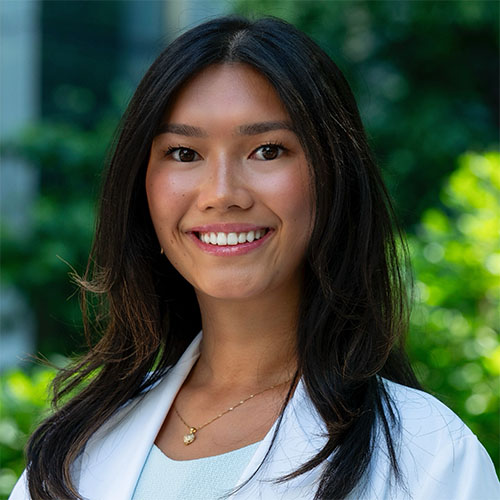

Cordelia Ko (she/her)
Second-Year Student, Class of 2026
BS Biopsychology, Cognition & Neuroscience
University of Michigan – Ann Arbor
Medical Assistant (Urgent Care)
Home State: Texas
Why NUPA?
I chose NUPA because of how amazing my interview and tour experience were with extremely welcoming and supportive faculty and students! I also really liked the location right here in downtown Chicago, the curriculum, and the vast number of resources that Northwestern has to offer.
How would you describe the class culture/vibe at Northwestern?
We got to know each other really well in such a short period of time! I love that everyone works so well together and that we always try to help each other, whether that's through sharing resources or more directly in study groups. The positive class culture is definitely one of the best parts of coming to school every day!
What has the transition been like between the didactic and clinical years of the program?
The transition from the didactic to the clinical year has been both exciting and rewarding. After spending the didactic year primarily in lectures, simulations, and exams, it’s been great to see how the concepts we learned translate into everyday clinical practice. I think Northwestern’s didactic curriculum prepared us very well for this transition. We finished the year with a strong framework for approaching patients — knowing how to ask pertinent questions during the history, perform a comprehensive physical exam, and develop a well-reasoned differential diagnosis, workup, and treatment plan. That foundation has helped me feel confident and capable entering each new rotation, even as each specialty and setting presents its own unique challenges.
I’ve really enjoyed how dynamic and hands-on clinical year has been so far. I’m constantly learning and refining my skills by actively participating in patient care, discussing clinical cases, and receiving feedback from experienced providers. This has helped me grow not only in clinical competency, but also in my ability to communicate effectively, collaborate with different teams, and trust my clinical judgment as it continues to evolve.
What are your favorite things about Chicago?
There is so much to do in Chicago! There's great food, sports games, happy hours, shopping, beach days, just to name a few. Some of my favorite things to do are going to the Lincoln Park farmer's market on Saturdays, trying new restaurants, and just walking on the lakefront trail and exploring more of the city.
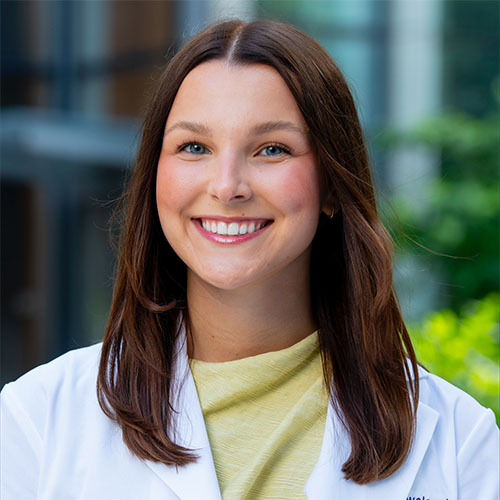

Hannah Kowalczyk (she/her)
Second-Year Student, Class of 2026
BS Medical Sciences
Saint Louis University (MO)
Emergency Department Technician, Rehabilitation Aide
Home State: Illinois
Why NUPA?
When applying to PA programs, Northwestern stood out to me for many reasons. I felt I would learn best in a small class at an academic medical institution with a well-rounded curriculum to help me become the provider I want to be-- Problem Based Learning (PBL), 4 elective rotations, full cadaver lab, and organ system-based learning made me feel like NUPA would be a great fit. My interviews and campus visit confirmed this feeling as I was met with genuine, kind, and knowledgeable members of the program. Interviews are innately stressful, so I knew that the comfort I felt at NUPA was special!
Compared to your expectations coming in, what surprised you once you started at Northwestern?
Everyone tells you how challenging PA education will be, and, while this is true, I found myself feeling very well-supported at NUPA. Whether it is your faculty mentor, PBL facilitator, "big sibling" peer mentor, or your fellow classmates, you are constantly reminded that you are not alone on this journey and that you will make it through! One of the benefits of a small class like the one here at Northwestern is the quality relationships you form with those around you that make this challenging time both conquerable and enjoyable.
Thinking back to your expectations about what the clinical year would be like, what has surprised you most now that you are taking care of patients every day?
Going into clinicals I questioned if I would remember all the assessments, diagnostics, and treatments necessary to take care of complex patients, especially starting with Internal Medicine where you see a wide variety of patients. I was surprised by how quickly information from didactic year came back with a little refreshing! I quickly felt more confident in my knowledge and skills than I imagined I would be. Also, I am pleasantly surprised by how many patients are happy to work with students! It's great to feel like a valued member of the care team.
What advice would you share with an applicant considering Northwestern?
My advice is to lean into whatever you are doing! If you are in undergrad, take courses you are passionate about and get involved in organizations that are meaningful to you. If you are gaining clinical experience, learn from those around you and make a meaningful impact on your patients. Trust me that you will miss this chapter of your life and simultaneously look back on how much you grew through it! All of these experiences will surely shape you into a well-rounded student and future PA.
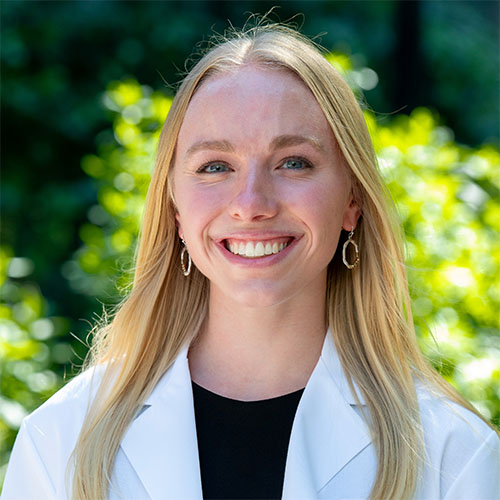

Anna Lalande (she/her)
Second-Year Student, Class of 2026
BS Kinesiology
University of Minnesota - Twin Cities
Direct Care Professional
Home State: Wisconsin
Why NUPA?
The people! I left interview day with such a great feeling of the NUPA community. The faculty and staff here are incredibly supportive, and the students feel like family. I also loved the idea of a Problem-Based Learning (PBL) curriculum and saw value in being at an academic medical center in the heart of Chicago. I feel incredibly fortunate to have the opportunity to learn from experts in the field.
What is an average day like for you?
I live with a classmate north of campus. We have our morning coffee together and bike along the lake front to get to class. On PBL days, we meet in our small groups in the morning and work through a patient case together. We have an hour lunch break every day, and our class typically uses that time to unwind and sit outside together if it’s nice. We have lectures in the afternoon and are typically done with class between 3-5pm. Sometimes I stay at the library for a few hours after class before biking home. My roommate and I make dinner together and unwind for a bit, and then we study until bedtime. Sometimes we’ll take a walk in the evenings to get ice cream as well. One of my favorite parts of being in Chicago is being walking distance to so many fun places!
Tell us about your experience in PBL.
PBL was a huge draw for me to the Northwestern PA program. On Monday mornings, our small groups are presented with a patient case, and we work together to list as many possible diagnoses that we can think of to explain their symptoms. Throughout the week, we virtually interview the patient, conduct a physical exam, order tests, and eventually diagnose the patient and develop a treatment plan. In between PBL sessions, we individually research topics to present to our group to help fill in our knowledge gaps. One of our faculty members facilitates each group to keep us moving in the right direction and challenge our thinking.
PBL is such a great experience. It’s gratifying to see how much you learn throughout the week, and it really challenges you to think like a clinician. It’s also a nice way to actively apply what we learn in lecture while incorporating each student’s background prior to PA school. So glad I attended a PBL program!
How has PBL prepared you for clinical year?
PBL prepares you to think like a clinician. Going into the clinical year, I was worried whether I knew enough medicine to be successful. I quickly realized that even if I didn’t have all the answers, I had a strong foundation that allowed me to reason through next steps and engage in a thoughtful discussion with my preceptor about what labs to order or what treatment options may be effective. PBL teaches you to think critically about the patient in front of you and provide care that is supported by the medical literature.
Additionally, I frequently find myself remembering concepts that my peers taught me or that I researched myself for PBL. Oftentimes, learning from your peers helps information sink in easier. I still reference my peers’ presentations on clinical rotations.
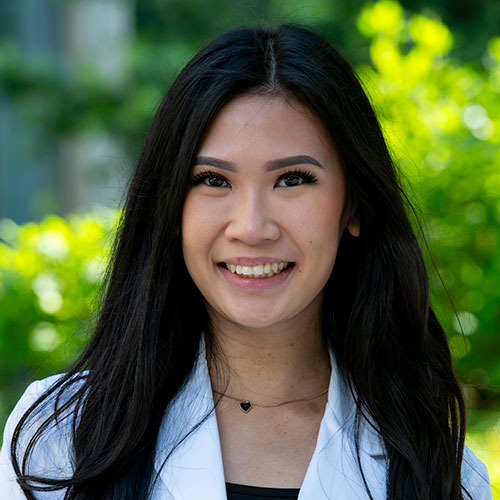

Patty Nguyen (she/her)
Second-Year Student, Class of 2026
BS Biology
UCLA
Medical Assistant (Plastic Surgery); Medical Scribe (Heme/Onc)
Home State: California
Growing up in a highly diverse area like LA County, I wanted a PA program that would prepare me to care for diverse patient populations. Northwestern’s location in Chicago, as well as the courses offered such as Behavioral and Preventive Medicine (BPM) and Medical Spanish, ensures exposure to a wide range of communities and healthcare needs. The opportunity to complete rotations in such a large city was a key factor in my decision. I was also drawn to NUPA’s four elective rotations, which allow me to explore my interests further. Having worked in hematology/oncology, allergy, and facial plastic surgery, I appreciate the flexibility to continue developing my clinical skills in these areas while gaining exposure to other specialties.
Looking back at didactic year, what are your takeaways?
Coming from a large public university, I expected a more competitive environment similar to undergrad, especially given how accomplished my classmates are. However, the opposite couldn’t be more true! I was surprised by how supportive and collaborative the culture at Northwestern is. Everyone in the class genuinely wants to see each other succeed– we constantly share study resources, help one another, and create a positive learning environment.
I was also surprised by how accessible and engaged the faculty are. Their doors are always open, and they truly care about our success. You never feel like you’re going through this journey alone, and that sense of support has made my experience here even better than I expected.
Thinking back to your expectations about what the clinical year would be like, what has surprised you most now that you are taking care of patients every day?
What has surprised me most is realizing how much I actually know, and how much more I enjoy certain fields than I expected! Despite preparing as much as you can during didactic year, you can never fully gauge how classroom learning will translate to patient care, but it’s more applicable than you think. For example, I didn’t enjoy pediatrics in didactic year and assumed I wouldn’t like it, but it has been one of my favorite rotations so far! Clinical year has taught me to keep an open mind and trust the knowledge I’ve built.
Tell us about your experience in PBL.
PBL definitely challenged me—but in the best way possible. I’ve always been someone who learns by the book, but PBL has pushed me to think critically and apply my knowledge in a more dynamic way. I love working with my classmates, who each bring different perspectives and expertise, making our discussions more enriching. This experience has also made me more efficient at researching and synthesizing information, as well as sharing information through our Learning Issues (LIs), which are brief weekly presentations on key topics. Most importantly, PBL has helped me retain information better by allowing me to actively apply what we learn in class, making my education more engaging and meaningful.
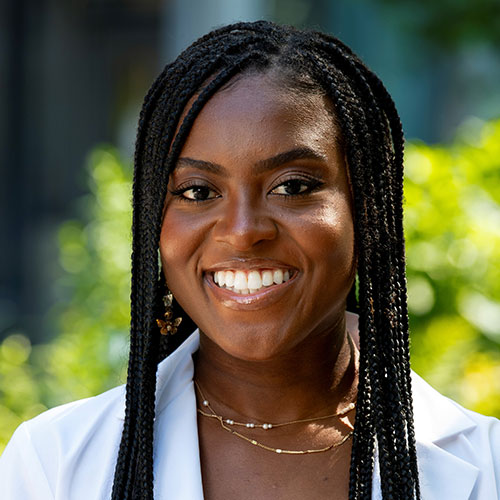

Rachel Okine (she/her)
Second-Year Student, Class of 2026
BA Psychology
Northwestern University
Registered Behavior Technician
Home State: Illinois
Why NUPA?
Northwestern’s PA program stood out to me because of its strong emphasis on both clinical knowledge and experiences as well as community engagement. Coming from a background where I was deeply involved in advocacy, mentorship, and public health I was drawn to a program that prioritizes health equity and interprofessional collaboration. The ability to have an ECMH clinic at a Federally Qualified Health Center reflected my interest in working closely with different communities in Chicago.
Compared to your expectations coming in, what surprised you once you started at Northwestern?
One of the most rewarding aspects of my experience is the vast network of connections to the medical school, guest lecturers, and visiting physicians. I expected rigorous academics and clinical training, but I didn’t anticipate just how many opportunities we’d have to engage with leading experts in various fields. The program’s integration with hospital allows for incredible exposure to specialists and healthcare leaders. Whether it’s a resident giving a guest lecture on the pharmacological advancements when managing heart failure or a panel discussion on addressing smoking cessation, I’ve been continuously inspired by the caliber of professionals we have access to.
Thinking back to your expectations about what the clinical year would be like, what has surprised you most now that you are taking care of patients every day?
What has surprised me most about taking care of patients every day is how capable and impactful I feel in the clinical setting. During the didactic year, it was sometimes difficult to connect classroom learning to real-world patient care. Now, on my Emergency Medicine rotation, that connection has become clear. I initially feared that I would feel overwhelmed or that my knowledge wouldn’t be enough to contribute meaningfully. However, with the support and guidance of the medical team, I’ve not only grown more confident in my clinical skills, but I’ve also realized that I can truly make a difference in patients’ care. It’s been an eye-opening and empowering experience.
What are your favorite things about Chicago?
Chicago’s food scene is unmatched, and one of my favorite things about living here is exploring all the incredible restaurants and cafes. Some of my favorites are Crab King Cajun Boil and Bar, Minghin Cuisine, and The Whale. Great cafes for studying are Two Shades Cafe, Froth, Java and Mug, and Collectivo. If I’m ever craving Asian cuisine, Yummy Thai and Krung The are my go-to’s. Also, since I’m Ghanaian, I love supporting African/Caribbean restaurants like The Mukase Restaurant or Aunt Joy’s Jerk and Pizza. So many fun places and neighborhoods to explore, would highly recommend it!
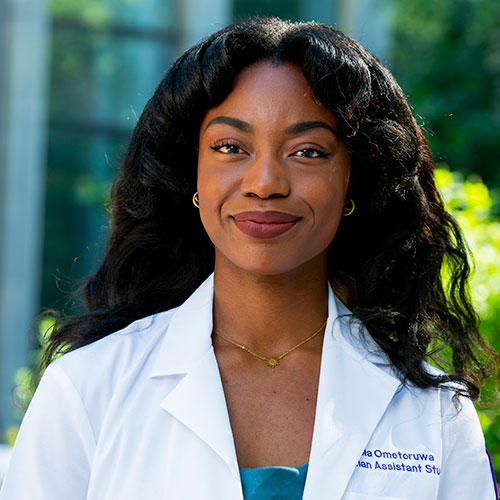

Lola Ometoruwa (she/her)
Second-Year Student, Class of 2026
BS Health Science
Northeastern University (MA)
Clinical Research Coordinator, Patient Care Technician
Home State: Massachusetts
Why NUPA?
I chose NUPA because of its dynamic learning environment, engaging faculty, and strong sense of collaboration. The program challenges students to think critically and actively apply medical knowledge rather than just memorize facts. The lecturers are not only experts in their fields but also passionate educators who make learning interactive and meaningful. Beyond academics, the supportive and team-oriented class culture stood out to me. Everyone genuinely wants to see each other succeed, fostering an atmosphere of encouragement rather than competition. The engaged alumni network also provides mentorship and career guidance, reinforcing the program’s commitment to student success. Now, in my clinical year, I’ve seen firsthand how this foundation translates into hands-on patient care. I’ve been able to apply what I’ve learned in real patient care settings and continue building confidence as I work alongside different healthcare teams.
How has PBL prepared you for success during clinical year?
PBL helped me learn how to think through problems instead of just memorizing facts. It taught me to pull information together, build a solid differential, and work well with others—skills I use every day on rotations. I feel more comfortable jumping into patient care, talking through plans with preceptors, and asking the right questions
What advice would you share with an applicant considering the Northwestern University PA Program?
Come in with an open mind and be ready to adapt. The fast-paced curriculum requires active learning, strong teamwork, and time management. It’s challenging but incredibly rewarding, as you develop the critical thinking skills necessary for real-world practice. Don’t hesitate to lean on your classmates—they quickly become your biggest support system. Utilize all available resources, including faculty, student organizations, and the strong alumni network. Most importantly, make time to enjoy life outside of school. Chicago has so much to offer, from great food to outdoor spaces, and finding balance will help you manage stress and make the most of your time at NUPA.
How would you describe the class culture/vibe at Northwestern?
Northwestern’s class culture is built on collaboration and support. The program is rigorous, but students genuinely help each other succeed. PBL encourages teamwork, fostering strong relationships where classmates actively engage in discussions and problem-solving together. Instead of competition, there’s a shared mentality that everyone benefits when we work as a team. Study groups, peer mentorship, and open discussions create a positive learning environment. The connections made in class extend beyond graduation, as NUPA’s alumni remain engaged and continue to support students. It’s a fast-paced program, but the camaraderie and teamwork make the journey both manageable and rewarding.
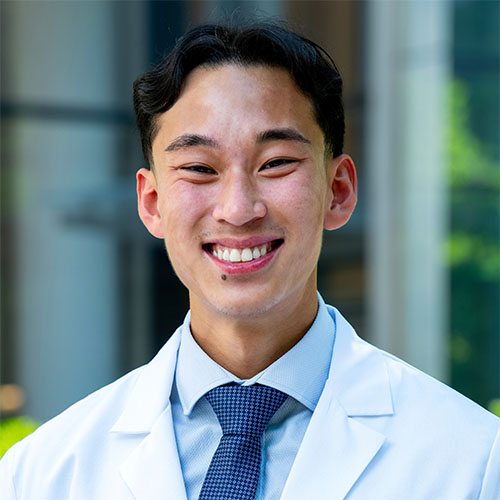

Johnny Phan (he/him)
Second-Year Student, Class of 2026
BS Health Science
Oregon State University
Medical Assistant (Neurosurgery)
Home State: Oregon
Why NUPA?
I was drawn to apply to the Northwestern University PA Program for several reasons. I found the hybrid problem-based learning (PBL) to better fit my learning style of talking through cases as a group, which emulates the environment of clinical practice. I also valued the opportunities for longitudinal clinical experiences early in the curriculum through the ECMH program. Being in a program at a large academic medical center along with the 4 elective rotation opportunities was also appealing to me as someone who wanted to explore a wide breadth of specialties. Beyond these reasons, it was really the extremely warm and welcoming interactions with the program that locked in my decision to attend this program. From the time of submitting my application to my post-interview campus visit, I felt inspired by how passionate the faculty, staff, and students were about this program. I feel so lucky to be on the other side and can’t imagine myself being anywhere else!
What is your favorite thing about NUPA?
My favorite thing about NUPA is by far the people that make it up – from my amazing classmates to the caring, approachable, and supportive faculty who know us well and have a genuine interest in our success! There is something truly special about being in a small and tight-knit program within a large institution like Northwestern Medicine where we are afforded countless opportunities to enrich our clinical knowledge and explore our interests as learners. I am very grateful for the camaraderie and strong sense of community within our program that has made the rigorous demands of school not only more manageable but also meaningful and enjoyable. Being in the heart of Chicago and just steps away from the lake is an added bonus!
Tell us about a clinical rotation experience/moment that has stood out for you.
During my lung transplant rotation, I had the incredible opportunity to participate in a lung procurement. It was profoundly meaningful to witness the entire transplant process from start to finish — from meeting the recipient, flying out of state to the donor hospital for the organ recovery, observing the implantation of the lungs, and ultimately caring for the recipient in the ICU. It was inspiring to see how robust the lung transplant program is at Northwestern and to see the role that PAs had throughout the entire process.
Tell us about your experience in PBL.
I could not imagine going through the didactic year without the opportunity to engage with my peers and faculty during our PBL sessions which have oriented us to think like clinicians from day 1! Being able to work within a team to curate and work through a list of differential diagnoses, collect a meaningful history, perform a thorough physical exam, and create a treatment plan has been a challenging yet extremely rewarding aspect of the program that has enhanced my ability to refine my problem-solving and critical thinking skills. I feel confident that practicing the ability to think through these steps will better prepare me for my transition into clinical rotations and beyond!
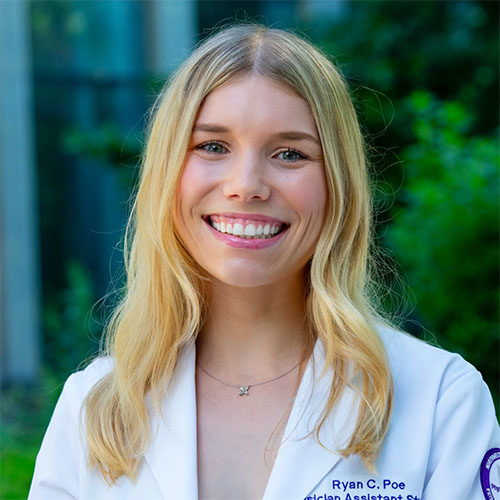

Ryan Poe (she/her)
Second-Year Student, Class of 2026
Master of Public Health, BA Public Health
University of California - Berkeley
Advanced Clinical Associate (Urgent Care)
Home State: California
Why NUPA?
NUPA provides an exhilarating educational atmosphere with a focus on academic medicine and world-renowned research initiatives. I was confident that NUPA would prepare me for the future, equipping me to be an effective communicator, an innovative change-maker, and a patient-centered provider. The Problem-Based Learning (PBL) curriculum at NUPA stood out to me as an opportunity to challenge myself through hands-on, comprehensive case study learning that mirrors the clinical world. The Education Centered Medical Home (ECMH) model was another major draw for me, especially as a former Division 1 Varsity collegiate athlete. I thrive in a collaborative, team-oriented learning environment, and this opportunity to gain clinical experience while working side by side with MD students and other healthcare professionals is invaluable.
Ultimately, I wanted to attend a program that prioritized public health initiatives with holistic medicine at the forefront of its mission. At Northwestern, I knew I would be able to integrate my public health outlook with well-rounded, quality medical care delivery as a future PA. My experiences with the admissions team and faculty throughout the interview process truly sealed the deal for me. Everyone I met was so welcoming, kind, and encouraging; I just knew this would be a supportive and incredible place for my PA education.
What is your favorite thing about NUPA?
My favorite thing about NUPA is the relationships I have built since starting the program. My classmates and I are all very close, and it truly feels like a family here. I have learned so much from each of my peers and am grateful that we get to experience all the ups and downs of PA school together. I feel incredibly fortunate to have such amazing classmates and faculty with diverse experiences, skillsets, and backgrounds. I know I can count on my classmates to work hard and collaborate to achieve our goals. The support and camaraderie we share make even the toughest challenges more manageable, and I’m excited to continue growing both personally and professionally alongside them.
How has PBL prepared you for success during clinical year?
PBL has been instrumental in preparing me for clinical rotations by enhancing my ability to quickly develop a focused yet comprehensive differential diagnosis. During my cardiology consult rotation, I often had to think on the spot when presenting to attendings. PBL helped me systematically consider multiple organ systems—thinking beyond the primary cardiac concern—which was especially valuable given the complex comorbidities many patients had. It allowed me to think beyond the primary issue and understand the broader clinical picture.
What are your favorite things about Chicago?
You can never run out of fun things to do in Chicago! The city is truly unique, with an eclectic and diverse energy. I love that there is always something exciting to try, whether it’s dining at a new restaurant, discovering a local street fair on the weekends, visiting the Lincoln Park Farmers Market, taking the Chicago River Architectural Tour, or catching a Cubs game at Wrigley Field. I’m an active person and love spending time outdoors—whether it’s trying a new workout class, walking along the river or lakefront, or enjoying the beach. The people here are very friendly, and the sports-oriented culture of Chicago is something really special. Every neighborhood offers a new and exciting experience, and I can’t wait to continue exploring over the next few years.
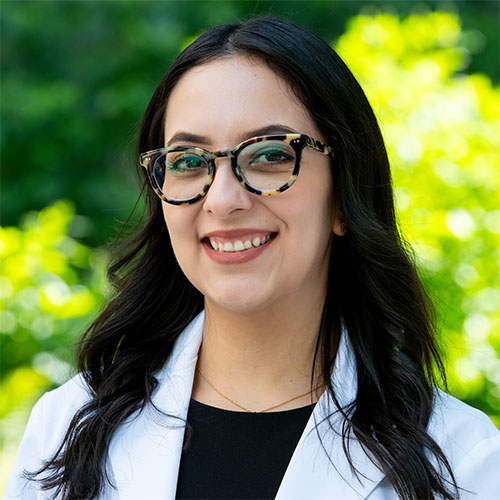

Maria Sanchez (she/her)
Second-Year Student, Class of 2026
BA Health Science
DePaul University
Medical Assistant (Dermatology)
Home State: Illinois
Why NUPA?
As a first-generation student from a predominantly Hispanic, low-income community, attending Northwestern has always been my dream! When I made the decision to pursue a career in medicine as a PA I knew exactly where I wanted to go. I was immediately drawn to the program's problem-based learning (PBL) curriculum, the Medical Spanish course, the early team-based clinical exposure through the Education-Centered Medical Home (ECMH) program, and the ability to learn and be a part of a globally recognized medical center in the city I call home. My motivation to become a PA is fueled by my commitment to serve the underserved communities of Chicago and dismantle healthcare disparities-NUPA shares these same values.
Tell us about your experience in PBL.
PBL is the heart of our curriculum, instrumental to our learning, and so much fun! It has pushed me to think critically and deeply about a wide variety of clinical presentations. It is a great way to apply what we are learning in class and put it into practice. Collaborating with my peers to solve patient cases not only enhances my learning but also prepares us to work effectively in teams, reflecting the core values of our profession. We all collectively have a wide variety of clinical experience and learn so much from each other.
Looking back at didactic year, what are your takeaways?
Our curriculum is structured using an organ system-based approach seamlessly integrated across all of our classes. I cannot imagine learning medicine any other way. We focus on one organ system at a time and examine it from multiple angles of disease analysis. My favorite class was clinical medicine. This course encompasses our Problem Based Learning (PBL) curriculum as well, which prepares us to think like future clinicians. The program invites several guest lecturers who are experts in their field, many of whom are NUPA alumni! It is inspiring to see firsthand how our program has prepared and cultivated such outstanding practicing PAs.
Thinking back to your expectations about what the clinical year would be like, what has surprised you most now that you are taking care of patients every day?
I have been surprised by how seamlessly everything we learned in didactic comes together during clinical year. It has been a true privilege to care for patients, learn from them, and finally put all that knowledge into practice. I feel incredibly grateful for this opportunity and more inspired than ever to keep learning and growing, both to become the best PA I can be for my future patients and to serve the communities that shaped me.
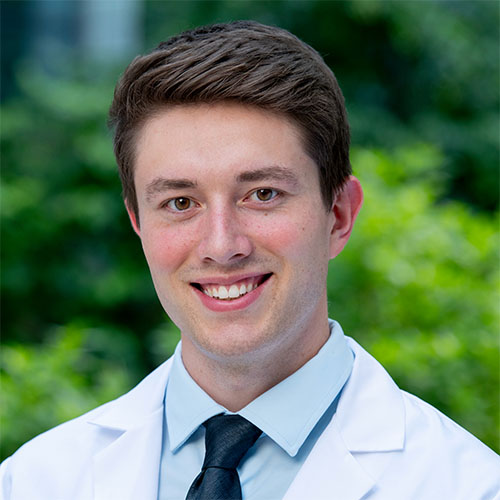

Nate Sisler (he/him)
Second-Year Student, Class of 2026
BS Health Science
Wheaton College (IL)
EMT, Emergency Room Technician
Home State: Illinois
Why NUPA?
I chose the NUPA program for its excellent staff and facilities, small class size, and location in Chicago. Knowing that I would have the opportunity to learn from knowledgeable staff and accomplished guest lecturers while being able to utilize high-tech facilities and resources was a big draw for me. Being connected to Northwestern’s health system for many of my second-year clinical rotations was also enticing, and the small class size and location in Chicago (close to home) were the additional factors that solidified my decision.
How would you describe the class/culture vibe at Northwestern?
The class culture here is great. All of us are supportive, encouraging, and lighthearted. There really is no spirit of competition, and everyone works together to help each individual succeed. The class is tight-knit, and friendships develop quickly here, making for a much more enjoyable experience as we all face that challenge of PA school together. The faculty add just as much to the welcoming culture as your peers, making the learning environment an enjoyable and productive atmosphere. Despite the taxing coursework, there is also plenty of laughter and fun along the way that make it much more manageable.
What are your impressions of the curriculum so far? Favorite class?
The curriculum here is very well organized and I have really enjoyed learning in the organ-system approach that is followed. It really helps to solidify your learning when your various classes covering different aspects of medicine all revolve around the same overarching topics. By the end of each unit, the concepts become tied together and it almost feels as if you’re taking one large class instead of many individual ones. The coursework is also well-organized and structured, and there are seemingly unlimited resources provided to us to guide our learning. My favorite class has been physiology. I enjoy learning the “why” behind all of the mechanisms of various pathologies or treatments we learn about in our other courses.
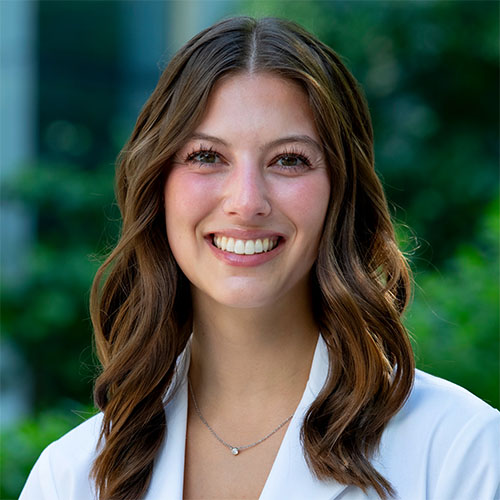

Taylor Stack (she/her)
Second-Year Student, Class of 2026
BS Biomedical Science
Colorado State University
Medical Assistant (Gastroenterology)
Home State: Colorado/Alaska
Why NUPA?
For me, I wanted to attend a program with a smaller class size to help foster an environment of collaboration and community, which was important to me. I also couldn’t ignore the fact that NUPA provides four elective rotations. As someone who’s curious about everything, being able to explore more in my clinical year was a priority to me. Additionally, NUPA partners with Northwestern Memorial Hospital where the opportunities to learn are immeasurable. What sealed my interest even more was the incredible level of communication, care, and passion that went into my interview process - there was no turning back for me!
What are your impressions of the curriculum so far?
It’s truly incredible how quickly you move in PA school! I was nervous to step back into a fast-paced academic environment, but it has shown me how much I can handle. One of the best parts about our small class size is the collaboration that arises from it. Since day one, we have been leaning on each other’s knowledge and unique previous clinical experiences. The program also brings in guest lecturers that are experts in their fields and it’s inspiring to see how passionate they are about the material.
Tell us about a clinical rotation experience/moment that has stood out for you.
One of my electives I have had the opportunity to do early on is a nephrology rotation at Northwestern Memorial Hospital. In just a couple of weeks I have been able to experience the differences in outpatient and inpatient care. Having never worked in an inpatient setting before, I now appreciate how dynamic healthcare can be when multiple specialties are asked to consult on a patient. It has been really great to see and be a part of the collaboration that goes into their care.
How has your experience been relocating to Chicago?
I was very excited to move to Chicago! I think one of the unique things about Chicago is the ability to explore all the different neighborhoods and the food each one has to offer. I try a new restaurant nearly every month and have yet to be disappointed. There are also endless things to explore in the city. I have been able to do a lot of different things with my classmates like attend the Taste of Chicago, see the ZooLights at Lincoln Park Zoo, go on Lakefront Trail walks, and watch the Navy Pier summer fireworks.
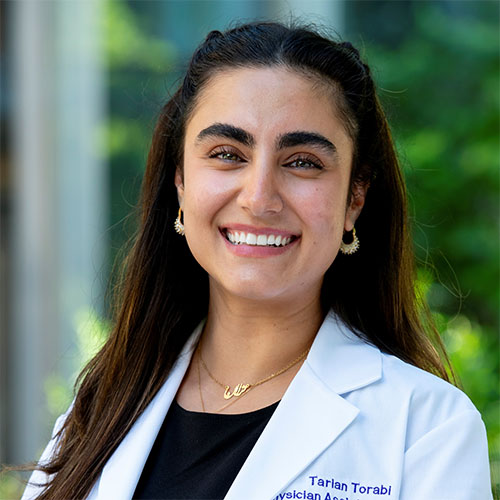

Tarlan Torabi (she/her)
Second-Year Student, Class of 2026
BS Community Health
George Mason University (VA)
Medical Assistant/Scribe (Family Medicine)
Home State: Virginia
Why NUPA?
I ended up choosing NUPA over (what I thought was) by number one PA program and it all started during the interview process. I immediately felt the warm and supportive energy from the faculty, and I could feel their excitement and enthusiasm from my Zoom screen! As I learned more and more about the program, I found several elements that made NUPA unique, including the problem-based learning (PBL) curriculum, opportunities to participate in an international rotation, 4 elective rotations, a small class size, among many others! I was also very excited about the prospect of moving out of my home state, to a vibrant city that was completely new to me. I wanted to challenge myself to grow, not only in my medical knowledge, but also as a young adult, and I have found that moving to Chicago has allowed me to do just that!
Tell us about your experience in PBL.
Like many things in life, PBL certainly has its ups and downs! It really does challenge you to learn and think through concepts in ways that many of us were not introduced to in our undergraduate studies, but I really believe that that is what builds exceptional PAs, as we are learning how to think like clinicians from day 1! I also really appreciate that the small group settings of PBL gives you the opportunity to establish a relationship with faculty members. For those who are quieter in lectures (like me!) PBL creates a space for you to get the know the faculty, and for them to get to know you.
How has PBL prepared you for success during clinical year?
The learnings from PBL have been instrumental in preparing me for clinical year. Through each case, you learn to think like a clinician, training you to approach each patient encounter in a methodical and organized way. Now, I feel much more confident in my ability to conduct focused and efficient patient interviews, ensuring that I gather all relevant information. These skills have also carried over into my ability to communicate patient information clearly during oral presentations. Overall, the focus on clinical reasoning has made my conversations with preceptors more productive and helped me apply knowledge more effectively during patient care.
How has your experience been relocating to Chicago?
Relocating to Chicago has been an exciting and invigorating experience for me! Coming to a completely new city, I was initially unsure of what to expect, but I’ve really fallen in love with the energy here. Chicago's vibrant and lively atmosphere have been exactly what I needed, especially as someone who is prone to burnout. The city's dynamic environment has helped me gain perspective and stay motivated throughout my PA school journey. Lake Michigan has been my favorite surprise of the city - I did not expect the water to be so clean and blue! Trust me, a swim in the lack is the best serotonin boost!
Alumni
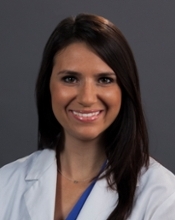

Kelsey Arnold
Alumni, Class of 2018
BS, Kinesiology
University of Michigan
Home Health Aide
Physical Therapy Aide
Home State: Michigan
Why did you select the Northwestern University PA Program?
What attracted me most to the PA Program was the opportunity to incorporate Problem-Based Learning (PBL) into my methods of learning. I had some experience with prior PBL courses and realized that although it is a lot of work, it helps to integrate the information with a deeper understanding. Now I could not imagine learning medicine any other way. My decision to attend Northwestern was further confirmed when I went to the interview and felt comfortable with the program, the faculty and the students that I met that day. The environment at Northwestern makes coming to class each day enjoyable and productive, which I don’t think can be found at many other programs.
Compared to your impressions before starting PA school, what has surprised you since enrolling in the Northwestern University PA Program?
Prior to starting PA school, I thought that I would have to put my life on hold and say goodbye to my family and friends for two years. I am pleased to say that this is very much not the case. Although there is a lot of work to be done and a lot to learn in a short amount of time, it is very possible in this program to balance life and school. I not only have time to see my family, but also to spend time with my classmates outside of academia.
What are your impressions of the PA Program curriculum?
My impression about the PA Program curriculum is that the program is designed for success. We are constantly reminded with Northwestern program statistics that we will become professional, competent clinicians just like all that have come before us. The system-based approach is one part of the curriculum that enhances the integration of our learning across our courses and helps us reach that success. Overall, it is important to trust the process of this program because it works. Additionally, since the students here at Northwestern hold themselves to such a high standard, there is no question that we will come to reach our own goals and those set by the curriculum.
What advice or other thoughts would you share with an applicant considering the Northwestern University PA Program?
Advice that I would give to those considering the PA Program is that you will not regret it. Any PA program you may choose will be challenging, there is no doubt, but at Northwestern I can say that you will have an enjoyable experience. The faculty and staff here are amazing: each with their own distinct personalities and quirks that make classes interesting and engaging. They also care about your learning and are willing to help in every possible way that they can. Your classmates are also one of the best parts about choosing Northwestern. They are some of the greatest people I know and will keep you smiling even when school becomes challenging. The program itself will give you the tools for success, but what makes Northwestern special is the positivity and team-based mentality that is incorporated on your journey to becoming a professional.
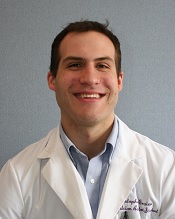

Christopher Braier
Alumni, Class of 2012
BA, Biology
Lawrence University
Why did you select the Northwestern University PA Program?
The Problem-Based Learning curriculum and reputation of the University.
How did you find your first job out of PA school?
I found my first job by way of our “career day” in March of my second year at Northwestern. We had representatives from different hospitals come to talk to us about applying for jobs. I went up and talked to one of the speakers after the presentation and told her I was interested in her field, and it eventually led to my first position out of PA school.
If you were going to do it all over again, what would you do differently (regarding the PA school experience, choosing PA school or anything at all)?
I would have taken my elective rotations in something different than my current profession. I knew I wanted to go into orthopedics, but I wish I had a better knowledge base in cardiology and/or respiratory by taking a four-week rotation in one of those subjects.
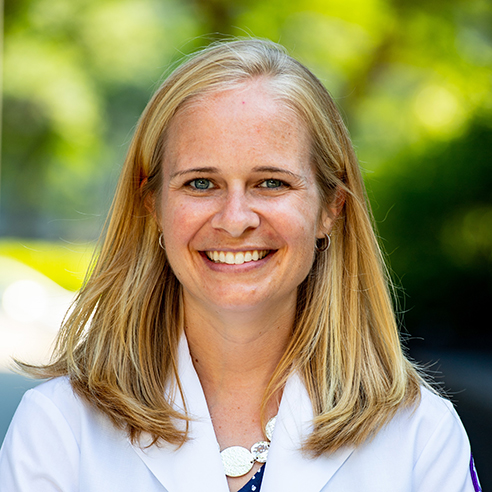

Allison Byrne
Alumni, Class of 2022
Doctor of Physical Therapy, Virginia Commonwealth University
BS Human Nutrition, Virginia Tech
Physical Therapist
Home State: Illinois
How did PBL prepare you for success during your clinical year and now in professional practice?
PBL helped me synthesize information from Didactic Year and gave it practical application that improved both my clinical and analytical skills. Alongside my classmates, I learned to be an effective member of a medical team, which has been invaluable in the clinical environment. PBL also taught me to be an efficient self-learner as I pre-pared to teach my classmates each session. This has given me the ability to operate more independently in the clinical environment and more effectively communicate information to patients, families and other members of the medical team. My didactic experience would not have been the same without PBL, and I am grateful for the vital role it played in preparing me for clinical success!
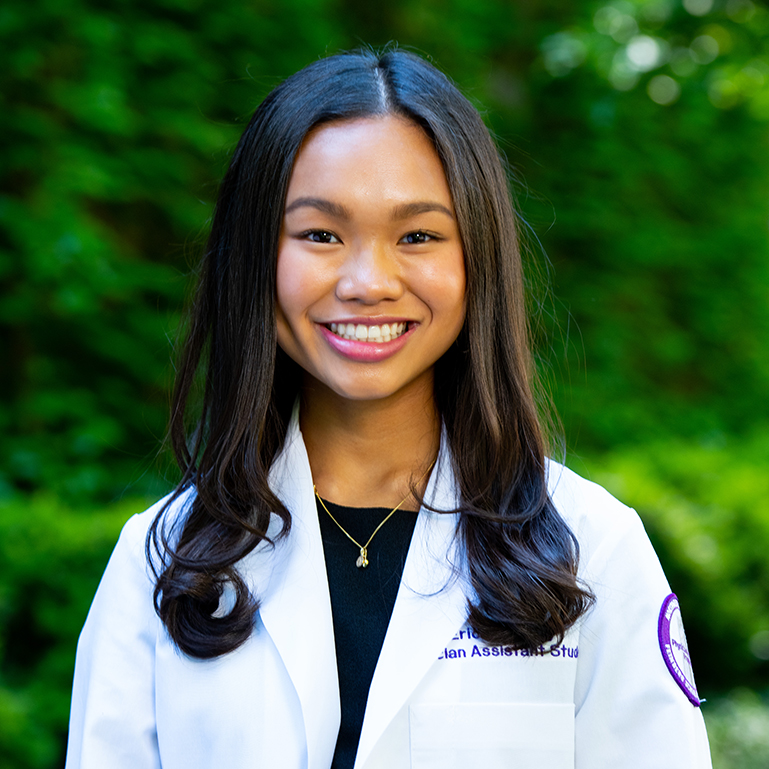

Erica Cheung (she/her)
Alumni, Class of 2024
BS Health Science
Northeastern University
Clinical Assistant (ENT), Ophthalmic Assistant
Home State: New Jersey
What advice would you share with an applicant considering Northwestern?
One piece of advice I would share with an applicant considering Northwestern is to really lean into your clinical experiences prior to PA school. Make the most of every day at work or volunteering by being inquisitive! As you set up for an in-office procedure, ask your colleagues specifics about the procedure. As you care for patients of diverse backgrounds, make a concerted effort to learn new ways to integrate cultural humility into every patient interaction. The Northwestern PA program encourages students to be self-directed, curious learners, so beginning to think in this manner prior to PA school will set you up for success not only as a Northwestern PA student, but as a practicing PA as well!
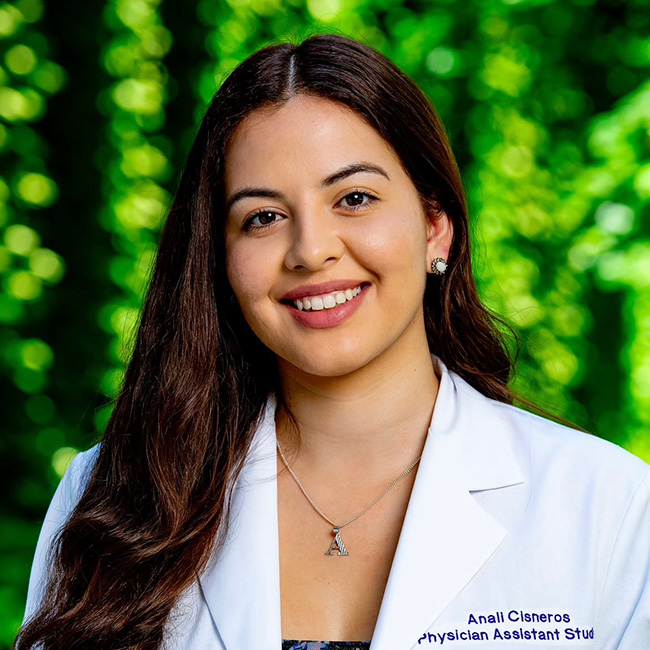

Analí Cisneros (she/her)
Alumni, Class of 2025
BA Biochemistry
Judson University (IL)
Phlebotomist, Medical Assistant (Family Medicine)
Home State: Illinois
Why did you choose to attend Northwestern?
The program stood out in a lot of different aspects. From day one, all of the staff I interacted with really made you feel like you were welcomed into a family. From the interview process until now, the faculty and staff were supportive, and you can tell that every aspect of the program has a purpose and is conducive to your education. Here at NUPA the small class size and the fostered collaborative environment is something you really benefit from as a student. I also love that we have guest lectures from experts in their clinical field teaching you the most updated and practical information they use daily. Our program is so well connected with Northwestern Memorial Hospital and the opportunities are endless. Of course, the location of our program is as good as it gets being centered right by Michigan Avenue, Navy Pier, the lakefront, and the delicious food scene that Chicago’s downtown has to offer.
What are your impressions of the curriculum so far? Favorite class?
The curriculum is well thought out and conducive to our learning. The organ system-based curriculum is such an organized way to learn that helps you to slowly put everything together. Every class on our schedule has a clear purpose and is valuable for our advancement as healthcare professionals. All of the professors are passionate about the content they are educating you on, and it truly feels like you are learning from the best. Every day I walk out of our classes with more knowledge than when I walked in, and although it can be a challenge, the excitement of all the progress and learning that happens daily is very rewarding. If I have to choose one my favorite class so far is Anatomy. I love learning about the human body and then having the opportunity to make vivid connections in the cadaver lab.
What advice would you have for an applicant considering NUPA?
Honestly, there are a lot of features from Northwestern’s PA program that you can't find in other programs. The PBL curriculum is one that prepares you to think efficiently and on your toes which helps you be prepared for clinical scenarios that you will be facing daily in the clinic. The program has strong mentorship opportunities from having a second-year student that is directly paired with you as well as a practicing Northwestern medicine PA mentor, helping you feel supported and guided every step of the way. Last but not least I would say that the energy you get from the faculty and staff here at Northwestern is unmatched and only gets better as you interact with them more and more throughout the year.
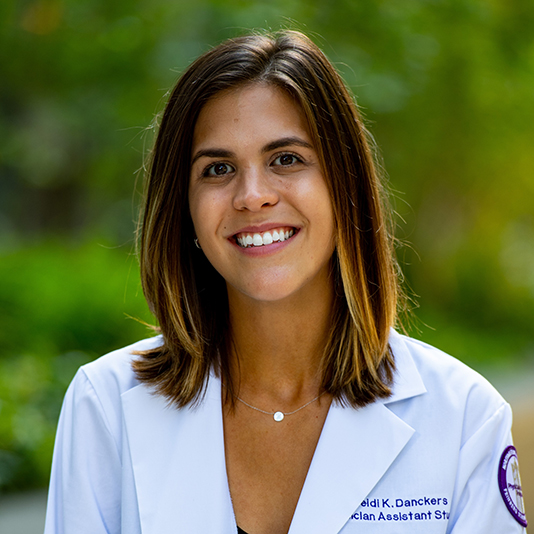

Heidi Danckers
Alumni, Class of 2022
BS Biology
Boston College
Patient Care Technician (Surgery and Vascular) Home State: Ohio
Home State: Ohio
What attracted you to the Northwestern PA Program?
I knew that Northwestern had a great PA Program when I applied, but it was my interview day that really sealed the deal. From the first moment I walked in the doors, I felt welcomed by both students and staff. Everyone was genuine, willing to answer questions and truly happy to be here. The environment is so collaborative and supportive, which is exactly what I was looking for in a program. I can confidently say that I made the right choice. My advice for applicants: approach your interviews as a two-way street. You want the school to choose you, of course, but try to picture yourself as a student at that program. You'll be spending some very formative years at whichever school you choose. If the program feels like the right fit, you really can't go wrong!
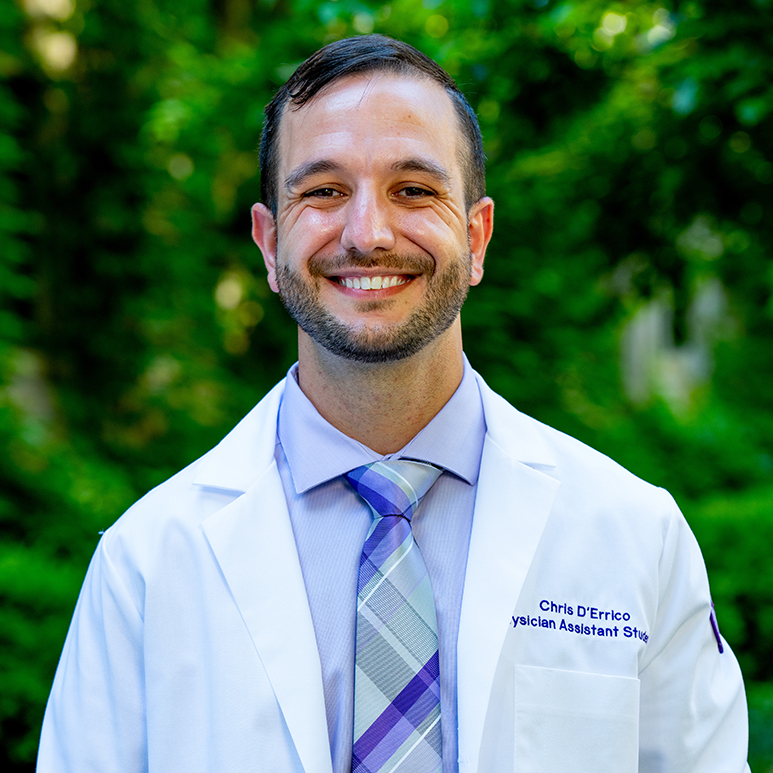

Chris D'Errico (he/him)
Alumni, Class of 2024
MS Sports Medicine
University of Pittsburgh
Athletic Trainer, Concussion Clinic Coordinator
Home State: North Carolina
What are your impressions of the curriculum?
Our curriculum is challenging and taught by experts on each individual subject. The pace is much faster than what you encounter at the undergraduate level, so come ready to work! Our professors and guest lecturers do an amazing job sharing their knowledge and are genuinely invested in making you an excellent clinician. The PBL curriculum encourages you to think for yourself, develop clinical reasoning, become comfortable teaching others, and learn how to find and appraise medical literature. The PBL coursework also develops strength through teamwork in small groups, which is a critical skill for PAs in the workforce.
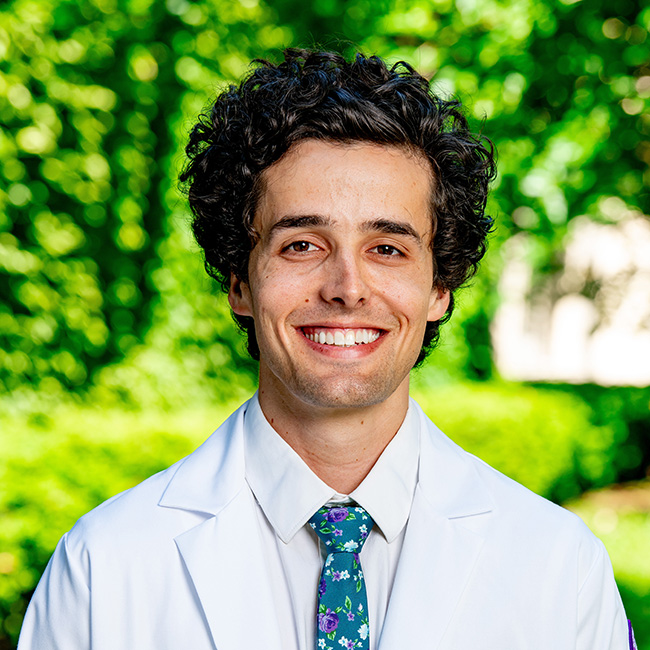

David DiMauro (he/him)
Alumni, Class of 2025
BS Biology
University of Florida
Advanced EMT, Emergency Department Technician
Home State: Florida
Why NUPA?
On my path to becoming a PA, I hoped to develop confidence in my own medical knowledge and clinical decision-making, while retaining the humility to know when I should turn to my physician colleagues for guidance. At the Northwestern University PA Program, I was excited by the opportunity to take responsibility for my own learning and to refine my problem-solving skills during the Problem Based Learning (PBL) sessions, while beginning to work side by side with MD students, PA students, and medical professionals at the Education Centered Medical Home (ECMH), all during the didactic year. And though I was originally drawn to NUPA because of these unique educational opportunities, it was the welcoming, supportive, and inspiring admissions team that fully convinced me that this was going to be the program I chose to entrust with my PA education.
How would you describe the class culture/vibe at Northwestern?
Luckily, I have found that the class culture at Northwestern has been overwhelmingly collaborative and supportive. From the top down, I truly believe that the faculty, second-year students, and our cohort want to see everyone succeed. Mentorship is a strong theme at NUPA, and I have felt no shortage of advice, reassurance, and confidence from my PA-S2 “big sibling”, my faculty advisor, or my friends within the cohort. Most importantly, I love that I can trust my fellow classmates to be my educators in PBL, because everyone has taken seriously their responsibility for presenting quality educational presentations for the benefit of the whole group. Without a doubt, I know that I can rely on my classmates to positively enhance my academic experience at NUPA, and that I don’t have to worry about competition getting in the way of growth.
What are your favorite things about Chicago?
Chicago is definitely the largest metropolitan area I have ever lived in, and I am loving it so far! I live about five miles from campus, and I appreciate that the bike and train infrastructure has made it no problem, and even sometimes quite pleasant, to get to and from class. Living in a West Town neighborhood and going to school in Streeterville has afforded me the ability to appreciate many different nooks of the city. I’ve had the opportunity to sample many of the restaurants, live music venues, farmer’s markets, museums, and greenspaces both near and far, and I’m happily overwhelmed knowing that I will never exhaust of the experiences that Chicago has to offer.
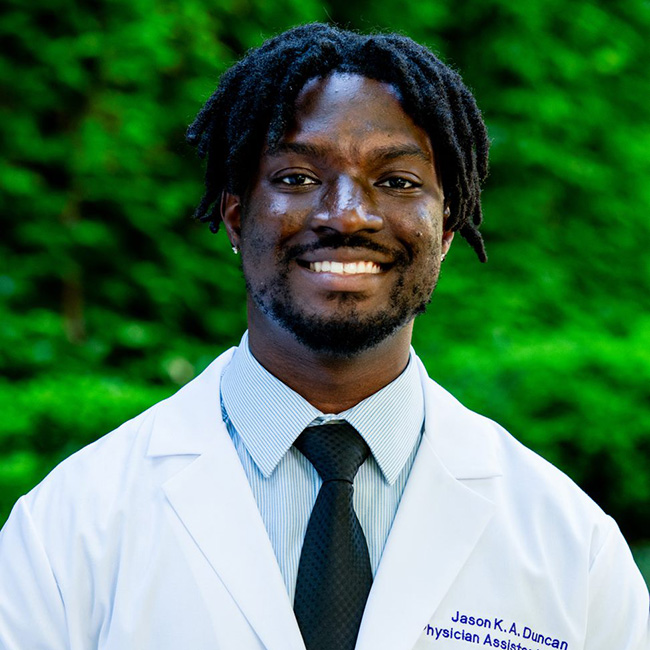

Jason Duncan (he/him)
Alumni, Class of 2025
BS Neuroscience
University of Illinois at Chicago
Rehabilitation Aide
Home State: Illinois
Why NUPA?
I was drawn to the Northwestern PA program for several reasons, a major one being its emphasis on training PAs who will provide high quality patient-centered care to diverse patient populations, which aligns with my goals as a future clinician. I wanted to attend a program where I would be challenged to understand not only the physiological aspects of medicine, but also the social determinants of health, and how they impact the lives of each patient both inside and outside of the clinic. I was also drawn to the Education-Centered Medical Home program, which gives me the unique opportunity to work with a team and see patients in a clinical setting on a regular basis throughout the program.
What is an average day like for you?
An average day for me is mostly spent in class or studying with my classmates in small groups. There are several great spots to study on campus, and some great areas to take breaks as well–you might catch me playing the keyboard in the student lounge every now and then!
What are your impressions of the curriculum so far? Favorite class?
So far, my favorite class has been patient assessment. I love having the opportunity to apply what I’ve learned in class by practicing my clinical skills with my classmates and standardized patients. Learning these skills is one of the most important things to do as a future clinician and our instructors do a great job at giving us the guidance we need!
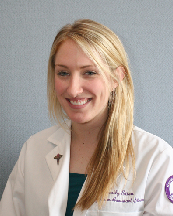

Emily Eiten
Alumni, Class of 2012
BS, Kinesiology
University of Illinois at Urbana-Champaign
Why did you select the Northwestern University PA Program?
In addition to going to school between the Mag Mile and Lake Shore Drive, Northwestern Feinberg School of Medicine has an exceptional reputation.
What aspect of the Northwestern University PA Program best prepared you for your current position?
Problem-Based Learning (PBL): At first I was hesitant for this form of learning and was even avoiding PA programs that offered PBL; however, my interview convinced me otherwise. PBL made the coursework exciting, encouraged team skills and, most importantly, helped me retain information because I was responsible for teaching my classmates. I can still recall our first case.
How did you find your first job out of PA school?
Mayo Clinic BMT saved my father’s life; therefore, I have the utmost respect for this institution. When I saw a job posting online, I immediately applied and the rest is history.
If you were going to do it all over again, what would you do differently (regarding the PA school experience, choosing PA school or anything at all)?
I would recommend choosing your elective rotations very carefully; pick a weakness, not a strength and become better at that particular specialty. Whatever you decide to do, an additional few weeks in cardiology or pulmonary will help you.
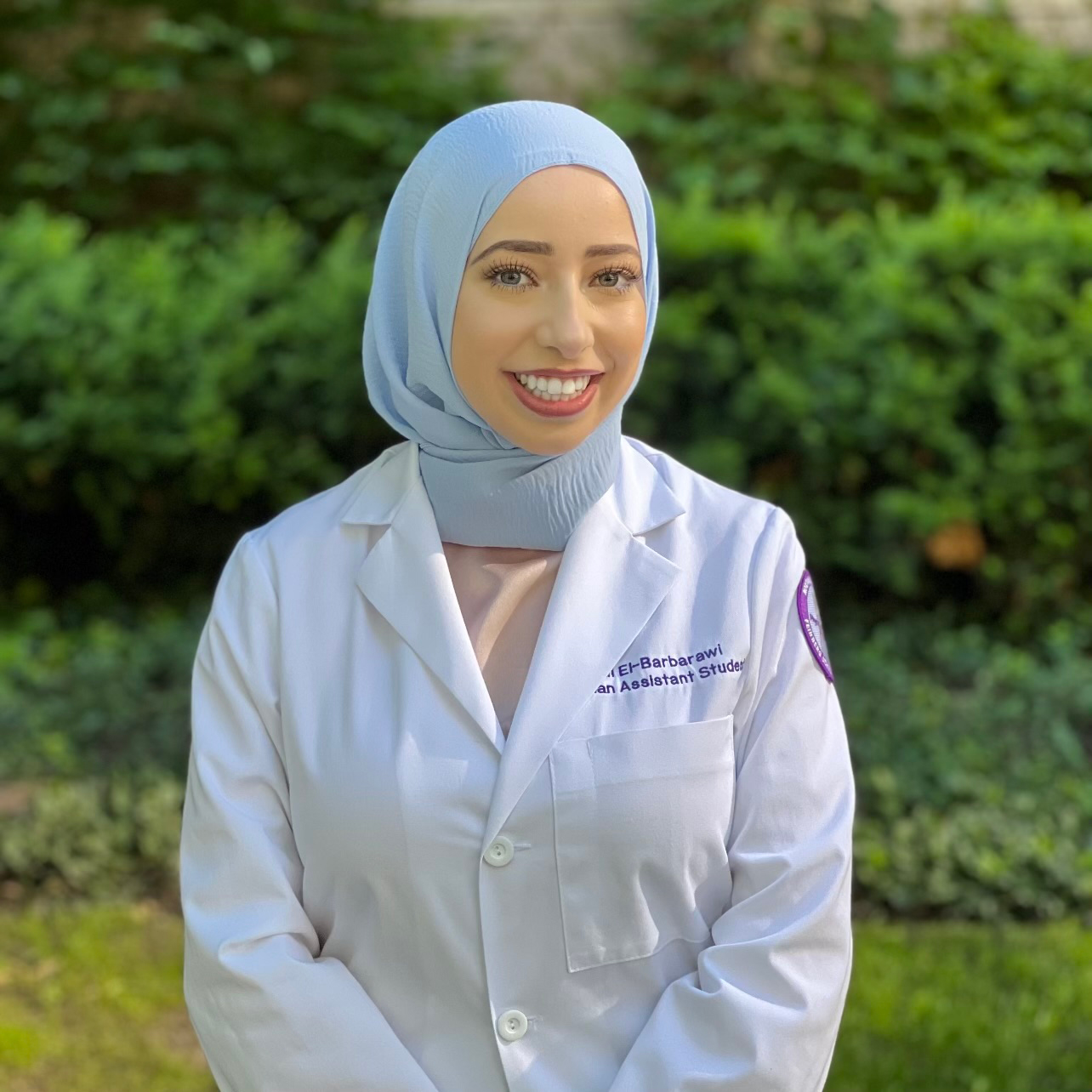

Dalal El-Barbarawi (she/her)
Alumni, Class of 2024
BS Biochemistry
Roosevelt University (IL)
Medical Assistant (Immediate/Primary Care)
Home State: Illinois
What are your impressions of the curriculum?
Northwestern’s PA Program is truly a gem. By the end of each Problem-Based Learning (PBL) week, I am extremely surprised at how much I have learned and how tangible the information is to grasp. I am able to apply the clinical knowledge instead of just reading about it. PBL is what sets the curriculum apart from many other programs. You learn to think critically and problem solve when presented with a patient’s chief complaint. You learn to take an adequate history, perform the proper work-up, and develop a diagnosis and treatment plan. I cannot imagine a better way to prepare for becoming a clinician. We also receive amazing lectures from Northwestern clinicians who use their unique perspectives to really help solidify and bridge our clinical and scientific understanding. In addition, it is evident how much the faculty cares about us and our well-being. Despite the rigor of PA school, the faculty always make an effort to provide support in any way they can. Our cohort is also really close and we all work to help each other out, which supports our learning.
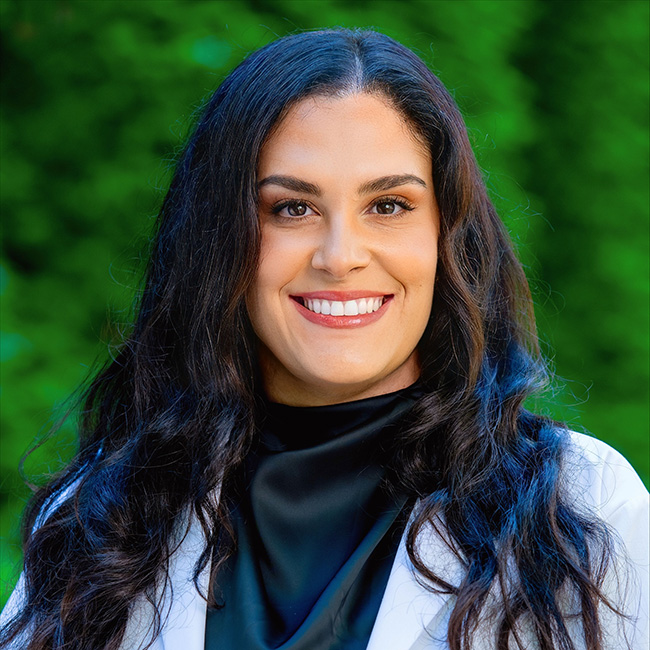

Jen Elisco (she/her)
Alumni, Class of 2025
MS Speech, Rush University (IL)
BS Speech, University of Illinois at Urbana Champaign
Speech-Language Pathologist
Home State: Illinois
Tell us about your experience in PBL.
PBL has challenged me to synthesize knowledge learned in the classroom by immediately applying it to real patient scenarios, a truly unmatched learning experience. I leave our PBL sessions in amazement of how much I learned in such a short time. Aside from that, it's been incredible to have the opportunity to collaborate with my classmates and form close relationships. I don't know where I'd be without PBL!
Why NUPA?
Where to start?! Having a small class size and the opportunity to learn from expert clinicians at an academic medical center were important to me, but my incredible interview experience really drew me in! It was clear to me from the start that the faculty and community at NUPA are highly invested in the success of their students, and it's living up to the hype!
Compared to your expectations coming in, what has surprised you since starting at Northwestern?
I didn't anticipate having the opportunity to learn from so many clinicians who are renowned in their fields through guest lectures! These have been some of my favorite lectures we've had, and I really think they help us to further integrate our classroom and PBL learning to prepare us for patient care. I'm also so happy to have made incredible friends so far!
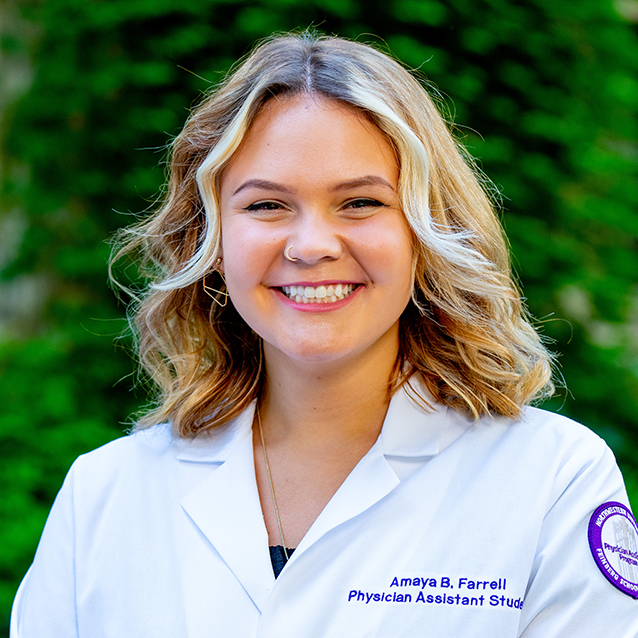

Amaya Farrell (she/they)
Alumni, Class of 2024
BS Biology
University of Michigan - Ann Arbor
Certified Nursing Assistant
Home State: Michigan
What attracted you to the Northwestern PA Program?
For me, Northwestern had it all! I loved the concept of Problem-Based Learning (PBL), a small class size, access to a wide range of clinical sites, being in Chicago, the list goes on! Of all the great things about Northwestern PA program, what really compelled me to apply was the mission statement. I felt that my own personal mission statement greatly overlapped with the goals and ideology that the program holds. A lot of my experience studying Medical Anthropology in undergrad made me inclined to find a program that went farther than just training me to be a PA; I wanted to attend a school that would help me be healer and advocate for patients. I love seeing our mission statement followed through in actions like the Education Centered Medical Home (ECMH) and the Behavioral and Preventive Medicine course. I feel that Northwestern is devoted to creating healthcare providers who can unlearn their own biases and do more in the communities they practice in, and I wanted to be a part of it!
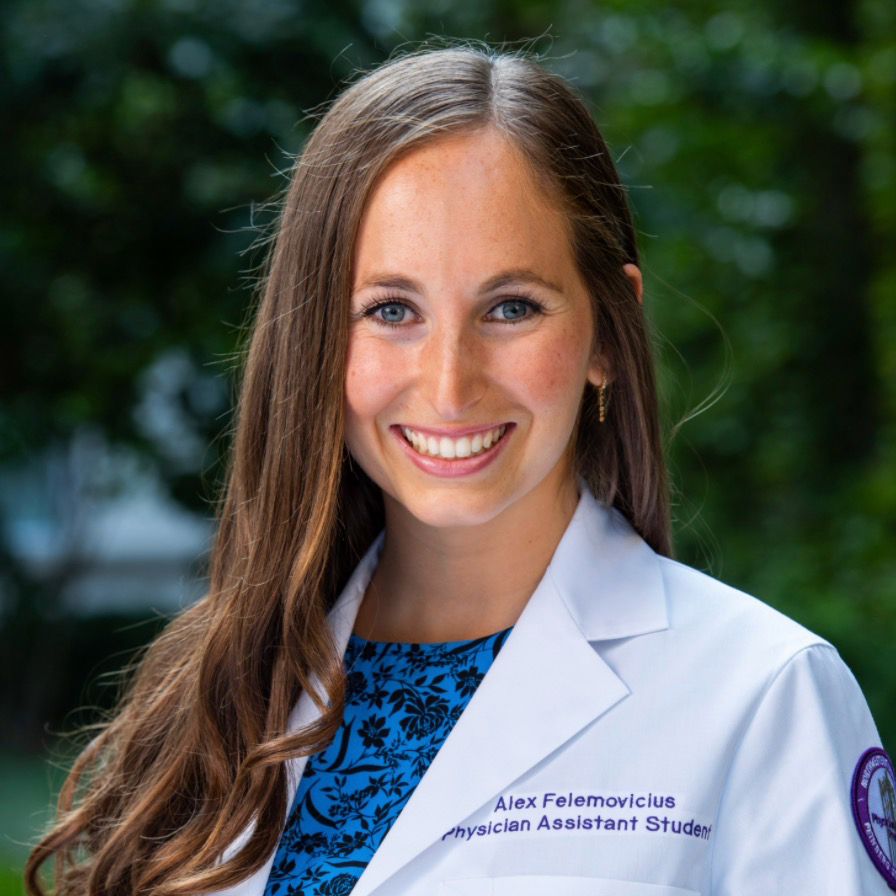

Alex Felemovicius (she/her)
Alumni, Class of 2023
BS Human Development
University of Wisconsin - Madison
Medical Assistant (Orthopedics/Rheumatology)
Home State: California
How has PBL prepared you for success during clinical year?
Without a doubt, Problem-Based Learning (PBL) has been the single most important factor in my education thus far. Being treated like a clinician from day one forces you to learn how to think, which is one of the most valuable skills in medicine. In other words, PBL trains you to learn to ask appropriate questions, teaches you how to think outside the box, and most importantly, forces you to collaborate with peers to reach a final diagnosis. PBL does a good job of taking you out of your comfort zone and challenging you in ways that make you grow. I would also say that PBL teaches you how to sort through complex medical literature and make it relevant. This is an important skill going into clinical year and beyond since medicine is an ever-changing, research-dominated subject.
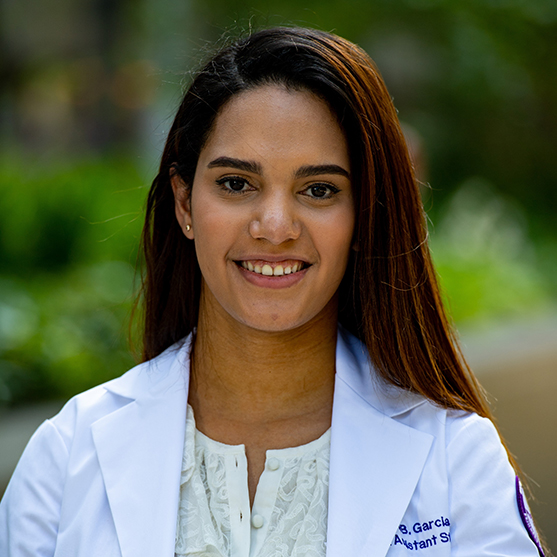

Rosalia Garcia
Alumni, Class of 2022
BA Psychology
Florida International Univeristy
Pediatric ICU Assistant
Home State: Florida
What are your impressions of the PA Program curriculum?
The Northwestern PA Program offers an immersive curriculum that, from day one, prepares students to become well-rounded providers. The system-based approach allows us to focus on one organ system at a time and thoroughly review all aspects of each, including the anatomy/physiology, patient assessment, laboratory medicine, pharmacotherapy and preventative medicine. The PBL curriculum, which goes through patient cases every week in small groups, sets the stage for the effective development of deep critical thinking skills, as well as emphasizing the importance of a team-based approach. In addition, I believe it was very progressive of the program to include Medical Spanish in their curriculum, to address the significant patient population of Spanish speakers in Chicago. Overall, I believe the PA Program curriculum reinforces life-long learning and encourages students to take ownership of their own education. I now realize that Northwestern’s unique approach proved extremely valuable when adapting to real-life situations. I consider myself lucky to have chosen Northwestern.
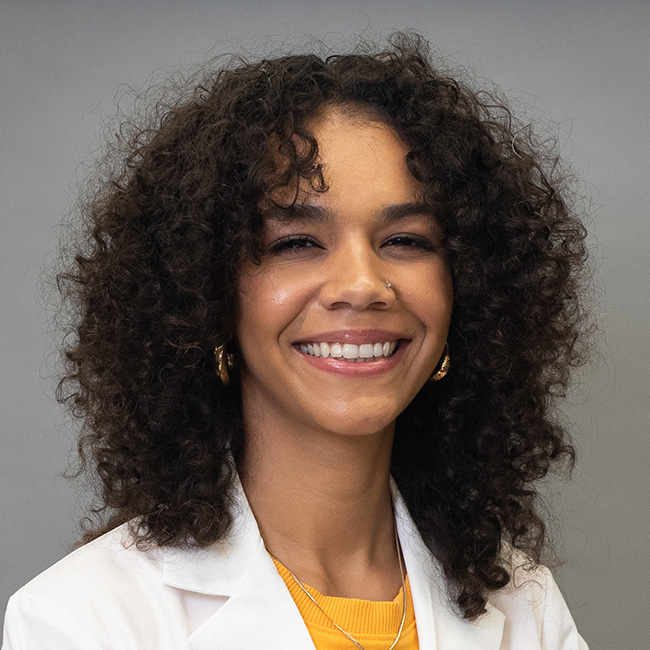

Ariana Gladieux-Carter (she/they)
Alumni, Class of 2025
BA Neuroscience
Oberlin College (OH)
Certified Nursing Assistant, In-Home Caretaker, Athletic Training Aide
Home State: Wisconsin
Compared to your expectations coming in, what has surprised you since starting at Northwestern?
Being from both a low income and first-generation background, I was not sure what to expect going into a master's program. While the days have been long and the studying demanding, I have not felt as alone as I thought I initially would. While my peers come from all different backgrounds, I truly feel like both my class, the classes above, alumni and professors all have my best interests at heart. I could not have hoped for more out of a PA program.
Why NUPA?
NUPA hit all of the key things I was looking for in a PA school! From proximity to my family, opportunities presented by the school's location in downtown Chicago, and to the unique PBL learning style I was familiar with from my days as an undergrad. Coming from a smaller suburban town in Wisconsin, and then a rural undergraduate university, I wanted to make sure I would could get to know my peers, as well as had access to my professors. NUPA has managed to hit all of the above, and many more for myself.
How would you describe the class culture/vibe at Northwestern?
As a class, we spend most of our waking hours together. While many may find that daunting, I think that has made my experience (and my classmates) more fruitful and fulfilling. Our unique backgrounds and strengths are highlighted in our small cohort size, and we learn from each other daily. Along with this, we have shown solidarity in our failings and success. PA school is challenging, but having others to talk things out with, fall back on and share success with makes it easier.
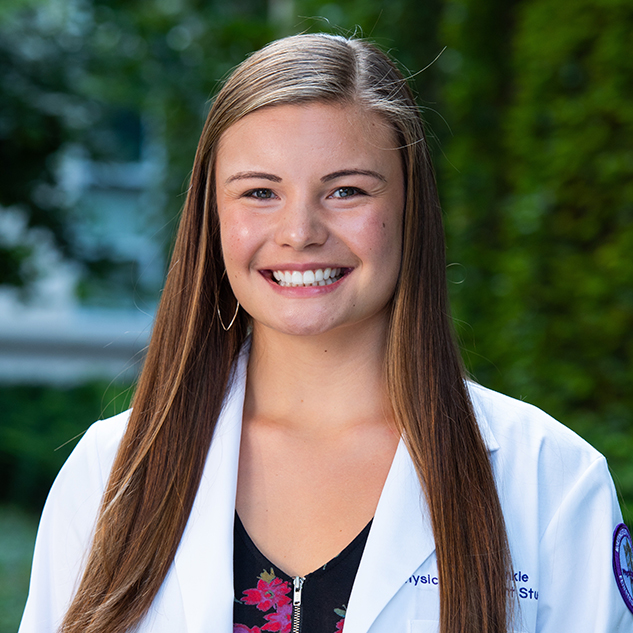

Mickayla Hinkle (she/her)
Alumni, Class of 2023
BS Biology
Duke University
Patient Care Assistant
Home State: Minnesota
Thinking back to your expectations about what the clinical year would be like, what has surprised you most now that you are taking care of patients every day?
During the didactic year, there was a steep learning curve. I was immersed in the curriculum, and I was looking forward to applying all the knowledge I accumulated over the first year. My clinical experience this year has reinforced the concepts I learned—it has also been so rewarding taking care of patients daily. All the hours I spent learning various medical concepts and reviewing slides have paid off. Patients have been so receptive to having another member of their healthcare team. You would be surprised how many patients have asked me to explain the basic pathophysiology of the condition they are experiencing or the progression of their recovery. It has been rewarding to contribute to their medical understanding and health literacy.
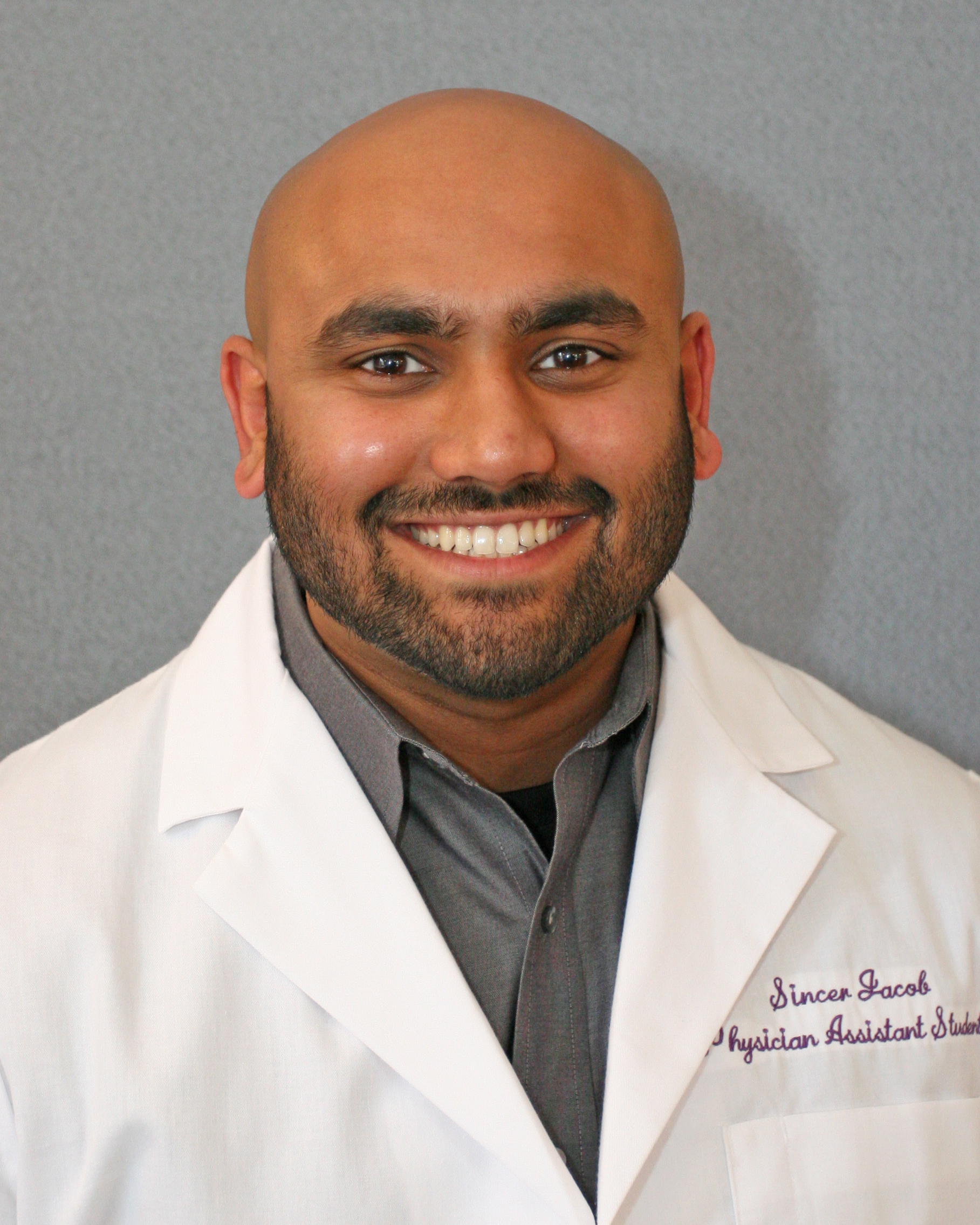

Sincer Jacob
Alumni, Class of 2013
BS, Respiratory Therapy
Ohio State University
Respiratory Therapist
Why did you select the Northwestern University PA Program?
A number of factors went into selecting different programs; specifically the reputation of the program, opportunities and board pass rates. Additionally, being in Chicago only added to endless opportunities within the program.
What aspect of the Northwestern University PA Program best prepared you for your current position?
One thing that distinguishes Northwestern’s PA Program is the variety of rotations offered. I completed rotations at major academic medical centers, federal hospitals, community hospitals and even private practices. The variety of patients from inner-city to rural populations prepared me well to practice medicine.
What advice or thoughts would you share with an applicant regarding work or involvement in the PA profession after PA school?
Research. Research is imperative to success. Know expectations, set goals and make plans to accomplish those goals.
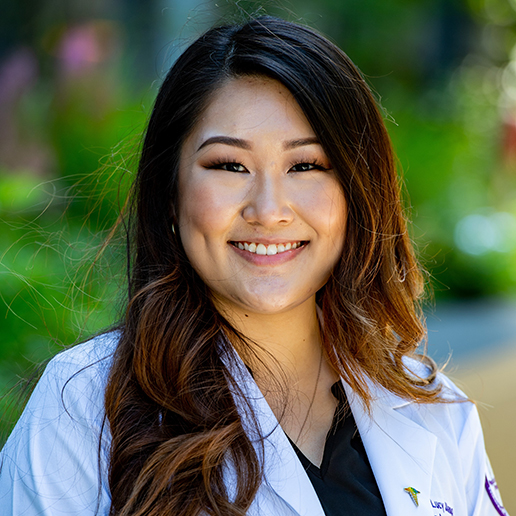

Lucy Jiang
Alumni, Class of 2022
BA Neuroscience
University of Michigan – Ann Arbor
Patient Care Technician
Home State: Michigan
How did PBL prepare you for success during your clinical year and now in professional practice?
A unique aspect of Northwestern’s curriculum is its emphasis on PBL, a method of learning that allows students to apply the knowledge they have gained throughout Didactic Year to various clinical scenarios in collaboration with fellow classmates. The way in which students work through a PBL patient case is comparable to how a real patient would be approached — you learn how to formulate a differential diagnosis, conduct an interview, order appropriate diagnostic testing, create a treatment plan and present the patient. Not only has PBL allowed me to advance my critical-thinking and self-directed learning skills, but it has made me a stronger team member and more effective communicator. PBL truly trains you to think and work like a clinician and prepares you to become a confident and successful clinical student and future PA. I cannot imagine what my medical training would have been like without PBL!
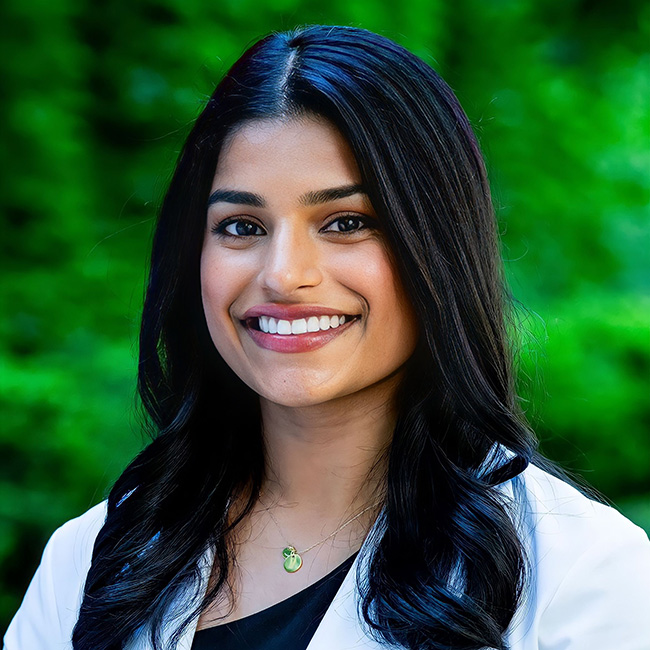

Priya Khosa (she/her)
Alumni, Class of 2025
BS Behavioral Science/Psychology
University of Michigan – Dearborn
Director of Hospitality and Wellness Coordinator (Independent and Assisted Senior Living)
Home State: Michigan
Why NUPA?
NUPA was my first choice for so many reasons. Seeing how passionate the current students and faculty were about the program only furthered my interest. The PBL curriculum truly stood out, and as someone who enjoys discussing through topics with others, I was sure it was how I wanted to learn during didactic year. Being at an academic medical center in the heart of a city was also important to me. I appreciate that we get the opportunity to learn and practice alongside the very population I hope to serve, as well as be taught by professionals you could have the chance to work alongside in the future.
What is an average day like for you?
I am an early bird for sure, so if I can get a morning workout before class, I always try to! I am obsessed with my Nespresso, so I don’t leave my apartment without a cup of coffee before heading to the bus stop! Since I live in West Loop, my commute is just a short bus ride into Streeterville for classes. After class, I usually head to the library a few days out of the week for a change of scenery during the afternoons before heading back home. I really enjoy cooking and attempting new recipes, so I will try to do that as much as possible to round out the evenings and mix in some Netflix too if I can!
What are your impressions of the curriculum so far? Favorite class?
There are times when it starts to feel overwhelming, but then you remember to “trust the process” and usually by the end of the week, whatever confusion I had is cleared up or explained in-depth during a lecture. It is a lot of information, but nothing feels better than finally figuring out the tough concepts with your classmates and looking back at how much you’ve already learned! I think Clinical Laboratory Medicine might be my favorite class – It’s really nice to be able to connect what you’re learning in all your other courses and to see how it will apply in clinical practice moving forward.
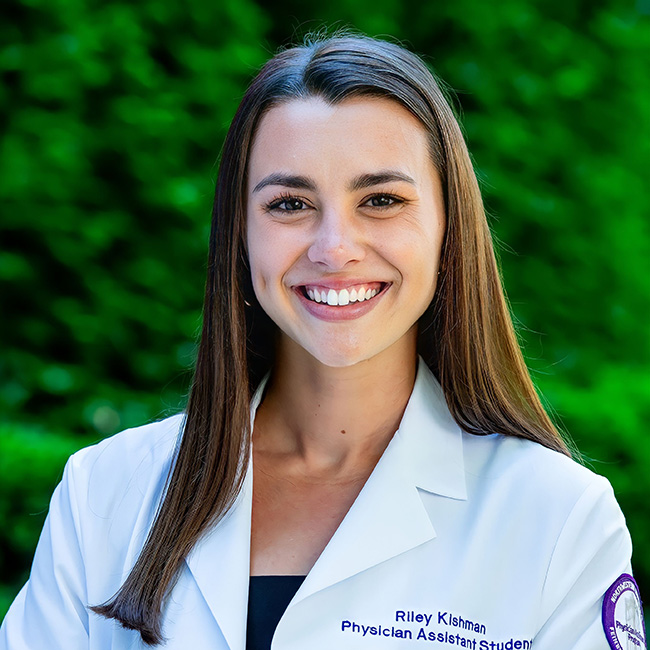

Riley Kishman (she/her)
Alumni, Class of 2025
BS Health Science
Purdue University – West Lafayette
Critical Care Nursing Technician, CNA
Home State: Michigan
Why NUPA?
I wanted to go to Northwestern for so many reasons, but what drew my attention the most was the problem-based learning (PBL) style curriculum! I loved the idea of working with a small group of classmates each week to solve patient cases while learning from the amazing faculty. I come from a sports background, and this style of learning is similar to working with teammates to reach a common goal which I really enjoy. In addition to the PBL curriculum, I liked the small class size at Northwestern because I can get to know each of my classmates and faculty members very well. Additionally, having the ability to complete 4 elective rotations in such a diverse city within a highly ranked academic medical center was a huge bonus because there are so many opportunities to learn from high-quality providers.
Compared to your expectations coming in, what has surprised you since starting at Northwestern?
I was nervous before starting at Northwestern because of what I had heard about PA school in general and how difficult it is. I was pleasantly surprised once I started, though, and the faculty and classmates have exceeded my expectations! We truly are a family here at Northwestern, and I have loved getting to know my classmates and collaborate with them as well as the faculty. I did not know what to expect in terms of the curriculum, but I have surprised myself with how much I have learned in such a short amount of time. The faculty do a great job at teaching us critical thinking skills and help us reason through difficult cases which is great practice for when we start seeing patients.
What are your favorite things about Chicago?
I love how Chicago has something for everyone to enjoy! I am an active person who enjoys the outdoors and loves water, so summer in Chicago has been amazing. I love walking/running along the lakeshore path and walking through Lincoln Park. I am a short walk from the Lincoln Park Zoo and the Lincoln Park farmer’s market which is a huge bonus! I have visited many of the museums, eaten at great restaurants, explored various neighborhoods, and attended Cubs games, but there is still so much more I want to do! The beauty about Chicago is you will never run out of new things to try. I am excited to continue exploring the city in the years to come.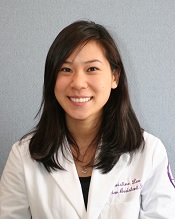

C. Christine Lee
Alumni, Class of 2012
BS, Brain, Behavior and Cognitive Sciences
University of Michigan
Why did you select the Northwestern University PA Program?
I chose Northwestern for numerous reasons. First, the PA Program is situated in the downtown Chicago medical campus. The students have access to some of the most advanced medical resources (e.g., patient simulation lab) and have the opportunity to train at a nationally recognized healthcare system. With the strong reputation Northwestern University carries, I knew graduating from the program would help me during my job search process. Lastly, after my interview with one of the faculty members, Ms. Kris Healy, I was impressed by the program's commitment and dedication to reaching out to the underserved populations.
How did you find your first job out of PA school?
Persistence. I knew I was interested in dermatology and that getting a job straight out of PA school would be difficult. During my clinical year, I completed an elective rotation in dermatology and shadowed a dermatology PA during my spare time. I was also very active in the Illinois Society of Dermatology Physician Assistants and began networking through the organization. After applying to every dermatology job posting I saw and sending out my CV to all the dermatology offices in the Chicagoland area, I finally landed my dream job.
If you were going to do it all over again, what would you do differently (regarding the PA school experience, choosing PA school or anything at all)?
I wish I could have been more involved with the student leadership. Don't be scared like I was. I was concerned that I would not be able to balance schoolwork and holding a leadership position. Looking back now, it would have been doable.
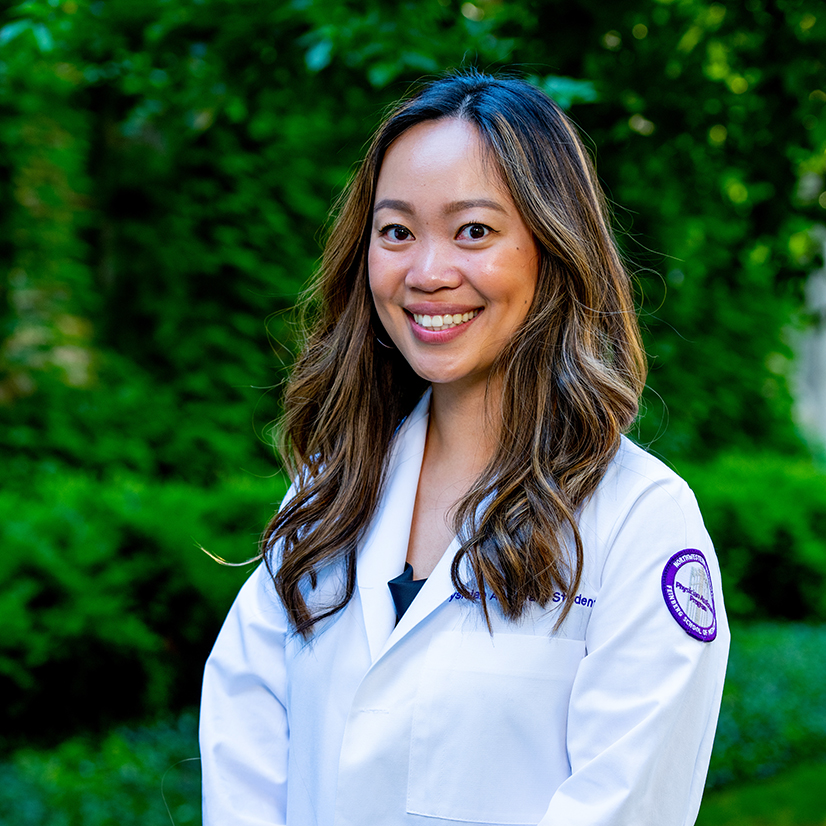

Joy Li (she/her)
Alumni, Class of 2024
BS Chemistry
University of California – San Diego
Emergency Department Technician, Medical Assistant (Family Medicine)
Home State: California
What attracted you to the Northwestern PA Program?
My interview with Northwestern was what sealed the deal for me. It was the only interview where I left feeling more confident in myself than when I arrived. It is natural to have some pre-interview jitters, but everyone involved in the interview day at NUPA did a fantastic job making me feel welcomed so that I could relax and show them my true self. Both the students and the faculty were so friendly, genuine, and approachable, and I still feel supported by them now that I am a student here. All my interactions with the faculty members have left the impression that I am not just a statistic but someone with unique strengths and the potential to become a great PA. I couldn’t be happier that Northwestern and I chose one another!
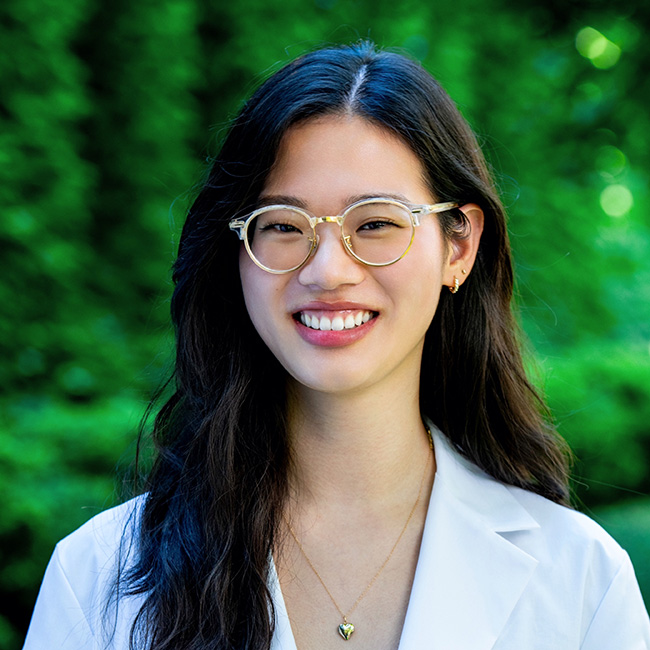

Jasmine Li Chen (she/her)
Alumni, Class of 2025
BS Biology
University of Michigan – Ann Arbor
Medical Assistant (Dermatology)
Home State: Puerto Rico/Illinois
Why NUPA?
Ever since high school, Northwestern has been my dream school. Although the list could go on, I chose NUPA because of its PBL curriculum, small class size, 4 elective rotations, amazing location in the heart of Chicago, medical Spanish course, and affiliation with one of the best hospitals in the nation. I also had the most wonderful interview and tour experience with friendly and welcoming faculty and students which helped seal the deal!
What advice would you share with an applicant considering the Northwestern University PA Program?
Start preparing as early as you can! This includes making sure you have all of the required prerequisite courses, patient care hours, and knowing NUPA's goals and mission to make sure the program is a good fit for you. I was not aware of this when I applied, but I would also consider applying for Northwestern Medicine's Pre-PA Internship. Interns have the opportunity to sit in on lectures and a PBL session. Finally, try to relax as much as you can during the interview. They truly just want to get to know who you are as a person!
Tell us about your experience in PBL.
Although PBL was a bit of a rollercoaster ride in the beginning, I've come to appreciate it for helping me to continue developing my critical thinking, teamwork, and communication skills. Since we look at a patient case every week, I am reminded of how the knowledge and skills we learn in lectures and lab are applicable in real-life situations and scenarios. Researching topics and teaching them to fellow classmates also helps to more actively engage with and demonstrate a deeper understanding of what we're learning.
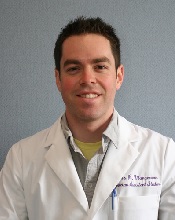

James Mangerson
Alumni, Class of 2012
BS, Nuclear Medicine Technology
University of Wisconsin - La Crosse
Why did you select the Northwestern University PA Program?
I chose the PA Program because I had been working in the NMH system for a few years and knew both the reputation of Feinberg as well as the quality of the University as a whole. Regardless of being in the first class or not, which had inherent risk, I knew that being at such an esteemed institution I would be well educated and prepared at the highest level. And you can’t beat classes on the shores of Lake Michigan either.
What aspect of the Northwestern University PA Program best prepared you for your current position?
The single most important aspect that prepared me was the expectation for excellence. The program championed high expectations to perform at the highest level as well as represent a new program in the Chicagoland area. If we weren’t prepared for a clinical day or didn’t score well on national exams, it reflected poorly on a program that we were directly responsible for shaping. That being said, Northwestern gave us endless educational resources within the medical school that enabled us to succeed.
What was the biggest adjustment moving from PA school to your current position?
The most difficult part of the transition from student to practice was with confident decision-making. As a student, there is always someone superior to you that reviews your notes, assessment and plan, but as a practicing PA there is a level of autonomy that demands not only knowledge and compassionate decision-making but also confidence, which is difficult to develop.
How did you find your first job out of PA school?
I did my final rotation, an elective, at the Medical College of Wisconsin in Cardiothoracic Surgery and was hired before the end of the rotation.
What advice or thoughts would you share with an applicant regarding work or involvement in the PA profession after PA school?
I think the best initial step is to be selfish; concentrate first on your immediate position as a provider and get through your first year as a PA. Learn as much as possible about your field and yourself in that field. Once you begin to feel confident and see some real success as a healthcare provider, then start to transition into leadership and involvement. You can’t be a good leader without a strong clinical base.
If you were going to do it all over again, what would you do differently (regarding the PA school experience, choosing PA school or anything at all)?
Wouldn’t change a thing.
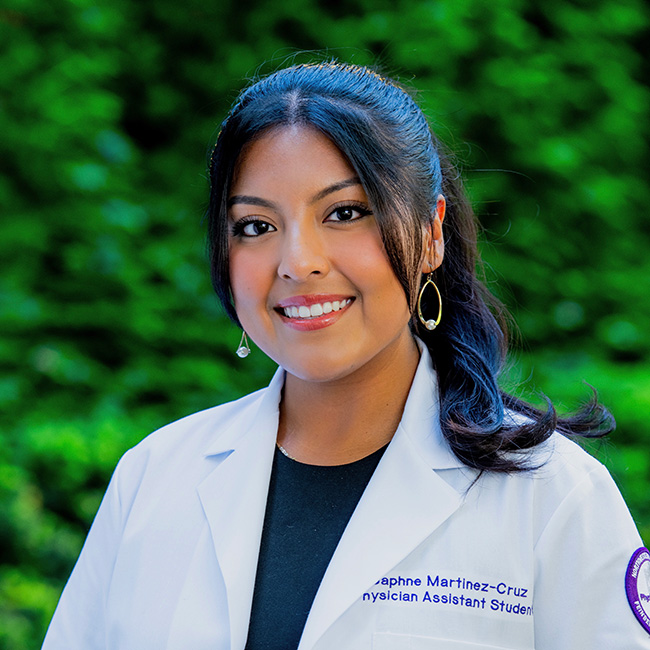

Daphne Martinez-Cruz (she/her)
Alumni, Class of 2025
BS Nutrition
University of North Carolina - Chapel Hill
Certified Nursing Assistant
Home State: North Carolina
Compared to your expectations coming in, what has surprised you since starting at Northwestern?
Prior to starting PA school, I was not sure of what expectations to come in with. I came from a very large university, where it was harder to form relationships with peers and faculty. It was even more difficult to reach out for help when needed. However, coming to a program with a smaller class size has been a game-changer. The collaboration between students and faculty brings a strong sense of community. Additionally, the faculty shows how much they truly care for the success and wellbeing of their students. Having faculty reach out to you to discuss progress or performance is something I didn’t realize I appreciated very deeply. PA school can be difficult at times, so knowing that everyone around you is there to support you is reassuring to your decision to attend that program. NUPA has exceeded my expectations I didn’t know I had, and I am happy with the choice I made in coming here.
Tell us about your experience in PBL.
Prior to coming to NUPA I had no experience in Problem-Based Learning (PBL). During the application process I read about other students enjoying this style of learning, so it made me eager to learn more about it. Now having experienced PBL, I recognize it as one of the most essential methods of learning in my PA education. It allows me to put into practice what I am learning in lectures while also encouraging me to think beyond the box. It serves as a reminder of how much I have learned in a short period of time, while also allowing me to see opportunities of growth in my knowledge. It also prepares us to work in teams for the evaluation, diagnosis, and treatment of a patient, much like the interprofessional work that will occur in the healthcare setting. Overall, I feel very fortunate to have the opportunity of attending a program where PBL is such an integral part of the curriculum.
Why NUPA?
I chose NUPA because I found that it embodies the values, missions, and goals I want in a program that will one day help me become a successful PA. The program not only focuses on its students through an academic lens but also holistically which results in a diverse cohort. This shows me that not only academic success is valued but also individuality. Secondly, the quality of education is remarkable. Problem-based learning enforces the critical thinking skills needed for our future careers as physician assistants. Furthermore, the IPE activities throughout the program are also points I found to be distinct and appealing. Working directly with students of other professions is the best way to prepare us for the field. The resources the program has in regards to well-established hospitals available for the rotational year are great sources of opportunities. However, what truly set my decision in stone was my experience with the faculty and alumni during my interview. Everyone made me feel very welcomed, comfortable and seen. I didn’t feel like just another applicant to interview, they truly wanted to get to know me as a person and see if we were a good fit. Coming to NUPA was the best decision I could’ve made!
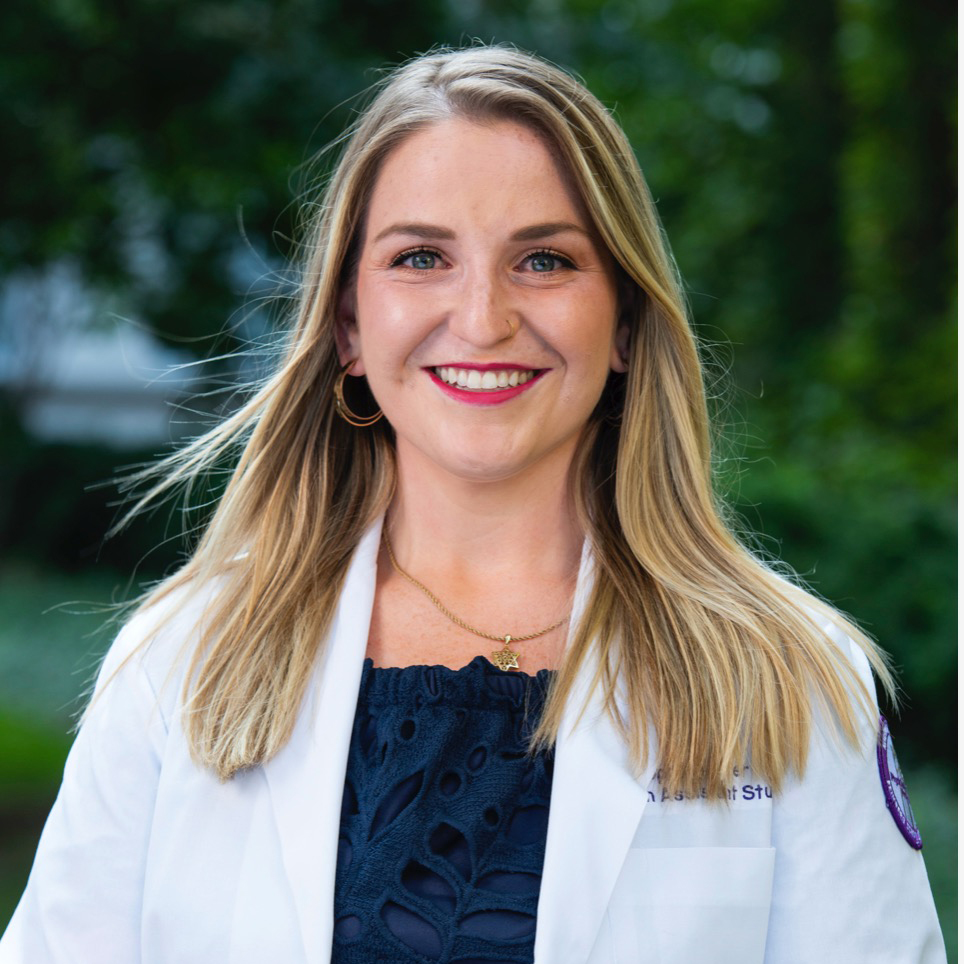

Sophie Nadler (she/her)
Alumni, Class of 2023
BS Molecular Biology
California State University – San Marcos
Emergency Department Technician, Certified Nursing Assistant
Home State: California
What has the transition been like between the didactic and clinical years of the program?
SO GREAT. It is so nice seeing patients every day and applying what I learned during my first year. I have learned so much in my first two rotations in such a short period of time. Building on my foundation from didactic year has made it so much easier to further my learning—to better understand diagnoses and how to treat patients. It has been an easy transition and I feel like I have made a huge difference in so many patients’ lives already!
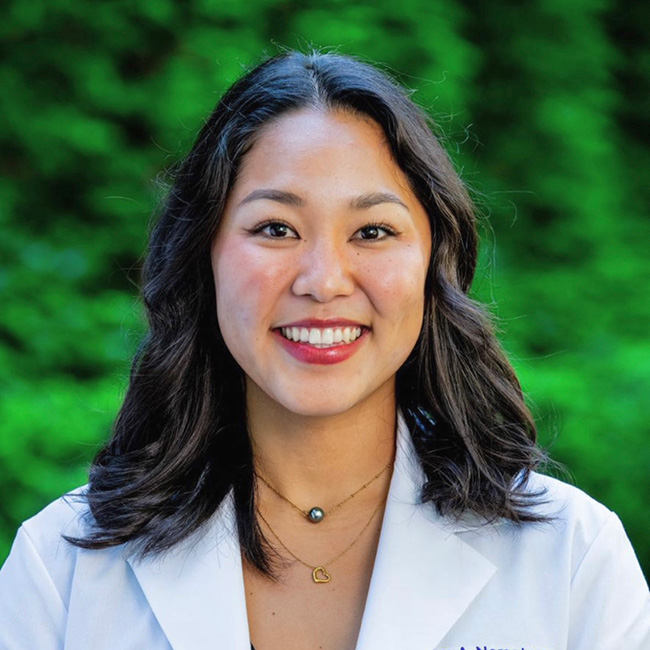

Lisa Namatame (she/her)
Alumni, Class of 2025
BA Public Health
University of Hawaiʻi at Mānoa
Physician Practice Associate (Pediatrics), Home Health Nurse Aide
Home State: Hawaiʻi
Tell us about your experience in PBL.
PBL has been great! It has been challenging, yet rewarding to be able to work through a patient case every week with my group. PBL makes you think like a practicing clinician and also teaches you how to provide quality care to patients and develop a unique plan based on their needs, past, and social history. It is amazing to be able to go from a chief complaint to asking relevant questions in order to make a plan to examine the patient appropriately and finally using this information to order the proper labs and imaging tests needed. I also appreciate that everyone is able to bring their unique knowledge to the table in order to help the group develop a diagnosis and treatment plan.
Why NUPA?
I chose Northwestern because the program had a family feel to it and I knew I would get the support I needed to go through a rigorous curriculum. Additionally, the mission statement was shown in multiple ways within the curriculum such as providing first year PA students with the opportunity to see patients with other healthcare professional students through Education Centered Medical Home (ECMH) which will allow my class and I to start training to work as members within an interdisciplinary team. There were many other factors that lead me to choosing NUPA such as having Problem-Based Learning (PBL), small class sizes, organ system-based curriculum, medical Spanish being offered in the first year, having a variety of clinical sites and more!
How has your experience been relocating to Chicago?
Moving to Chicago has been so fun! I love that there are so many places that are within walking distance such as study spots, places to eat, activities to do, and cool events that I can attend every weekend. It’s definitely different from home so I am experiencing so many new things and I am very excited to go through the various seasons here.
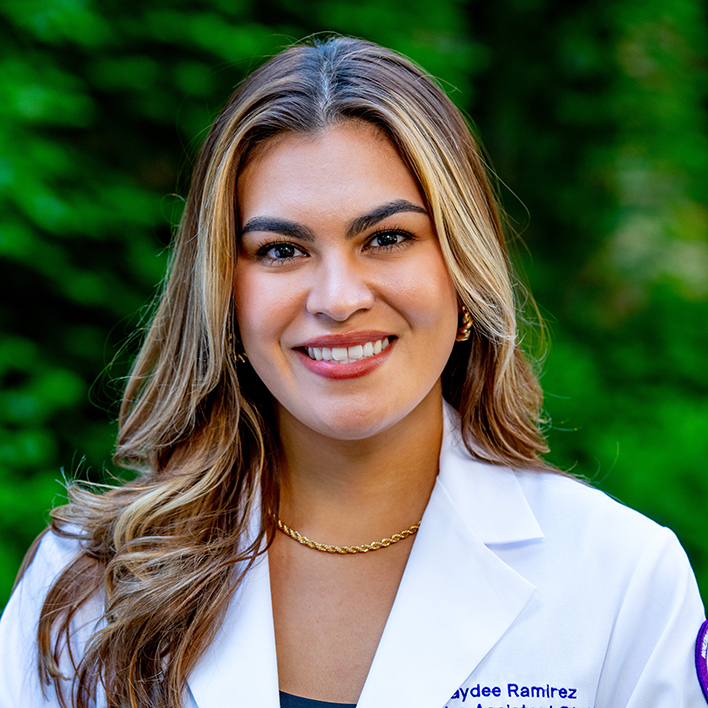

Haydee Ramirez (she/her)
Alumni, Class of 2024
BS Kinesiology
University of Illinois at Chicago
Clinical Research Coordinator, Rehabilitation Aide
Home State: Illinois
What attracted you to the Northwestern PA Program?
Honestly, many things caught my attention about the Northwestern PA Program. First, the program’s affiliation with a nationally ranked academic medical center and four elective rotations will benefit me during clinical year, giving me exposure to more specialties and allowing me to learn from the best providers. Second, the program’s Problem-Based Learning (PBL) curriculum. As an active learner, I knew this type of curriculum would help me think more critically while learning. Third, the family feel I got from the faculty, staff, and students during the info session and interview day made me realize it was an atmosphere in which I knew I would get the support I needed to push through the rigors of PA school. The small class size helps make that happen. Lastly, I loved that the program has Medical Spanish in their curriculum. As a Spanish-speaking Hispanic, I feel it is important to increase the number of Spanish-speaking providers in order to bridge the language barrier gap in my community. Northwestern shares that same value.
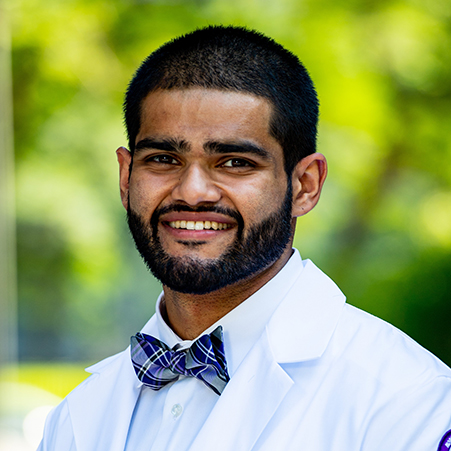

Vik Shenoy
Alumni, Class of 2022
BS Anthropology/Religious Studies
Bucknell University (PA)
Emergency Medical Technician, Clinical Research Coordinator
Home State: Pennsylvania
Prior to enrolling, what helped you feel prepared for PA school?
Some of the best advice I received from PAs was to take time and enjoy myself before starting school. PA school is an exciting and challenging two years, and it is important to do things that you love and want to check off your list before starting school, because you may not have time to do them. You'll learn everything you need to know in school. Another thing that was very helpful was reaching out to current PA students and practicing PAs to get an idea of what to expect and get any tips they might have about school, rotations and life as a PA.
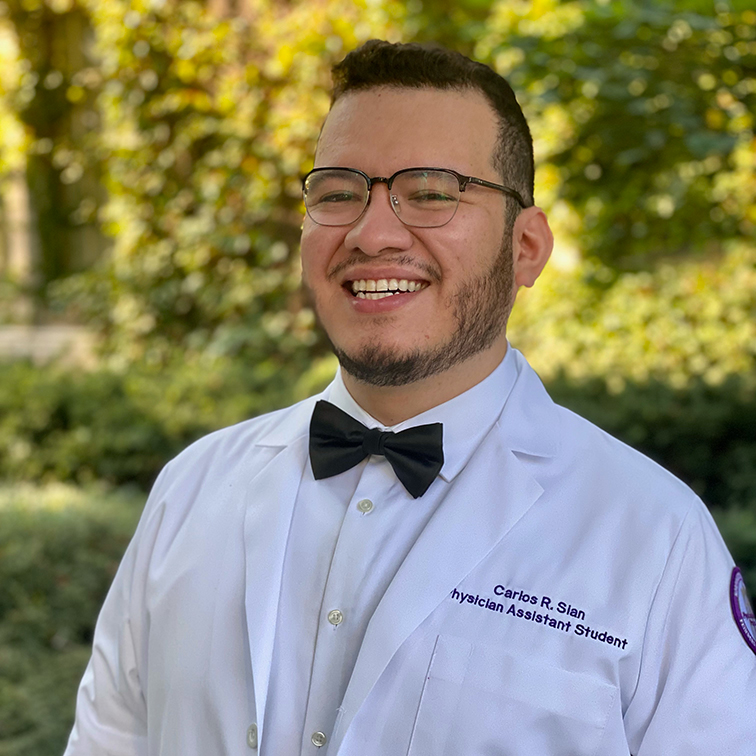

Carlos Sian (he/him)
Alumni, Class of 2023
MPH Community Health, Boston University
BS Biology, St. Michael’s College (VT)
Linkage to Care Coordinator, Clinical Research Assistant
Home State: Massachusetts
What are your impressions of the curriculum?
The curriculum at Northwestern University's PA program stands out through its use of the Problem-Based Learning (PBL) model. Unlike many programs, the clinical experience starts during our didactic year. As PA students, through the Northwestern Feinberg School of Medicine’s Education Centered Medical Home (ECMH) program, we work with medical students in clinical settings across Chicago once a month. We gather pertinent patient history, perform physical exams, present it to the medical team, and develop a treatment plan for patients with the help and approval of our overseeing preceptors. Having this early exposure in a clinical setting gives us an advantage during the start of clinical rotations since we have an idea of what to expect and how to start conversations with patients. In addition, going to ECMH provides a break from the studying routine of the didactic year. It serves as a reminder of, and motivator for, the professional life that awaits us post-graduation!
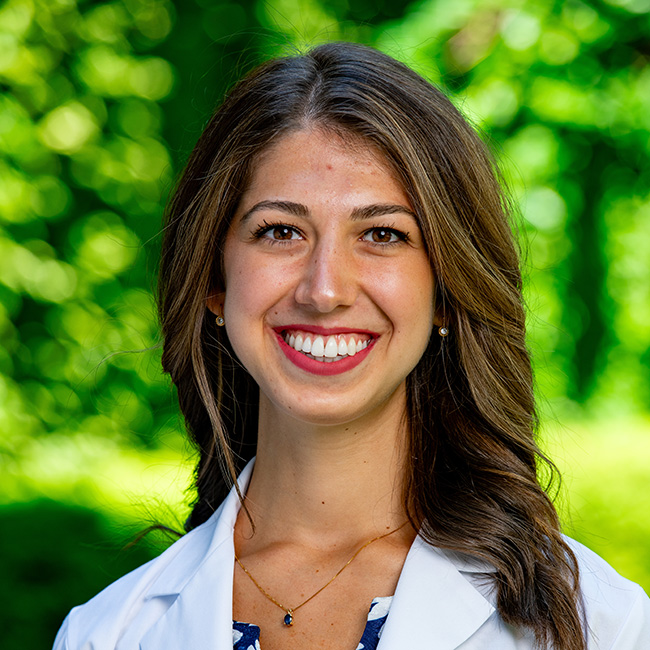

Anna Staltari (she/her)
Alumni, Class of 2025
BS Kinesiology
Purdue University – West Lafayette
Medical Assistant (Cardiology), Emergency Department Technician
Home State: Indiana
What is your favorite thing about NUPA?
First and foremost, the faculty, as they are truly an incredible group of mentors who are genuine, patient, and want to see us succeed. They bring passion and humility to their roles as our educators and fully embody the qualities that define what it means to be a phenomenal PA. In addition to the lectures taught by our great faculty, we have frequent and special opportunities to learn from guest lecturers who are experts in their fields. I am always impressed by the way these professionals make difficult concepts approachable and applicable to the clinical setting. Another favorite aspect of NUPA is our small class size. It has been so easy to get to know each of my classmates and quickly establish a close circle of 35 friends in the setting of a huge city. Speaking of the city, I love NUPA’s location. Being surrounded by the Northwestern Medicine campus while in the heart of downtown Chicago, I am continuously excited by all that is happening around me. I can’t think of a better place to live and explore while working towards my professional career!
What is an average day like for you?
Since I live in Streeterville, I have a quick and easy commute on foot to class each morning. On breaks between classes, I like to go for a walk around the Northwestern Medicine campus and on sunny days, I’ll try to eat lunch at one of the many benches that surround the school. If we finish class early, I’ll go for a run along the lakefront trail or take a walk along the Chicago River because the architecture is stunning! On the weeknights when I’m not working out or cooking dinner, I’m usually researching topics that pertain to our weekly PBL case and reviewing the week’s lecture content. The days can be long, but the weeks tend to fly by and on Fridays, I always take the night off to get together with friends from class for happy hour or to check out local live music bars.
Why NUPA?
The problem-based learning (PBL) curriculum was one of the principal reasons why I chose NUPA. After just two months, the tremendous amount that I have learned and grown in my ability to reason has reinforced how impactful the PBL curriculum is. The steps of working through a broad list of differential diagnoses, leading a thoughtful history and physical exam, and understanding how to form evidence-based treatment plans for complex patients is arguably the best approach to learning medicine. It is because of PBL that I am comfortable with being a novice yet have confidence in my abilities to think critically and bring a comprehensive approach to patient care. Aside from PBL, the opportunities to engage with patients in ECMH clinics throughout both years of the program was a huge distinguishing factor of the NUPA program. ECMH is the perfect way to become accustomed to the collaborative and interprofessional role that I’ll have as a PA, and I am very excited for the opportunity to apply my knowledge and practice the skills we have been learning in a true patient care setting.
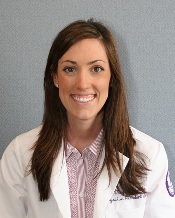

Megan Tamble
Alumni, Class of 2012
BS, Child Psychology
University of Minnesota
Why did you select the Northwestern University PA Program?
The Problem-Based Learning (PBL) style was a major factor for me, in addition to the hospital connection with Northwestern Memorial Hospital.
What aspect of the Northwestern University PA Program best prepared you for your current position?
Ability to adapt to new situations and learn new information (preparing learning issues from PBL class). The ability to read through information and pull relevant portions to create a concise summary is an important skill to have. There will always be new information, and it will help you to create your own “learning issues” and share the information with other colleagues and residents. It helps move your knowledge base further than you will achieve with passive learning.
How did you find your first job out of PA School?
Networking, networking, networking. Know your interest (but don’t commit too soon to interest; keep your options open), always be “on,” everyone you meet on rotation is a potential colleague. Treat them as such.
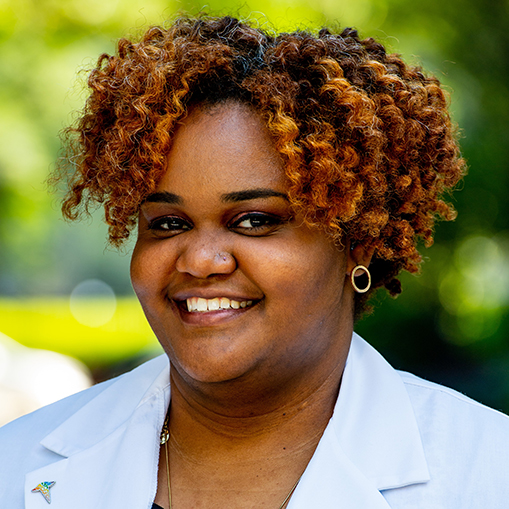

Reanna Williams
Alumni, Class of 2022
BA Psychology, Northwestern University
BS Nursing, Marian University
Registered Nurse
Home State: Indiana
Compared to your impressions before starting PA school, what surprised you about the Northwestern University PA Program?
What surprised me most after enrolling in the program was finding out how compassionate and empathetic the staff and faculty are. When you're interviewing, nearly all programs say that their staff and faculty care and is there to help you with anything, but the PA Program here actively puts that into practice. My class entered the program at a very unusual and difficult time during the pandemic. Staff and faculty were great at listening to our concerns and struggles and implementing changes when they could. I also entered the program with the understanding that PA school was difficult, but I was delighted to discover that the organ-based system of study provides an efficient way for the concepts from different classes to blend and complement each other well.
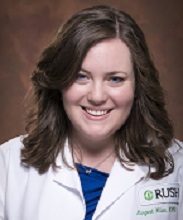

Margaret Wilson
Alumni, Class of 2012
BS, Biopsychology
University of Michigan
EKG Technician
Why did you select the Northwestern University PA Program?
The Problem-Based Learning (PBL) aspect of the curriculum.
What aspect of the Northwestern University PA Program best prepared you for your current position?
PBL: Learning and practicing the process of how to approach topics in medicine rather than just learning information. You’re never going to be able to memorize everything, so PBL teaches you to be comfortable taking any clinical topic or question and knowing how to approach finding the answer and applying it to your patient.
How did you find your first job out of PA school?
Web postings on hospital websites.
What advice or thoughts would you share with an applicant regarding work or involvement in the PA profession after PA school?
Become a member of your state, national and specialty organizations. They are the only ones advocating for you, and they are a great resource when you have questions.
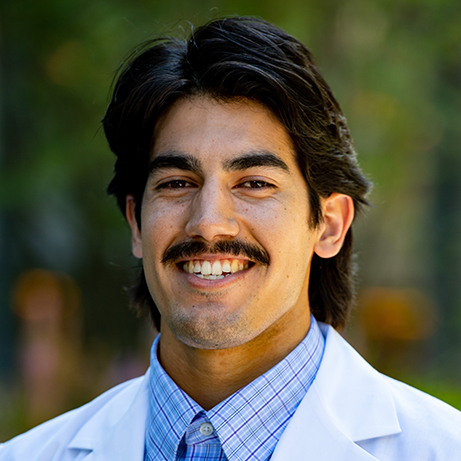

Brice Winans
Alumni, Class of 2022
BS Biology
Denison University (OH)
Medical Assistant (Internal Medicine)
Home State: California
How did PBL prepare you for success during your clinical year and now in professional practice?
At Northwestern, we enjoy a quick development from student to provider, and PBL encourages this efficient transition in unique ways. To start, many lessons are better taught in group discussion than in lecture. In PBL, we dissect these lessons by challenging ideas and sharing experiences in a small group setting. Another advantage to PBL is that, in simulated patient encounters, there is the option to take a time out and research the best way to approach a complex patient. This prepared me for clinical success by giving me a glimpse into a variety of patient populations and their unique challenges. Most patients I have seen relate in some way to a PBL case, so I have a head start in identifying their needs and creating a management plan.
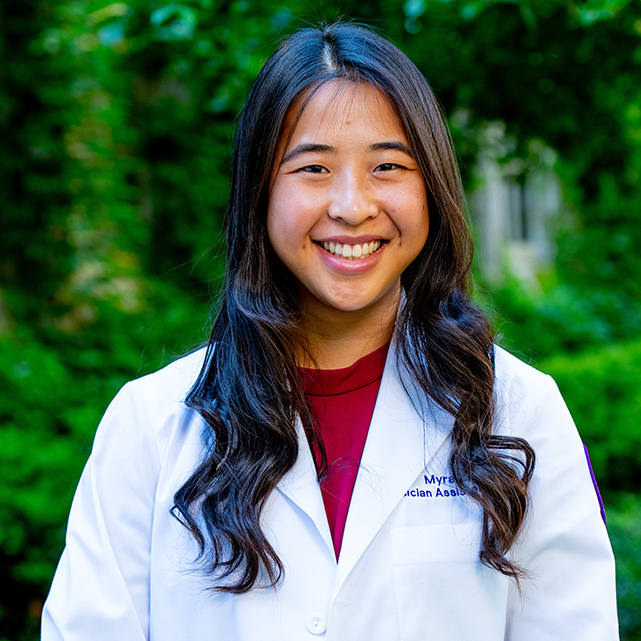

Myra Zhan (she/her)
Alumni, Class of 2024
BS Psychobiology
University of California – Los Angeles
Medical Assistant (Dermatology)
Home State: California
What advice would you share with an applicant considering Northwestern?
I would encourage you to seriously consider Northwestern University’s PA program. The program has an incredible array of resources and opportunities to prepare you to become a great PA. The organ system-based curriculum and the Problem-Based Learning approach are organized in a way such that your knowledge builds upon the previous system, and everything just starts to come together. All our faculty and guest lecturers are extremely knowledgeable because they are experts in their field, so we learn from the best of the best. Besides academics, we also get opportunities to expand our PA network. Not only do we get paired with a “big sibling” from the cohort above us, but we also get the chance to be paired with a practicing Northwestern Medicine PA mentor so that we can receive guidance from all stages of this PA journey. As a cherry on top, Chicago is a beautiful city and our campus is located in a prime location in the heart of Chicago.
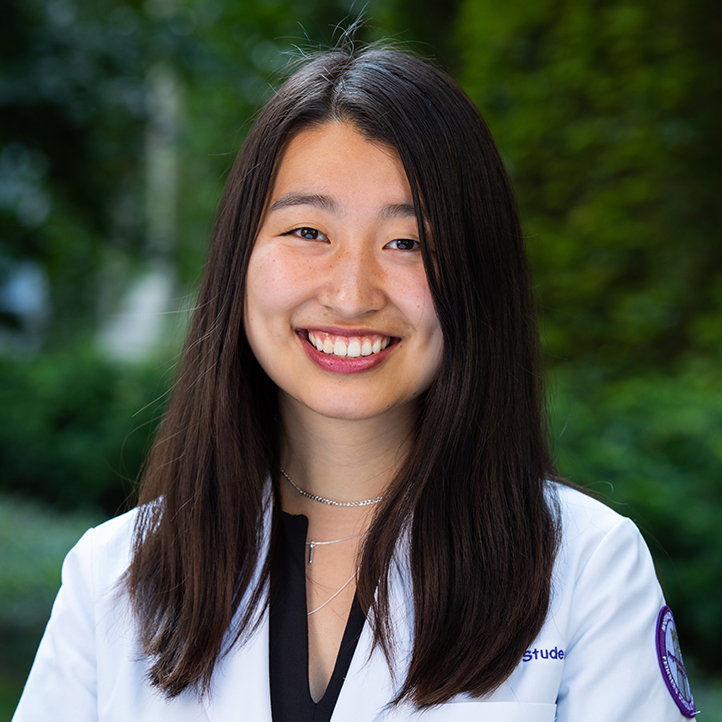

Irene Zhu (she/her)
Alumni, Class of 2023
BS Psychology
University of North Carolina - Chapel Hill
Mental Health Technician, Certified Nursing Assistant
Home State: Ohio
How did your first-year experience prepare you for clinical rotations?
Didactic year threw a whirlwind of information at us—at times, it was difficult to digest and integrate everything into an overarching clinical picture. However, we had opportunities such as weekly Problem-Based Learning (PBL) cases to develop our clinical reasoning, monthly Education Centered Medical Home (ECMH) clinical experiences to try our hand at taking histories and examining real patients, and occasional patient encounter workshops that allowed us to practice skills such as “delivering bad news” in a safe space. These additions to the curriculum made the transition from classroom learning to clinical learning more fluid.
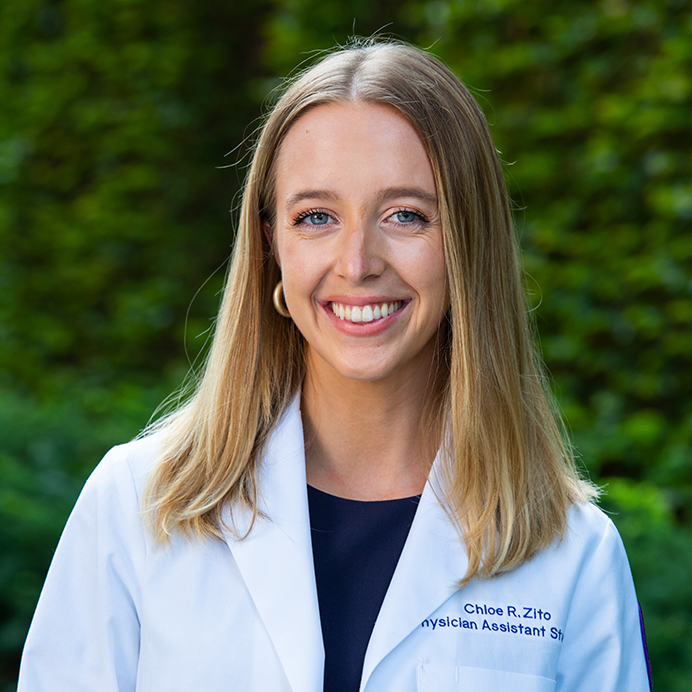

Chloe Zito (she/her)
Alumni, Class of 2023
BS Kinesiology/BA Dance
Chapman University (CA)
Medical Assistant (Orthopedics), Physical Therapy Aide
Home State: California
How has PBL prepared you for success during clinical year?
Problem-Based Learning (PBL) was easily my favorite part of the first year of PA School. Very few PA programs in the country offer it, but I can't imagine learning as effectively any other way. With PBL, we are presented with a new patient case at the beginning of each week. The method for working through the case mirrors how patients are approached during clinical year. For each case assigned during the first year, we worked through all the different possible diagnoses that might present similarly, ordered labs and imaging tests, and arrived at treatment plans. This translated directly into how I approach my patient cases this year. During my clinical year, I have felt the direct impact of this, because I feel like we have learned how to critically think of ways different diseases can present similarly from the beginning our PA education. Initially, it may seem like a daunting way to learn, and it is a lot of work, but I can’t recommend it enough.